LAW & ECONOMICS
ANNUAL REPORT 2022–23
A Joint Research Center of University of Pennsylvania Carey Law School, the Wharton School, and the Department of Economics in the School of Arts & Sciences at the University of Pennsylvania

INSTITUTE FOR
Message from the Co-Chairs: 1
Board of Advisors: 2
Message from the Dean: 6
Message from the Co-Directors: 7
Roundtable Programs: 9

Corporate Roundtable, Spring 2023: 10
Corporate Roundtable, Fall 2022: 12
Corporate Roundtable, Spring 2022: 14
Corporate Roundtable, Fall 2021: 14
Corporate Roundtable, Spring 2021: 16
Corporate Roundtable, Fall 2020: 16
Panel Programs: 19
The Twitter Takeover Tale: 20
The FTX Fiasco: Unpacking the Most Complex Bankruptcy in History: 22
Conference on Racial Equity in Corporate Governance: 24
Delaware Business Entity Legislative Process: 26
Lectures: 29
Distinguished Jurist Lecture: 30
Past Lectures: 32
Insights from Practice Lecture: 34
Academic Events: 37
Penn/NYU Conference: 38
ILE Wharton Finance Seminars: 40
Junior Faculty Workshop: 42
Curricular Partnerships: 44
Lunch and Learn Series: 46
Delaware Oral History Project: 49
Women in Business Law Initiative: 51
Insights on Career Achievement in Business and Law: 52
Gender and the Social Structure of Exclusion in U.S. Corporate Law: 52
Associate Faculty: 55
Publications and Papers: 64
Institute Contributors: 68
In Memoriam: 71
With the Coronavirus pandemic largely behind us, ILE has been able to return primarily to in-person programming, with all the concomitant bene ts of informal interaction among leaders in business, law, nance, and academic scholarship. With their focus on issues of relevance to the academic, legal, and business communities, ILE’s programs enjoy an outstanding international reputation for excellence enabling crossdisciplinary dialogue at the intersection of theory and practice on a host of matters. e Institute also continues to develop and promote its Women in Business Law Initiative, an important component of ILE’s mission that has been targeting the support and promotion of women to enhance diversity in business and business law.
On behalf of the Institute’s Board of Advisors, we want to express our gratitude to everyone who has contributed to the achievements of the Institute during this past year. In particular, we would like to thank those members of the Board and their colleagues from their rms who have participated in ILE’s programs and have been a vital part of their success.
We are pleased to welcome Kristopher Knight, Chief Deputy Secretary of State of Delaware, and Jean Park, of Cooley LLP, as new members of our Board of Advisors this year. Both accomplished individuals, Kris and Jean will greatly enhance the work of the Institute. We also note that Board member Ian Nussbaum is now partner at Latham & Watkins LLP. Finally, David Silk is stepping down as Co-Chair of the Board, and we acknowledge our appreciation of his valuable service. David will be succeeded as Co-Chair by Mark Greene, and we welcome Mark to his new position.
All of the members of our Board give graciously to the Institute, not just nancially but also of their time and expertise, and we are grateful for their contributions. Very special thanks must also be given to ILE benefactor and former Board Chair Bob Friedman. His extraordinary level of nancial support enables the Institute to continue to lead the eld, and we want to express our continuing appreciation to him.
Jill Fisch, Elizabeth Pollman, and Lisa Fairfax continue to be truly outstanding leaders of the Institute. e dedication of our Faculty Co-Directors to all aspects of the Institute’s work, and their ability to originate timely programming and attract ideal participants, are the reasons for the continued success of the Institute’s programs. ILE’s leadership is fundamental to its continued success as a forum for substantive discussions of topical issues relevant to corporations and their legal and nancial advisors, as well as jurists and academics. We also want to acknowledge the exceptional contributions of Larry Hamermesh, our Executive Director. We wish him all the best on his retirement. We are very pleased that Norman Powell has assumed the position of Executive Director as of July 1st, and we look forward to having the bene t of his formidable credentials and abilities as Larry’s successor.
DAVID M. SILK L'88
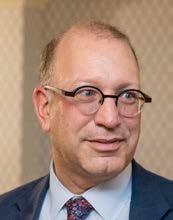
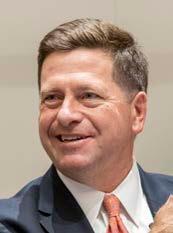
Wachtell, Lipton, Rosen & Katz
JAY CLAYTON L'93
Sullivan & Cromwell LLP
June 2023
MESSAGE FROM THE CO-CHAIRS
e Institute for Law & Economics continues to make signi cant contributions to scholarship, policy, and practice on important issues that a ect our country’s businesses and nancial institutions.
MESSAGE FROM THE CO-CHAIRS 1
BOARD OF ADVISORS

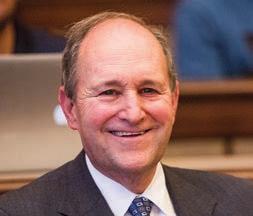
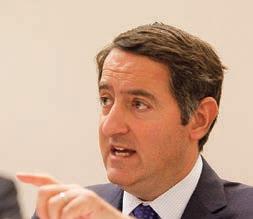

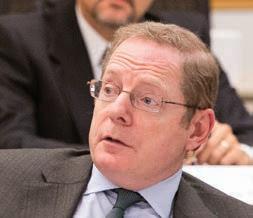



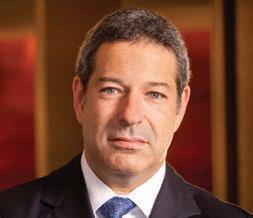
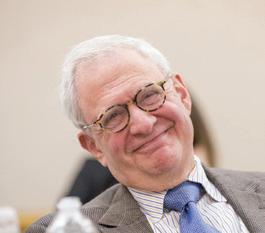
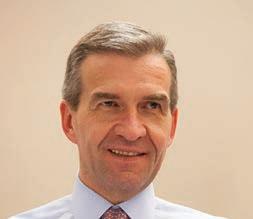
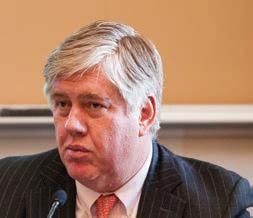

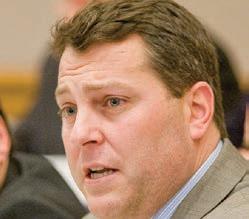
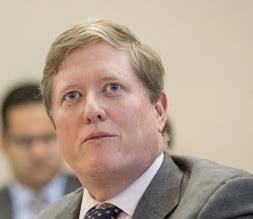
 Richard B. Aldridge Morgan, Lewis & Bockius LLP Philadelphia, PA
Marshall B. Babson Seyfarth Shaw LLP New York, NY
William D. Anderson, Jr. Senior Managing Director Evercore New York, NY
Martin J. Bienenstock Proskauer Rose LLP New York, NY
Daniel H. Burch Chairman & CEO MacKenzie Partners, Inc. New York, NY
Charles I. Cogut Co-Chair, 2008–2019 Former Partner Simpson Thacher & Bartlett LLP New York, NY
George A. Casey Shearman & Sterling LLP New York, NY
Steven M. Cohen Founding Member Blue Raven LLP New York, NY
Brian Fahrney Sidley Austin LLP Chicago, IL
John DiTomo Morris, Nichols, Arsht & Tunnell LLP Wilmington, DE
Raymond J. DiCamillo Richards, Layton & Finger, P.A. Wilmington, DE
John G. Finley Senior Managing Director and Chief Legal Officer The Blackstone Group L.P. New York, NY
Joel E. Friedlander Friedlander & Gorris, P.A. Wilmington, DE
Eric J. Friedman Executive Partner Skadden, Arps, Slate, Meagher & Flom LLP New York, NY
Robert L. Friedman Chair, 2001–2007 Senior Advisor The Blackstone Group L.P. New York, NY
Richard B. Aldridge Morgan, Lewis & Bockius LLP Philadelphia, PA
Marshall B. Babson Seyfarth Shaw LLP New York, NY
William D. Anderson, Jr. Senior Managing Director Evercore New York, NY
Martin J. Bienenstock Proskauer Rose LLP New York, NY
Daniel H. Burch Chairman & CEO MacKenzie Partners, Inc. New York, NY
Charles I. Cogut Co-Chair, 2008–2019 Former Partner Simpson Thacher & Bartlett LLP New York, NY
George A. Casey Shearman & Sterling LLP New York, NY
Steven M. Cohen Founding Member Blue Raven LLP New York, NY
Brian Fahrney Sidley Austin LLP Chicago, IL
John DiTomo Morris, Nichols, Arsht & Tunnell LLP Wilmington, DE
Raymond J. DiCamillo Richards, Layton & Finger, P.A. Wilmington, DE
John G. Finley Senior Managing Director and Chief Legal Officer The Blackstone Group L.P. New York, NY
Joel E. Friedlander Friedlander & Gorris, P.A. Wilmington, DE
Eric J. Friedman Executive Partner Skadden, Arps, Slate, Meagher & Flom LLP New York, NY
Robert L. Friedman Chair, 2001–2007 Senior Advisor The Blackstone Group L.P. New York, NY
2 INSTITUTE FOR LAW & ECONOMICS
Joseph B. Frumkin Co-Chair, 2008–2022 Sullivan & Cromwell LLP New York, NY
BOARD OF ADVISORS


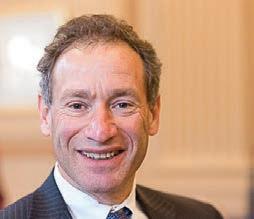

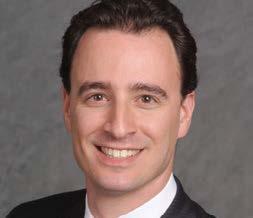
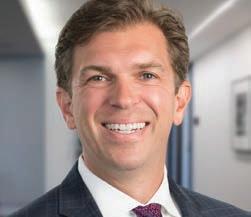
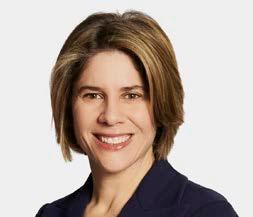
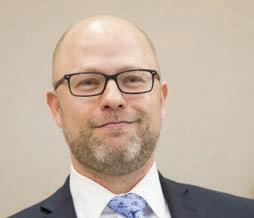
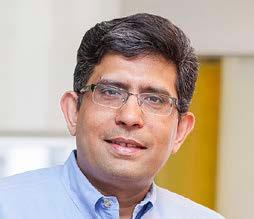
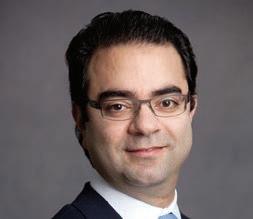
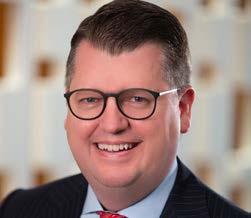
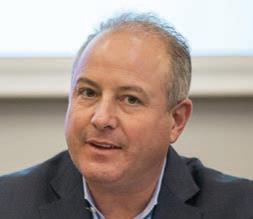
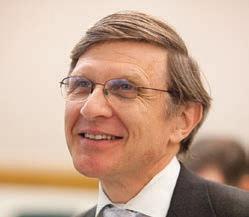


 Daniel M. Gallagher Chief Legal Officer Robinhood Washington, D.C.
Eduardo Gallardo Paul Hastings LLP New York, NY
Joseph D. Gatto Founder and Managing Partner Orient Point Partners New York, NY
Perry Golkin Chief Executive Officer PPC Enterprises LLC New York, NY
Mark I. Greene Cravath, Swaine & Moore LLP New York, NY
Erik T. Hoover Senior Vice President and General Counsel DuPont de Nemours, Inc. Wilmington, DE
Sarkis Jebejian Kirkland & Ellis LLP New York, NY
Gaurav Jetley Managing Principal Analysis Group New York, NY
Roy J. Katzovicz Chairman Saddle Point Group, LLC New York, NY
Meredith Kotler Freshfields Bruckhaus Deringer US LLP New York, NY
Mark Lebovitch Bernstein Litowitz Berger & Grossmann LLP New York, NY
Daniel Lee Managing Director Moelis & Company Los Angeles, CA
Kenneth A. Lefkowitz Hughes Hubbard & Reed LLP New York, NY
Martin S. Lessner Young Conaway Stargatt & Taylor, LLP Wilmington, DE
Kristopher Knight Chief Deputy Secretary of State Delaware Department of State Wilmington, DE
Daniel M. Gallagher Chief Legal Officer Robinhood Washington, D.C.
Eduardo Gallardo Paul Hastings LLP New York, NY
Joseph D. Gatto Founder and Managing Partner Orient Point Partners New York, NY
Perry Golkin Chief Executive Officer PPC Enterprises LLC New York, NY
Mark I. Greene Cravath, Swaine & Moore LLP New York, NY
Erik T. Hoover Senior Vice President and General Counsel DuPont de Nemours, Inc. Wilmington, DE
Sarkis Jebejian Kirkland & Ellis LLP New York, NY
Gaurav Jetley Managing Principal Analysis Group New York, NY
Roy J. Katzovicz Chairman Saddle Point Group, LLC New York, NY
Meredith Kotler Freshfields Bruckhaus Deringer US LLP New York, NY
Mark Lebovitch Bernstein Litowitz Berger & Grossmann LLP New York, NY
Daniel Lee Managing Director Moelis & Company Los Angeles, CA
Kenneth A. Lefkowitz Hughes Hubbard & Reed LLP New York, NY
Martin S. Lessner Young Conaway Stargatt & Taylor, LLP Wilmington, DE
Kristopher Knight Chief Deputy Secretary of State Delaware Department of State Wilmington, DE
BOARD OF ADVISORS 3
Ted S. Lodge Partner – Global Head Restructurings and Turnarounds GoldenTree Asset Management, LP New York, NY
BOARD OF ADVISORS
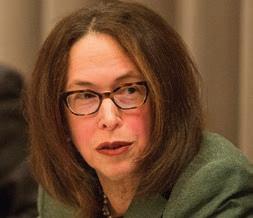




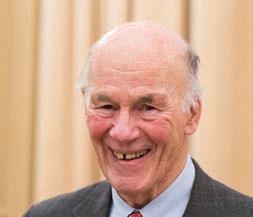

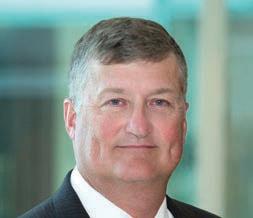
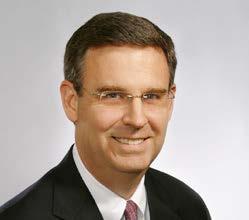
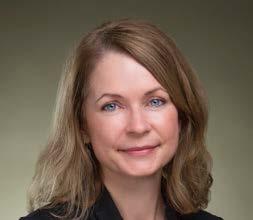


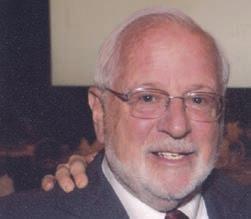
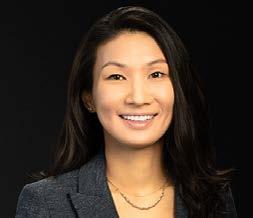
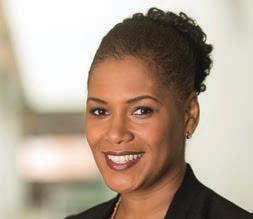
 Jeffrey J. Rosen Debevoise & Plimpton LLP New York, NY
Anne Robinson Managing Director, General Counsel and Corporate Secretary Vanguard Wayne, PA
Jean Park Cooley LLP New York, NY
Myron J. Resnick Retired Senior Vice President and Chief Investment Officer Allstate Insurance Company Northbrook, IL
Michael Reilly Executive Vice President, General Counsel and Secretary FMC Corporation Philadelphia, PA
Scott B. Luftglass Fried, Frank, Harris, Shriver + Jacobson LLP New York City, NY
Jennifer Marietta-Westberg Principal Cornerstone Research Washington, D.C.
William P. Mills Cadwalader, Wickersham & Taft LLP New York, NY
Mark A. Morton Potter Anderson & Corroon LLP Wilmington, DE
Jennifer Muller Managing Director Houlihan Lokey San Francisco, CA
Robert H. Mundheim Shearman & Sterling LLP New York, NY
Henry N. Nassau Dechert LLP Philadelphia, PA
Ian A. Nussbaum Latham & Watkins LLP New York, NY
James A. Ounsworth Managing Partner The S Consulting Group Philadelphia, PA
Morton A. Pierce White & Case LLP New York, NY
Jeffrey J. Rosen Debevoise & Plimpton LLP New York, NY
Anne Robinson Managing Director, General Counsel and Corporate Secretary Vanguard Wayne, PA
Jean Park Cooley LLP New York, NY
Myron J. Resnick Retired Senior Vice President and Chief Investment Officer Allstate Insurance Company Northbrook, IL
Michael Reilly Executive Vice President, General Counsel and Secretary FMC Corporation Philadelphia, PA
Scott B. Luftglass Fried, Frank, Harris, Shriver + Jacobson LLP New York City, NY
Jennifer Marietta-Westberg Principal Cornerstone Research Washington, D.C.
William P. Mills Cadwalader, Wickersham & Taft LLP New York, NY
Mark A. Morton Potter Anderson & Corroon LLP Wilmington, DE
Jennifer Muller Managing Director Houlihan Lokey San Francisco, CA
Robert H. Mundheim Shearman & Sterling LLP New York, NY
Henry N. Nassau Dechert LLP Philadelphia, PA
Ian A. Nussbaum Latham & Watkins LLP New York, NY
James A. Ounsworth Managing Partner The S Consulting Group Philadelphia, PA
Morton A. Pierce White & Case LLP New York, NY
4 INSTITUTE FOR LAW & ECONOMICS
Helen P. Pudlin Retired Executive Vice President and General Counsel PNC Financial Services Group Bryn Mawr, PA
BOARD OF ADVISORS


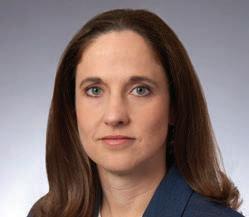
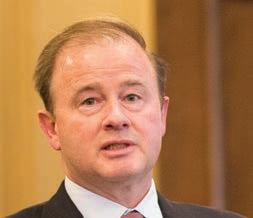

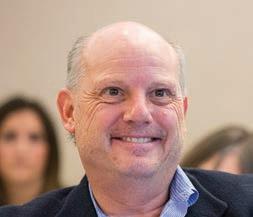
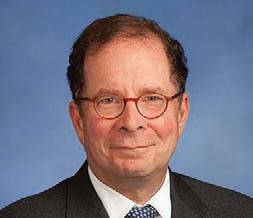
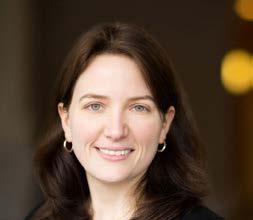

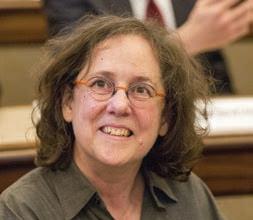 Jennifer Shotwell Founding Managing Director Innisfree M&A Incorporated New York, NY
Hon. Leo E. Strine, Jr. Chief Justice, Supreme Court of Delaware, 2014 -2019 Wachtell, Lipton, Rosen & Katz New York, NY
Peter L. Welsh Ropes & Gray LLP Boston, MA
Joseph A. Stern Managing Director; M&A Advisory General Counsel Goldman Sachs & Co. New York, NY
David M. Silk Co-Chair, 2019–2023 Wachtell, Lipton, Rosen & Katz New York, NY
John J. Suydam Chief Legal and Compliance Officer Apollo Global Management, LLC New York, NY
Jennifer Zachary Executive Vice President and General Counsel Merck & Co., Inc. Kenilworth, NJ
Amy L. Simmerman Wilson Sonsini Goodrich & Rosati Wilmington, DE
Hon. E. Norman Veasey Chief Justice, Supreme Court of Delaware, 1992-2004 Gordon, Fournaris & Mammarella, P.A. Wilmington, DE
Jennifer Shotwell Founding Managing Director Innisfree M&A Incorporated New York, NY
Hon. Leo E. Strine, Jr. Chief Justice, Supreme Court of Delaware, 2014 -2019 Wachtell, Lipton, Rosen & Katz New York, NY
Peter L. Welsh Ropes & Gray LLP Boston, MA
Joseph A. Stern Managing Director; M&A Advisory General Counsel Goldman Sachs & Co. New York, NY
David M. Silk Co-Chair, 2019–2023 Wachtell, Lipton, Rosen & Katz New York, NY
John J. Suydam Chief Legal and Compliance Officer Apollo Global Management, LLC New York, NY
Jennifer Zachary Executive Vice President and General Counsel Merck & Co., Inc. Kenilworth, NJ
Amy L. Simmerman Wilson Sonsini Goodrich & Rosati Wilmington, DE
Hon. E. Norman Veasey Chief Justice, Supreme Court of Delaware, 1992-2004 Gordon, Fournaris & Mammarella, P.A. Wilmington, DE
BOARD OF ADVISORS 5
Eric M. Swedenburg Simpson Thacher & Bartlett LLP New York, NY
ILE combines Penn’s greatest strengths in the Law School, e Wharton School, and the Department of Economics to focus on complex and timely questions in business law and practice. ILE proves that bringing a diverse group of experts together —judges, deal-makers, regulators, business leaders, lawyers, bankers, policymakers, investors, academics, and more—generates important and original insights.
In addition to its unique focus, another of the Institute’s strengths is the variety of programs it o ers. e roundtables—ILE’s signature events—bring together distinguished members of the bar, judiciary, government, business world, and academia for open discussion and intellectual exploration. ILE’s public lectures by leading jurists, executives, regulators, and entrepreneurs attract participants from all sectors of the University and from the wider community. During the past year, the outstanding talks, panels, and conferences organized by the Institute covered a wide range of topics, including the regulation of cryptocurrency markets, the Delaware business entity legislative process, the evolving roles of corporate directors, and the continuing conversation about racial equity in corporate governance.
We are proud of the generous support ILE receives from the many corporations, law rms, investment banks, and other contributors who understand the importance of what we do and the unique position the Institute holds. Many of the ILE contributors serve as members of the Institute’s Board of Advisors, helping to plan the direction and focus of the programs and lending their expertise as panelists and commentators for ILE events.
We owe a particular debt of gratitude to ILE’s extraordinary co-chairs, David Silk L’88 and Jay Clayton L’93, for their many exceptional contributions. Like all who serve as advisors for ILE, David and Jay have contributed their very valuable time and expertise. In addition to drawing on their numerous contacts in the legal and business communities. ILE has bene ted substantially from their leadership. We o er a special thank you to David for his exceptionally dedicated service, as he steps down as a co-chair. While his successor, Mark
Greene L’93, has big shoes to ll, we are con dent that Mark, together with Jay, will continue the great leadership.
I also thank the three eminent professors who have led the Institute for Law & Economics—Jill Fisch, Elizabeth Pollman, and Lisa Fairfax. It is because of their commitment that ILE ranks among the premier institutions of its kind. I expect the Institute to continue to grow and prosper under their direction, supported by the e orts of Norman Powell, who succeeds Larry Hamermesh as ILE’s Executive Director. Norm too has big shoes to ll, and both Penn and ILE have bene ted greatly from Larry’s many years of service as an institutional leader, convener, teacher, and scholar. I extend my deepest appreciation to Larry for his leadership and colleagueship over the years. As I conclude my eight years as Dean of the Law School and return to the Law School faculty, I am pleased to say that the Institute has been a key point of pride, and I turn over the reins to my successor Sophia Lee with con dence that the Institute will continue its record of professional and scholarly excellence.
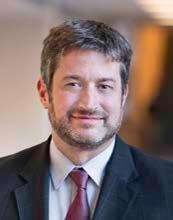
Finally, my message would be incomplete without acknowledging with both sadness and fondness the passing last fall of ILE’s founding director Professor Michael L. Wachter. Michael was a dear friend and colleague to all of us at Penn Carey Law. It was his vision that led to the formation of the Institute for Law & Economics, and ILE continues as a living legacy to his foresight, insight, and consummate skill at bridging interdisciplinary divides.
June 2023
MESSAGE FROM THE DEAN
For almost four decades, the Institute for Law & Economics has been a model for building bridges between disciplines and for creating ties among schools, faculty members, students, and experts in the eld.
THEODORE RUGER, Dean and Bernard G. Segal Professor of Law, University of Pennsylvania Carey Law School
6 INSTITUTE FOR LAW & ECONOMICS
MESSAGE FROM THE CO-DIRECTORS
The mission of the Institute for Law & Economics (ILE) is to provide a venue for high level conversations among practitioners, lawmakers, and academics about important and timely issues in corporate law and business. We are pleased to update how we served that mission in this wonderfully productive academic year.
ILE’s signature Corporate Roundtables continued our distinctive focus on bridging academia and practice. e fall and spring Corporate Roundtables each featured two academic papers and a panel discussion. One of the fall papers examined the history and content of the ESG concept, and the other explored the relationship between federal regulatory enforcement ndings and the potential liability of corporate directors for regulatory nes imposed on the corporation. e panel considered the evolving roles of corporate directors in the areas of diversity, equity, and inclusion; board and CEO succession; political challenges; and litigation (particularly derivative litigation based on Caremark). e rst spring paper examined empirically shareholder proposals seeking environmental and social disclosures and the implications of that demand for the SEC’s proposed climate disclosure rule. e second examined agency regulation by enforcement and evaluated its use relative to rulemaking. e panel discussed recent developments in shareholder voting, including voting choice by institutions, the recently adopted universal proxy rule, various amendments to the SEC’s shareholder proposal rule, and the continued challenges of proxy plumbing.
We pushed forward our work on multiple projects and initiatives. Prior to the fall Roundtable, ILE hosted its rst all-day junior faculty workshop. at workshop o ered presenters the opportunity to obtain feedback on work in progress from experienced scholars and practitioners. ILE continued its Women in Business Law Initiative with events including a panel discussion featuring Analysis Group CEO Martha Samuelson, the Honorable Loretta Preska, and Sullivan & Cromwell Litigation Group Managing Partner Sharon Nelles.
Commissioner Kristen Johnson of the Commodities Futures Trading Commission delivered our annual Distinguished Jurist Lecture. Commissioner Johnson’s presentation examined the promise and perils of distributed ledger technology for decentralized nance and explored approaches to a regulatory framework that would minimize the risks and adverse e ects of such technology.
Again this year, ILE collaborated with corporate law centers at Columbia Law School and Stanford Law School to host a virtual program on racial equity in corporate governance, focused on how companies can maintain their commitments to racial equity in a changing legal and political environment.
is year ILE initiated our lunch and learn series. e programs a ord students the opportunity to hear from experienced players in the eld of business law in an informal conversational setting. We hosted distinguished speakers Vice Chancellor Sam Glasscock III of the Delaware Court of Chancery and newly appointed Master in Chancery Bonnie W. David L’13, Kyle Wagner Compton L’04, WG’11 (editor of e Chancery Daily), Audrey Choi (formerly Morgan Stanley’s Chief Sustainability Advisor), and Lisette Duran (Senior ESG Associate, Paul, Weiss, Ri ind, Wharton & Garrison LLP).
We were pleased to hold the Penn/NYU Conference on Law and Finance in February – the rst time since the pandemic that this event has been convened. e program, which includes the presentation of eight academic papers with academic commentary, enables law scholars and practitioners to engage directly with nance experts and draws participants from around the world.
As always, ILE maintains su cient programming exibility to respond to hot topics. Upon the resolution of the Twitter litigation, we assembled a group of distinguished practitioners to provide an inside view of the challenging transaction.
We continue our e orts to o er programming in New York City and Delaware, in addition to our programs at the Law School. In the fall we hosted a session in Wilmington on the Delaware business entity legislative process, where we were joined by several members of the Council of the Corporation Law Section of the Delaware State Bar Association. We brought leading practitioners and Delaware judges together again in Wilmington to hear a presentation by Professors Afra Afsharipour (UC Davis) and Matt Jennejohn (Brigham Young University) about their new paper which empirically studies gender diversity among practitioners in Chancery Court litigation.
Finally, we were privileged to participate in a bittersweet occasion to gather in memory of ILE founder Professor Michael Wachter. A panel of his academic co-authors described Michael’s many scholarly contributions, and faculty, friends, and family members recounted their fond recollections of their experiences with Michael.
As in the past, our Institute’s greatest resource is the quality of our supporters and their active participation in our programs. Our board members and sponsors play a critical role in developing our programs as well as providing valuable nancial support. We continued to bene t from the generous involvement of our board chairs, David Silk of Wachtell Lipton Rosen & Katz and Jay Clayton of Sullivan & Cromwell LLP. We thank David for his outstanding service as he steps down as co-chair. David is an incredible leader, and his informed and gracious guidance will be missed. We welcome Penn Carey Law alum Mark Greene L’93 of Cravath Swaine & Moore LLP as Jay’s new co-chair and we look forward to bene ting from Mark’s leadership. We are also pleased to welcome two new board members this year: Kristopher Knight, Chief Deputy Secretary of State of Delaware, and Jean Park, of Cooley LLP, as well as our newest ILE member rm, Latham & Watkins LLP. And nally, we look forward to working with Norman M. Powell, of Young Conaway Stargatt & Taylor, LLP in Wilmington, Delaware, who succeeds Larry Hamermesh as Executive Director. Larry has been indispensable in navigating the many challenges of ILE’s programming, and we are excited to have Norm help lead ILE in the coming years.
We appreciate your contributions to the Institute’s continued success.
LISA M. FAIRFAX, Co-Director, Institute for Law & Economics; Presidential Professor of Law


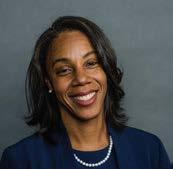
JILL E.
FISCH, Co-Director, Institute for
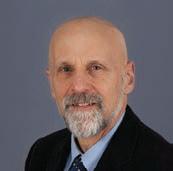
Law
Law
& Economics; Saul A. Fox Distinguished Professor of Business
ELIZABETH
POLLMAN, Co-Director, Institute for Law & Economics; Professor of Law
LAWRENCE A. HAMERMESH, Executive Director, Institute for Law & Economics
June 2023
MESSAGE FROM THE DIRECTORS 7

ROUNDTABLE PROGRAMS

At the heart of the Institute’s work is the roundtable series, which brings members of the Institute’s associate faculty and other academics together with corporate executives, practicing attorneys, judges, and public policymakers. Each roundtable takes up current issues that emerge from the research and teaching of the Institute and provides a forum for lively discussion.
Over the years, the Institute’s roundtables on corporate law, governance, and finance have engaged the interest and participation not only of scholars but also of leaders in the business and public sectors. The high caliber of the participants guarantees that each roundtable is intense and informative. ILE’s longstanding off-the-record policy for the roundtables is often the impetus for an energetic and wideranging exchange of ideas among some of the nation’s most accomplished scholars, attorneys, and business people.
ROUNDTABLE PROGRAMS 9
CORPORATE ROUNDTABLE
MAY 5, 2023
Welcome
Sophia Z. Lee, Dean-Elect and Professor of Law and History, University of Pennsylvania Carey Law School
Morning Session
Shareholder Proposals And The Debate Over Sustainability
Jill E. Fisch, Saul A. Fox Distinguished Professor of Business Law, University of Pennsylvania Carey Law School
commentators
Adam C. Pritchard, Frances and George Skestos Professor of Law, University of Michigan Law School
Jessica Wirth Strine, Managing Partner & CEO, Sustainable Governance Partners
Regulation By Enforcement
Christopher Brummer, Agnes Williams Sesquicentennial Professor of Financial Technology, Georgetown University Law Center
Yesha Yadav, Professor of Law, Vanderbilt University Law School
David Zaring, Elizabeth F. Putzel Professor of Legal Studies & Business Ethics, The Wharton School
commentators
Anita Bandy, Skadden Arps Slate Meagher & Flom LLP
Donna Nagy, Executive Associate Dean and C. Ben Dutton Professor of Business Law, Indiana University Maurer School of Law
Afternoon Session
Recent Developments In Shareholder Voting
moderators
Jill E. Fisch, Saul A. Fox Distinguished Professor of Business Law, University of Pennsylvania Carey Law School
Elizabeth Pollman, Professor of Law, University of Pennsylvania Carey Law School
panelists
Daniel Burch, Chairman/CEO/Co-Founder, MacKenzie Partners Inc. Carolyn Cross, Vanguard
Lisa Fairfax, Presidential Professor of Law, University of Pennsylvania Carey Law School
Renee Jones, Boston College Law School
Sabastian Niles, Wachtell, Lipton, Rosen & Katz
Melissa Sawyer, Sullivan & Cromwell LLP
Shareholder Proposals and the Debate over Sustainability Disclosure

Jill E. Fisch, Saul A. Fox Distinguished Professor of Business Law, University of Pennsylvania Carey Law School
Adriana Z. Robertson, Donald N. Pritzker Professor of Business Law, University of Chicago Law School
The authors address concerns that the SEC’s proposed climate disclosure rule is unnecessary because investors can obtain sufficient climate-related disclosure through private ordering. They empirically analyze one mechanism for private ordering – shareholder proposals requesting environmental and social disclosures during the 2021 and 2022 proxy seasons – and find, contrary to some assertions, that investors submitted hundreds of these proposals, many of which received substantial levels of investor support. They further note the significant number of proposals that are settled and withdrawn, indicating that the issuer committed to providing the requested disclosure. They conclude that there is substantial investor demand for greater sustainability disclosure, and that in modifying the mandatory disclosure regime, the SEC should look to shareholder proposals as a source of guidance and seek to complement these private ordering efforts.
Regulation by Enforcement
Christopher Brummer, Agnes Williams Sesquicentennial Professor of Financial Technology, Georgetown University Law Center
Yesha Yadav, Professor of Law, Vanderbilt University Law School
David Zaring, Elizabeth F. Putzel Professor of Legal Studies & Business Ethics, The Wharton School
The authors examine an increasingly common response by regulators to what they view as undesirable market trends or challenges: namely, use of litigation to introduce novel legal theories and frameworks that could have been the product or subject of legislative or administrative rulemaking. Some claim that such regulation by enforcement has been unfair, and in some instances, illegal.
In their article the authors revisit the New Deal origins of regulation by enforcement, and its more recent incarnations, and explain that as a legal matter, regulators generally enjoy discretion whether to make policy through rulemaking, adjudication, or by filing a lawsuit in federal court. There are some exceptions to this principle, however, as well as some reasons to believe that new doctrinal developments hostile to agency adjudications could reduce the discretion of agencies to choose their policymaking tool, especially where their actions are understood to be naked attempts to grab turf or circumvent democratic norms embedded in the Administrative Procedure Act. The authors analyze the incentives facing agencies when choosing to regulate by enforcement, consider some of the new risks, and lay out a framework for thinking about when agencies should regulate by rule, and when they should regulate by enforcement.
10 INSTITUTE FOR LAW & ECONOMICS
1 Front row: Melissa Sawyer, Sullivan & Cromwell LLP; Daniel Burch, MacKenzie Partners, Inc.; Second row: Jessica Strine, Sustainable Governance Partners; Adam Pritchard, University of Michigan Law School; Third row: Dan Iqbal, Wilson Sonsini Goodrich & Rosati LLP





2 Front row: William Mills, Cadwalader, Wickersham & Taft LLP; Hon. J. Travis Laster, Delaware Court of Chancery; Second row: Harwell Wells, Temple University Beasley School of Law; Adriana Robertson, University of Chicago Law School; Cathy Hwang, University of Virginia School of Law; Third row: Charles Elson, University of Delaware
3 Jill E. Fisch, University of Pennsylvania Carey Law School
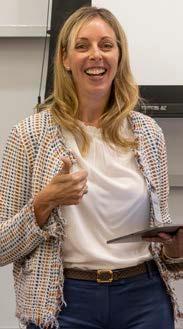
4 Jessica Strine, Sustainable Governance Partners
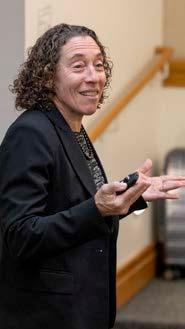

5 Christopher Brummer, Georgetown University Law Center
6 Hon. J. Travis Laster, Delaware Court of Chancery
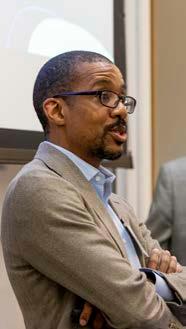
7 Front row: Jennifer Muller, Houlihan Lokey; Gaurav Jetley, Analysis Group; Martin S. Lessner, Young Conaway Stargatt & Taylor, LLP; Second row: Sophia Lee, University of Pennsylvania Carey Law School; Elizabeth Pollman, University of Pennsylvania Carey Law School; Lawrence Hamermesh, Institute for Law & Economics
8 Henry Hu, University of Texas Law School; Cynthia Williams, Indiana University Maurer School of Law; Robert Rasmussen, University of Southern California Gould School of Law

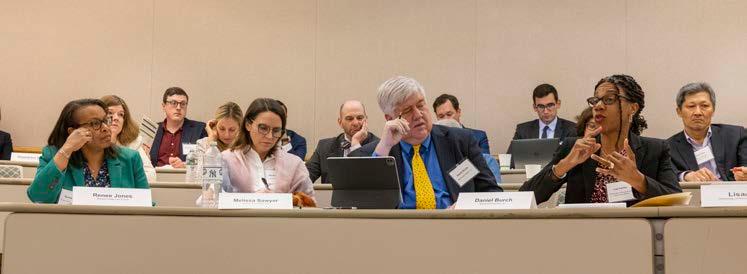

9 Front row: Anita Bandy, Skadden, Arps, Slate, Meagher & Flom LLP; Donna Nagy, Indiana University Maurer School of Law; Jessica Strine, Sustainable Governance Partners; Second row: Urska Velikonja, Georgetown University Law Center; Sarah Haan, Washington & Lee University School of Law; Elizabeth DeFontenay, Duke University School of Law; Demetrius Warrick, Skadden, Arps, Slate, Meagher & Flom LLP
10 Front row: Carolyn Cross, Vanguard; Sabastian Niles, Wachtell Lipton Rosen & Katz; Second row: Henry Hu, University of Texas School of Law; Third row: Jackie Cohen, Ropes & Gray LLP; Eric Feinstein, Wachtell Lipton Rosen & Katz; Jeffrey Schwartz, University of Utah S.J. Quinney College of Law
11 Front row: Renee Jones, Boston College Law School; Melissa Sawyer, Sullivan & Cromwell LLP; Daniel Burch, MacKenzie Partners, Inc.; Lisa Fairfax, University of Pennsylvania Carey Law School
3 4 7 9 11 6 2 8 10 1
5 ROUNDTABLE PROGRAMS 11
CORPORATE ROUNDTABLE
DECEMBER 9, 2022
Welcome
Theodore W. Ruger, Dean and Bernard G. Segal Professor of Law, University of Pennsylvania Carey Law School
Morning Session
The Making And Meaning Of ESG
Elizabeth Pollman, Professor of Law, University of Pennsylvania Carey Law School
commentators
Paul G. Mahoney, David and Mary Harrison Distinguished Professor of Law, University of Virginia School of Law
Carmen X. W. Lu, Wachtell, Lipton, Rosen & Katz
Federalizing Caremark
Carliss Chatman, Associate Professor of Law, Washington & Lee School of Law
Tammi S. Etheridge, Assistant Professor of Law, Elon University School of Law
commentators
Robert B. Thompson, Georgetown University Law Center
Mark Lebovitch, Bernstein Litowitz Berger & Grossman LLP
Afternoon Session
Evolving Roles And Responsibilities Of Corporate Directors
moderators
Jill E. Fisch, Saul A. Fox Distinguished Professor of Business Law, University of Pennsylvania Carey Law School
Lisa Fairfax, Presidential Professor of Law, University of Pennsylvania Carey Law School
panelists
Donna Anderson, Vice President and Head of Global Corporate Governance, T. Rowe Price
Douglas Chia, Sole Member and President, Soundboard Governance LLC
Holly Fetter, Vice President, Asset Stewardship Team, State Street Global Advisors
Duane L. Hughes, Managing Director and Chair of the UBS Americas Advisory Council, UBS Americas
Hillary Sale, Agnes Williams Sesquicentennial Professor of Leadership and Corporate Governance, Georgetown University Law Center
Honorable Lori W. Will, Vice Chancellor, Delaware Court of Chancery
The Making And Meaning Of ESG

Elizabeth Pollman, Professor of Law, University of Pennsylvania Carey Law School
After reviewing the history of the term ESG, the paper examines its main usages and argues that the combination of E, S, and G into one term has provided a highly flexible moniker that can vary widely by context, evolve over time, and collectively appeal to a broad range of investors and stakeholders. These features both help to account for its success, but also its challenges such as the difficulty of empirically showing a causal relationship between ESG and financial performance, a proliferation of ratings that can seem at odds with understood purposes of the term ESG or enable “sustainability arbitrage,” and tradeoffs between issues such as carbon emissions and labor interests that cannot be reconciled on their own terms. These challenges give fodder to critics who assert that ESG engenders confusion, unrealistic expectations, and greenwashing that could inhibit corporate accountability or crowd out other solutions to pressing environmental and social issues. These critiques ultimately shed light on obstacles for the future of the ESG movement and regulatory reform.
Federalizing Caremark
Carliss Chatman, Associate Professor of Law, Washington & Lee School of Law
Tammi S. Etheridge, Assistant Professor of Law, Elon University School of Law
The authors propose that Delaware can preempt corporate misbehavior, while reducing the need for more federal oversight, by relying on federal administrative fact-finding combined with the Caremark standard to promote shareholder successes in derivative litigation. Noting the benefits of relying on the expertise associated with industry-specific governance, they argue that Delaware should adopt a formal rule whereby plaintiffs can use existing, industry-specific federal compliance systems as a proxy for expertise, and any breaches thereof as an indicator of clear but rebuttable red flags.
12 INSTITUTE FOR LAW & ECONOMICS
1 Elizabeth Pollman, University of Pennsylvania Carey Law School

2 Carmen X. W. Lu, Wachtell Lipton Rosen & Katz


3 Front row: Holly Fetter, State Street Global Advisors; Hon. Lori Will, Delaware Court of Chancery; Second row: Urska Velikonja, Georgetown University Law Center; Donna Nagy, Indiana University Maurer School of Law; Mark Lebovitch, Bernstein Litowitz Berger & Grossman LLP; Third row: Geeyoung Min, Michigan State University College of Law; Jonathon Zytnick, Georgetown University Law Center
4 Front row: Hillary Sale, Georgetown University Law Center; David Silk, Wachtell Lipton Rosen & Katz; Second row: Michael Klausner; Stanford Law School; Henry Hu, University of Texas Law School; Tom Lin, Temple University Beasley School of Law; Cynthia Williams, Indiana University Maurer School of Law; Third row: Afra Afsharipour, UC Davis School of Law; Jessica Erickson, University of. Richmond School of Law; Sarah Haan, Washington & Lee University School of Law
5 Carliss Chatman, Washington & Lee University School of Law
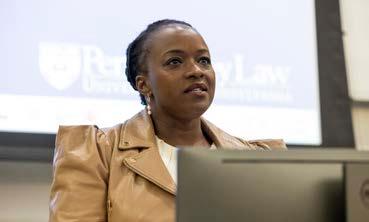
6 Robert Thompson, Georgetown University Law Center

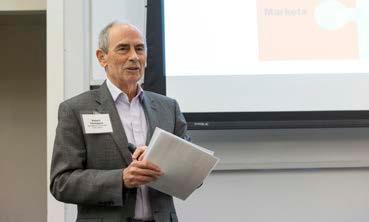
7 Front row: Roy Katzovicz, Saddle Point Management LP; Joseph Frumkin, Sullivan & Cromwell LLP; Elizabeth Pollman, University of Pennsylvania Carey Law School; Second row: Jennifer Muller, Houlihan Lokey; Martin S. Lessner, Young, Conaway, Stargatt & Taylor, LLP; Charlotte Newell, Sidley Austin LLP
8 Front row: Holly Fetter, State Street Global Advisors; Hon. Lori W. Will, Delaware Court of Chancery; Douglas Chia, SoundBoard Governance LLC; Second row: Elizabeth DeFontenay, Duke University School of Law; Urska Velikonja, Georgetown University Law Center; Donna Nagy, Indiana University Maurer School of Law; Third row: Geeyoung Min, Michigan State University College of Law; William Moon, University of Maryland Frances King Carey School of Law; Jonathon Zytnick, Georgetown University Law Center

9 Front row: Donna Anderson, T. Rowe Price; Hillary Sale, Georgetown University Law Center; Duane Hughes, UBS Americas; Second row: Jennifer Shotwell, Innisfree M&A Incorporated; Michael Klausner, Stanford Law School; Henry Hu, University of Texas Law School; Third row: Afra Afsharipour, UC Davis School of Law




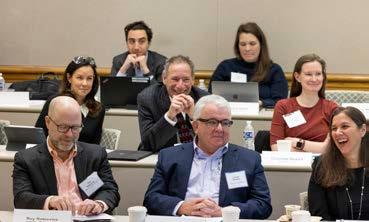
1 2 3 4 5 6 7 8 9 ROUNDTABLE PROGRAMS 13
CORPORATE ROUNDTABLE
MAY 6, 2022
Welcome
Jill E. Fisch, Saul A. Fox Distinguished Professor of Business Law, University of Pennsylvania Carey Law School
Morning Session
Retail Shareholder Participation in the Proxy Process: Monitoring, Engagement, and Voting
Alon Brav, Duke University – Fuqua School of Business
Matthew D. Cain, Berkeley Center for Law and Business
Jonathon Zytnick, Fellow, Institute for Corporate Governance and Finance, New York University School of Law
commentators
Adriana Robertson, Honourable Justice Frank Iacobucci Chair in Capital Markets Regulation and Associate Professor of Law and Finance, University of Toronto Faculty of Law
Gaurav Jetley, Managing Principal, Analysis Group
asset managers as regulators
Dorothy Lund, Associate Professor, USC Gould School of Law
DECEMBER 10, 2021
Welcome
Jill E. Fisch, Saul A. Fox Distinguished Professor of Business Law, University of Pennsylvania Carey Law School
Morning Session
Voluntary Esg Reporting And Accountability: A Proposal For Reform

Lisa Fairfax, Presidential Professor of Law, University of Pennsylvania Carey Law School
commentators
Robert J. Jackson, Jr., Pierrepont Family Professor of Law, New York University Law School
David M. Silk, Wachtell, Lipton, Rosen & Katz
Fiduciary Duties And Climate Change In The United States
Cynthia Williams, Senior Scholar and former inaugural Osler Chair in Business Law, Osgood Hall Law School
Sarah Barker, Head of Climate Risk Governance, MinterEllison
Alex Cooper, Lawyer, Commonwealth Climate and Law Initiative
commentators
Brett McDonnell, Professor of Law, University of Minnesota Law School
Mark Lebovitch, Bernstein Litowitz Berger & Grossman LLP
Martin S. Lessner, Young, Conaway, Stargatt & Taylor, LLP
commentators
Cathy Hwang, Barron F. Black Research Professor of Law, University of Virginia School of Law
John Galloway, Principal and Investment Stewardship Officer, Vanguard
Afternoon Session
Retail Shareholders and Voting
moderators
Lisa Fairfax, Presidential Professor of Law, University of Pennsylvania Carey Law School
Elizabeth Pollman, Professor of Law, University of Pennsylvania Carey Law School
panelists
Ray Cameron, Managing Director-Institutional Client Business, BlackRock
Jill E. Fisch, Saul A. Fox Distinguished Professor of Business Law, University of Pennsylvania Carey Law School
Daniel Gallagher, Chief Legal Officer, Robinhood
Keir Gumbs, Chief Legal Officer, Broadridge Financial Solutions, Inc.
Gabrielle E. Wolf, Director, Innisfree M&A Incorporated
Afternoon Session
State And Federal Developments On Esg
moderators
Jill E. Fisch, Saul A. Fox Distinguished Professor of Business Law, University of Pennsylvania Carey Law School
Elizabeth Pollman, Professor of Law, University of Pennsylvania Carey Law School
panelists
Marsha Dixon, Associate General Counsel, Nasdaq
Sarah C. Haan, Professor of Law, Washington and Lee University School of Law
Hon. Kathaleen St. J. McCormick, Chancellor, Delaware Court of Chancery
Lori Heinel, Executive Vice President, Global Chief Investment Officer, State Street Global Advisors
Keith F. Higgins, Ropes & Gray LLP
Luigi Zingales, Robert C. McCormack Professor of Entrepreneurship and Finance, University of Chicago Booth School of Business
14 INSTITUTE FOR LAW & ECONOMICS
1 First row: Jill Fisch, University of Pennsylvania Carey Law School; Daniel Gallagher, Robinhood; Keir Gumbs, Broadridge Financial Solutions, Inc.; Second row: Donna Nagy, Indiana University Maurer School of Law; Simone Sepe, University of Arizona James E. Rogers College of Law
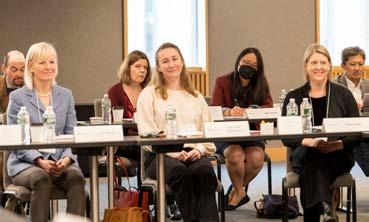
2 First row: Ray Cameron, BlackRock; Gabrielle Wolf, Innisfree M&A Incorporated; Second row: Sarah Haan, Washington & Lee University School of Law; Charles O’Kelley, Berle Center, Seattle University; Jeff Schwartz, University of Utah S.J. Quinney College of Law

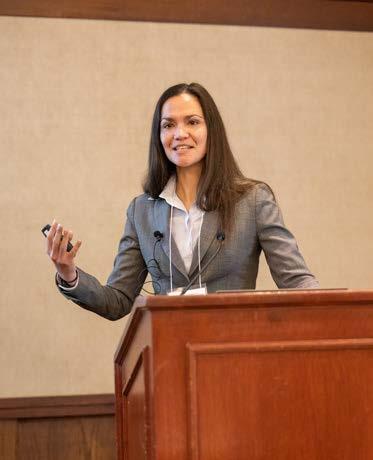

3 Glenn Booraem, Vanguard; Roy Katzovicz, Saddle Point Management, L.P
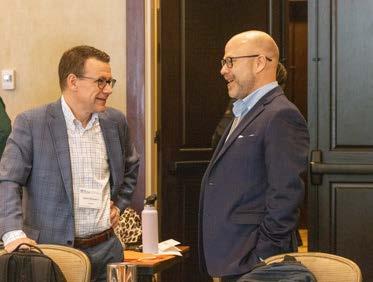
4 Cynthia Williams, Osgoode Hall Law School, York University

5 David Silk, Wachtell, Lipton, Rosen & Katz:
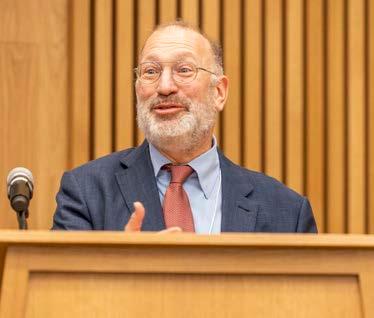

6 Adriana Robertson, University of Toronto Faculty of Law
7 Cathy Hwang, University of Virginia School of Law

8 First row: Keith Higgins, Ropes & Gray LLP; Hon. Lori Will, Delaware Court of Chancery; Second row: Omari Simmons, Wake Forest University School of Law
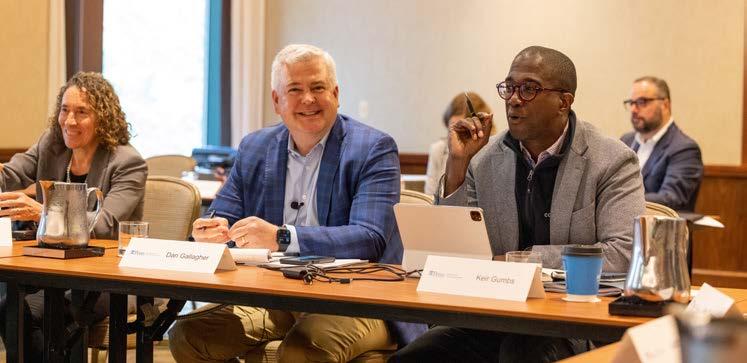
9 First row: Lori Heinel, State Street Global Advisors; Hon. Kathaleen McCormick, Delaware Court of Chancery; Sarah Haan, Washington & Lee University School of Law;
Second row: Adam Pritchard, University of Michigan Law School; Donna Nagy, Indiana University Maurer School of Law; Cathy Hwang, University of Virginia School of Law; Frederick Tung, Boston University School of Law
1 2 4 6 5 7 3 8 9 ROUNDTABLE PROGRAMS 15
CORPORATE ROUNDTABLE
MAY 7, 2021

Tech and M&A: New Developments, New Challenges
moderators
Jill E. Fisch, Saul A. Fox Distinguished Professor of Business Law, University of Pennsylvania Carey Law School
Elizabeth Pollman, Professor of Law, University of Pennsylvania Carey Law School
panelists
Luke Bergstrom, Latham & Watkins LLP
Herbert Hovenkamp, James G. Dinan University Professor, University of Pennsylvania Carey Law School
Jamie Leigh, Cooley LLP
Neela Morrison, Senior Counsel – Corporate, Google LLC
Noah Phillips, Commissioner, Federal Trade Commission
Colin Ryan, Managing Director – Technology Investment Banking, Goldman Sachs & Co.
DECEMBER 10, 2020
Welcome
Theodore W. Ruger, Dean and Bernard G. Segal Professor of Law, University of Pennsylvania Carey Law School
Morning Session
Reconsidering the Evolutionary Erosion Account of Corporate Fiduciary Law
William W. Bratton, Nicholas F. Gallicchio Professor of Law Emeritus, University of Pennsylvania Carey Law School
commentators
Robert B. Thompson, Peter P. Weidenbruch, Jr. Professor of Business Law, Georgetown University Law Center
John Mark Zeberkiewicz, Richards, Layton & Finger, P.A.
Corporate Law For Good People
Gideon Parchomovsky, Robert G. Fuller, Jr. Professor of Law, University of Pennsylvania Carey Law School
Yuval Feldman, The Mori Lazarof Professor of Legal Research, Bar-Ilan University Faculty of Law
Adi Libson, Lecturer, Bar-Ilan University Faculty of Law
commentators
Eugene Soltes, Professor of Business Administration, Harvard Business School
Sarah Coyne, Weil, Gotshal & Manges LLP
Bringing together the perspectives of investment banking, legal practice (in-house and outside), regulatory authority, and academia, this panel focused on developments in tech M&A.
The panel began with a discussion of recent market activity, drivers, and trends, as well as the challenges posed by competitive bids, antitrust enforcement, and national security and CFIUS scrutiny. The legal practitioners addressed deal flow and deal terms, and the impact of securities-related litigation and regulatory scrutiny. Litigation considerations drew significant attention from the panelists, particularly in the areas of de-SPAC mergers, controller transactions (the “MFW creep” issue), and inter-VC disputes that pose risks for an acquirer.
The discussion about regulatory scrutiny included focus on data and platforms, nascent competitors, and an overview of antitrust developments in the Biden administration such as debate about the reconsideration of merger policy by Congress, agencies, and the courts. Further, the discussion included observations about private and state merger challenges, and the likelihood that challenges to mergers would invoke section 2 of the Sherman Act instead of section 7 of the Clayton Act.
Afternoon Session
IPOS, SPACS, and Direct Listings: Capital Formation Market Trends and Developments
moderators
Jill E. Fisch, Saul A. Fox Distinguished Professor of Business Law, University of Pennsylvania Carey Law School
Elizabeth Pollman, Professor of Law, University of Pennsylvania Carey Law School
panelists
Daniel Gallagher, Chief Legal Officer, Robinhood
Pamela Marcogliese, Freshfields Bruckhaus Deringer LLP
Michael Klausner, Nancy and Charles Munger Professor of Business and Professor of Law, Stanford Law School
Richard Segal, Cooley LLP
Allison Berry Spinner, Wilson Sonsini Goodrich & Rosati
Michael Ohlrogge, Assistant Professor of Law, New York University School of Law
16 INSTITUTE FOR LAW & ECONOMICS
1 William W. Bratton, University of Pennsylvania Carey Law School
2 Gideon Parchomovsky, University of Pennsylvania Carey Law School
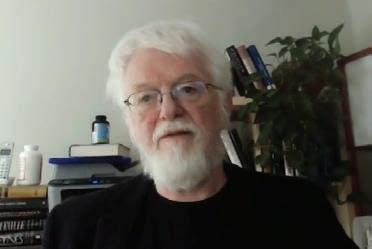
3 Pamela Marcogliese, Freshfields Bruckhaus Deringer LLP
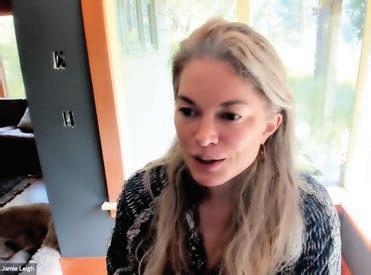
4 Sarah Coyne, Weil, Gotshal & Manges LLP
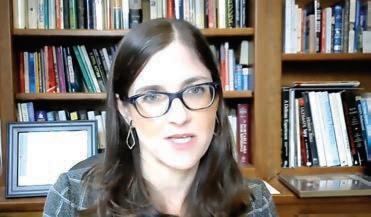
5 Daniel Gallagher, Robinhood

6 Richard Segal, Cooley LLP
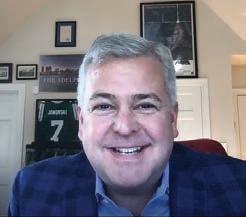
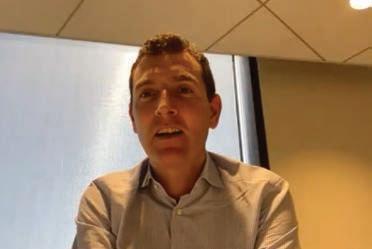
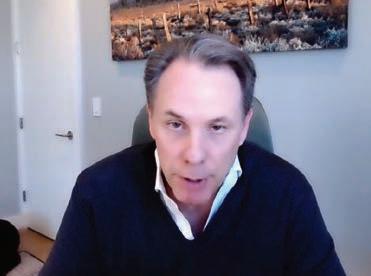


7 Allison Berry Spinner, Wilson Sonsini Goodrich & Rosati
8 Michael Klausner, Stanford Law School
9 Michael Ohlrogge, New York University School of Law
10 Colin Ryan, Goldman, Sachs & Co.
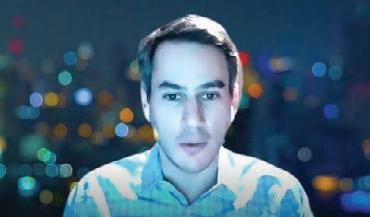
11 Neela Morrison, Google LLC


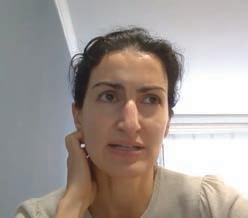
12 Herbert Hovenkamp, University of Pennsylvania Carey Law School
13 Jamie Leigh, Cooley LLP
14 Noah Phillips, Federal Trade Commission


15 Luke Bergstrom, Latham & Watkins LLP

8 7 10 6 3 1 7 9 8 12 15 11 14 10 13 4 5 2 ROUNDTABLE PROGRAMS 17

PANEL PROGRAMS
In addition to the roundtable series, the Institute hosts several panel programs each year that explore important topics in the areas of law, business, nance, and corporate governance. In the public programs, the panelists provide expert insights from research and practice and a lively exchange of ideas on the topic at hand. In the smaller, invitation-only programs, designated discussants guide an in-depth conversation among all the participants.

PANEL PROGRAMS 19
PANEL PROGRAMS

JANUARY 24, 2023
The Twitter Takeover Tale
Before a large audience of students, ILE board members, and their colleagues, six stellar transactional and litigation practitioners who were deeply involved in the Elon Musk/Twitter takeover saga discussed their experiences with that a air, from the time Musk rst expressed interest in joining Twitter’s board, buying the company, or creating a competitor, through the ensuing litigation, and culminating in his momentous last-minute decision to go forward with the acquisition of Twitter. e panelists delved deeply into how the Twitter directors evaluated their duciary responsibilities, how the extraordinarily seller-friendly merger agreement came about, how the litigation to enforce the merger agreement unfolded, and the economic and litigation pressures that might have led Musk to abandon his opposition to closing the deal.
moderators
Jill E. Fisch, Saul A. Fox Distinguished Professor of Business Law, University of Pennsylvania Carey Law School
Elizabeth Pollman, Professor of Law, University of Pennsylvania Carey Law School
discussants
Sarah K. Eddy, Wachtell Lipton Rosen & Katz
Alan M. Klein, Simpson Thacher & Bartlett LLP
Martin Korman, Wilson Sonsini Goodrich & Rosati LLP
William D. Savitt, Wachtell Lipton Rosen & Katz
Amy Simmerman, Wilson Sonsini Goodrich & Rosati LLP
Anthony F. Vernace, Simpson Thacher & Bartlett LLP
20 INSTITUTE FOR LAW & ECONOMICS
1 William D. Savitt; Wachtell Lipton Rosen & Katz; Sarah K. Eddy, Wachtell Lipton Rosen & Katz; Anthony F. Vernace, Simpson Thacher & Bartlett LLP; Jill E. Fisch, University of Pennsylvania Carey Law School

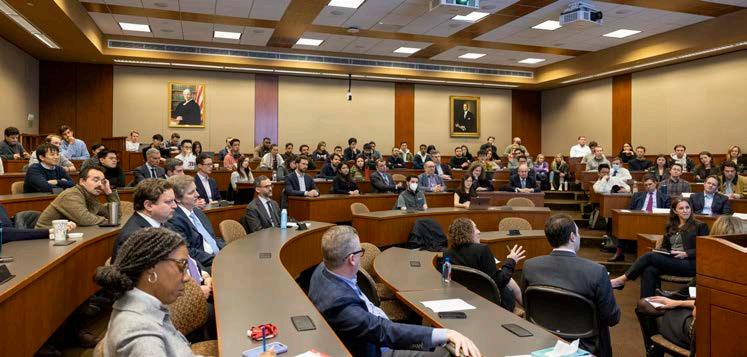
2 Amy Simmerman, Wilson Sonsini Goodrich & Rosati LLP; Martin W. Korman, Wilson Sonsini Goodrich & Rosati LLP; Alan M. Klein, Simpson Thacher & Bartlett LLP; William D. Savitt; Wachtell Lipton Rosen & Katz


1 2 PANEL PROGRAMS 21
PANEL PROGRAMS

JANUARY 18, 2023
The Ftx Fiasco: Unpacking The Most Complex Bankruptcy In History
is program examined the collapse and bankruptcy of cryptocurrency exchange FTX from two perspectives. CFTC Commissioner Goldsmith Romero explored the regulatory failures that enabled the collapse and explained the need for stronger corporate governance, independent monitoring of con icts of interest, expanded gatekeeper responsibilities, greater disclosure of investment risks, enhanced cybersecurity, and a ban on commingling of customer assets. Following her presentation, the panelists examined how the FTX bankruptcy proceedings might sort out the a ermath of the collapse: de ning when assets belong to customers versus the bankruptcy estate; the potential appointment of a bankruptcy examiner; the possibility of recovery of payments (such as political contributions) under fraudulent transfer laws; and the contestable merits of government intervention to shore up the cryptocurrency market to avoid systemic harm.
lecture
Christy Goldsmith Romero, Commissioner, Commodity Futures Trading Commission
panel moderator
Sarah Hammer, Managing Director, Stevens Center for Innovation in Finance, The Wharton School, University of Pennsylvania panelists
Aaron Klein, Miriam K. Carliner Chair and senior fellow in Economic Studies, Brookings Institution
Ross M. Kwasteniet, Kirkland & Ellis
David Skeel, S. Samuel Arsht Professor of Corporate Law, University of Pennsylvania Carey Law School
22 INSTITUTE FOR LAW & ECONOMICS
1 Commissioner Christy Goldsmith Romero
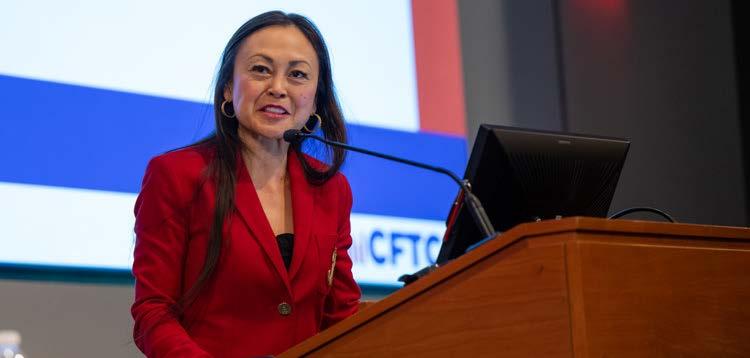
2 Sarah Hammer, Pennsylvania Department of Banking & Securities
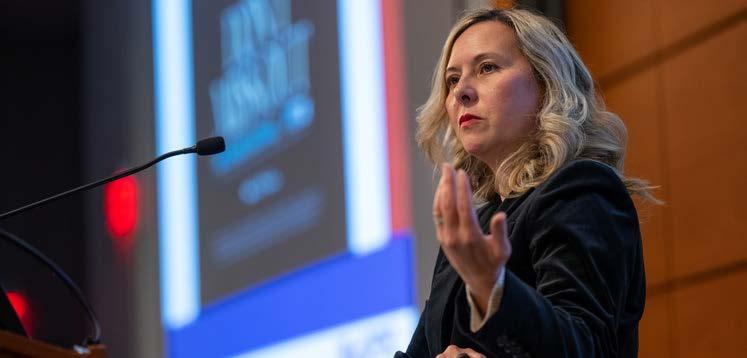
3 David Skeel, University of Pennsylvania Carey Law School; Aaron Klein, Brookings Institution; Sarah Hammer, WG’99 L’11 Managing Director, Stevens Center for Innovation in Finance, The Wharton School, University of Pennsylvania; on screen: Ross Kwasteniet, Kirkland & Ellis LLP


1 2 3 PANEL PROGRAMS 23
CONFERENCE ON RACIAL EQUITY IN CORPORATE GOVERNANCE
In cooperation with the Ira M. Millstein Center for Global Markets and Corporate Ownership, Columbia Law School, Howard University School of Law, and the Arthur and Toni Rembe Rock Center for Corporate Governance, Stanford University and Stanford Center for Racial Justice, Stanford Law School, the Institute continued its series of programs addressing issues of racial equity in corporate governance. e collaboration was inspired by former Chief Justice Leo J. Strine, Jr.
Building on previous sessions of our conference series, we convened business leaders and top legal thinkers for a panel discussion exploring the implications of recent and pending appellate cases involving challenges to diversity, equity, and inclusion strategies in di erent settings, as well as related environmental, social, and governance pressures facing corporate boards and management.
MARCH 7, 2023
Navigating Change: How Can Companies Maintain Their Commitments To Racial Equity In A Changing Legal Environment?

e panel examined the implications of litigation involving challenges to diversity, equity, and inclusion strategies, including the Students for Fair Admissions cases before the U.S. Supreme Court, Alliance for Fair Board Recruitment action before the Fi h Circuit, and California cases challenging state board diversity statutes. e discussion also explored related anti-ESG pressures facing corporate leadership.
panelists
Lisa M. Fairfax, moderator, Presidential Professor; Co-Director, Institute for Law & Economics, University of Pennsylvania Carey School of Law
Olatunde C. Johnson, Ruth Bader Ginsburg '59 Professor of Law, Columbia Law School
Melonie D. Parker, Vice President and Chief Diversity Officer, Google
Eileen Schloss, Board Member, Alteryx, CCC IS, and Sprinklr; Human Capital Operations Advisor, Advent International Private Equity
24 INSTITUTE FOR LAW & ECONOMICS
1 Melonie Parker, Google
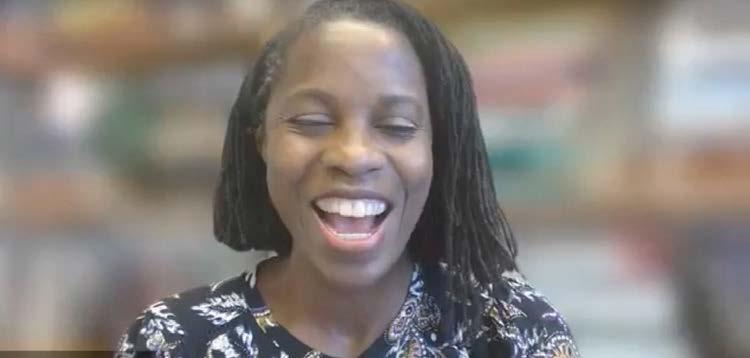
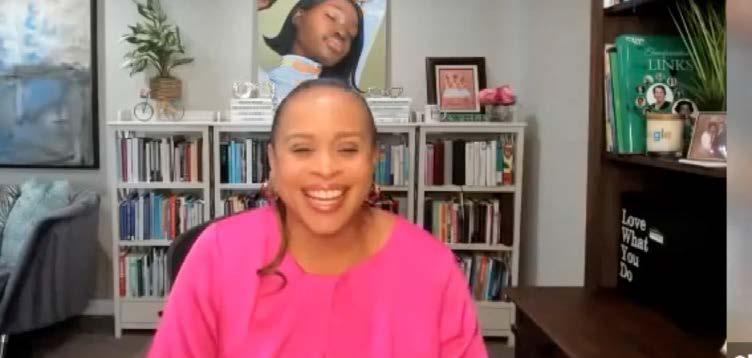
2 Olatunde Johnson, Columbia Law School
3 Eileen Schloss, Alteryx, CCC IS, and Sprinklr

4 Lisa Fairfax, University of Pennsylvania Carey Law School

1 2 3 4 PANEL PROGRAMS 25
PANEL PROGRAMS
NOVEMBER 9, 2022
Delaware Business Entity Legislative Process
(held at the o ces of Richards, Layton & Finger, P.A., Wilmington)

In this unprecedented program, members of the Council of the Corporation Law Section of the Delaware State Bar Association met with ILE Board members, members of the Delaware judiciary, and law professors from around the country who study and teach Delaware corporate law and closely follow Delaware corporate legislative developments. e discussion yielded insights from and for all participants about the way in which the Council initiates, evaluates, and proposes amendments to the Delaware General Corporation Law and Delaware’s other business entity statutes.
lead discussants
Allison Land, Council Chair, Skadden, Arps, Slate, Meagher & Flom
Srinivas M. Raju, Council Vice Chair, Richards, Layton & Finger P.A.
Hon. Karen L. Valihura, Justice, Delaware Supreme Court
Hon. Paul A. Fioravanti, Vice Chancellor, Delaware Court of Chancery
26 INSTITUTE FOR LAW & ECONOMICS
1 Lisa Fairfax, University of Pennsylvania Carey Law School; Hon. Karen Valihura, Delaware Supreme Court

2 Allison Land, Skadden, Arps, Slate, Meagher & Flom LLP



3 Eric Talley, Columbia Law School; Jill Fisch, University of Pennsylvania Carey Law School; Robert Thompson, Georgetown University Law Center; Lawrence Hamermesh, Institute for Law & Economics; Megan Shaner, University of Oklahoma College of Law
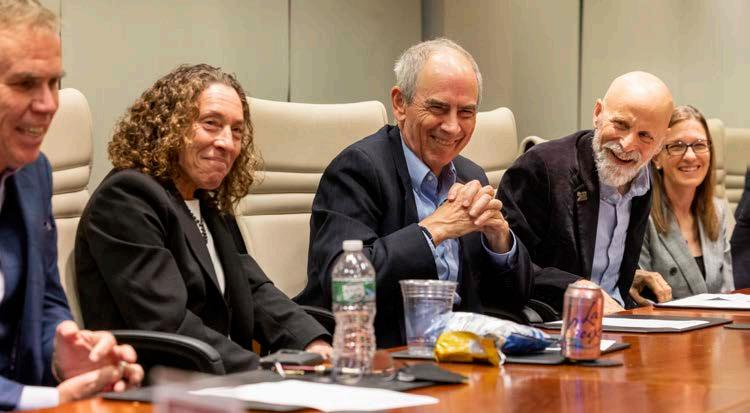
4 Kristopher Knight, Chief Deputy Secretary of State of Delaware; Eric Talley, Columbia Law School

5 Christopher Foulds, Jeffrey Gorris, Joel E. Friedlander, Friedlander & Gorris, P.A.
6 Hon. Paul Fioravanti, Delaware Court of Chancery; Hon. Karen Valihura, Delaware Supreme Court
1 3
4 6
PANEL PROGRAMS 27
5 2

LECTURES

ILE has traditionally sponsored a variety of public lectures featuring speakers on timely topics of particular interest to practitioners and students of business law and nance. Audiences are drawn from all sectors of the University and the legal and business communities. e eminent speakers hold particular appeal and inspiration for students at the Law School and e Wharton School, with whom they talk informally at receptions following each lecture.
Of particular note is the Distinguished Jurist Lecture, which is an annual highlight of the Institute’s public programming. In sponsoring that event, the Institute aims to spotlight and honor jurists and regulators at the state and federal levels who have led noteworthy careers and made significant contributions to their fields.
On February 1, 2023, through the efforts of ILE Board member George Casey, of Shearman & Sterling LLP, ILE joined in sponsoring this year’s Leon C. and June W. Holt Lecture in International Law, featuring Oleksiy Goncharenko, Member of Parliament, Ukraine. Goncharenko presented an informed and impassioned plea for continued support for resistance to global threats to democracy, including Russian military aggression against Ukraine.
LECTURES 29
DISTINGUISHED JURIST LECTURE
OCTOBER 26, 2022

Regulating Digital Assets: Law, Policy, and Economic Implications
Kristin N. Johnson, Commissioner, Commodity Futures Trading Commission
In her lecture, Commissioner Johnson examined the promise and perils of distributed ledger technology for decentralized nance and explored approaches to a regulatory framework that would minimize the risks and adverse e ects of such technology. Her presentation had a broad historical sweep, describing the virtues and vices of intermediated commercial transactions from olive presses and rice to swaps.She observed that cryptocurrency and digital assets can potentially be regulated by both the Securities & Exchange Commission and the Commodity Futures Trading Commission and acknowledged some critical di erences in the two agencies’ regulatory approaches. Noting the value of intermediation by clearing houses and exchanges (enhancing price accuracy and transparency minimizing information costs, and providing backup credit against default), Commissioner Johnson highlighted the potential role of digital assets in providing value for the unbanked and persons of color while, at the same time, subjecting those communities to the possibly disproportionate impact of cryptocurrency market losses. Commissioner Johnson also described pending legislative, regulatory, and self-regulatory organizational approaches to enhance systemic stability, consumer protection, and e ciency.
Commissioner Johnson was sworn in as a CFTC Commissioner on March 30, 2022. She is a nationally recognized expert on nancial markets risk management law and policy with specialization in the regulation of complex nancial products including the origination, distribution, and secondary market trading, clearing, and settlement of securities and derivatives. Before joining the Commission, she held endowed professorships at Emory University and Tulane University Law Schools, and taught courses in the regulation of securities and derivatives markets, nancial institutions, including courses on ntech, the development of blockchain technologies and arti cial intelligence, as well as corporations and ethical leadership. She is an elected member of the American Law Institute, an American Bar Foundation Fellow, and Chair of the Securities Regulation Section and the Executive Committee of the Business Associations and Financial Institutions and Consumer Financial Services
Sections of the Association of American Law Schools. Before entering the academy, Commissioner Johnson served as Vice President and Assistant General Counsel in the Treasury Services Division of one of the largest nancial institutions in the world supporting private funds cash management services. She also worked as a corporate associate at Simpson, acher, and Bartlett LLP’s New York and London offices where she represented issuers and underwriters in domestic and international debt and equity o erings, lenders and borrowers in banking and credit matters, and private equity rms and publicly-traded companies in mergers and acquisitions. She clerked for a federal judge who previously served on the U.S. District Court for the District of New Jersey. Commissioner Johnson has a BS with honors from Georgetown University Edmund A. Walsh School of Foreign Service and a JD from the University of Michigan Law School, where she served as a senior editor on the Michigan Law Review and received the Clara Bel eld and Henry Bates International Research Fellowship.
30 INSTITUTE FOR LAW & ECONOMICS
1 David M. Silk, Wachtell Lipton Rosen & Katz; Lisa Fairfax, University of Pennsylvania Carey Law School; Kristen Johnson, Commodity Futures Trading Commission; Jill E. Fisch, University of Pennsylvania Carey Law School; Joseph Frumkin, Sullivan & Cromwell LLP; Elizabeth Pollman, University of Pennsylvania Carey Law School
2 Kristen Johnson, Commodity Futures Trading Commission; Martin S. Lessner, Young Conaway Stargatt & Taylor, LLP
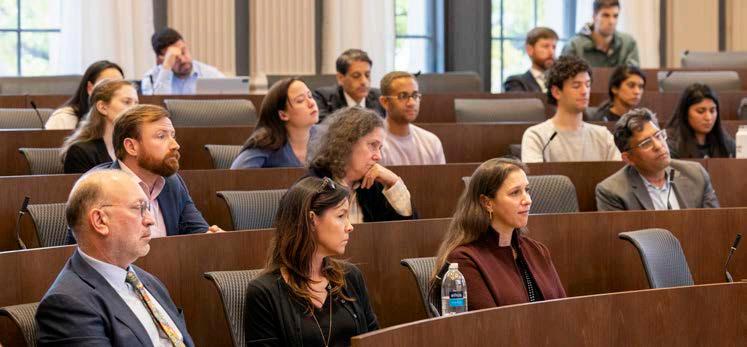
3 Kristen Johnson, Commodity Futures Trading Commission

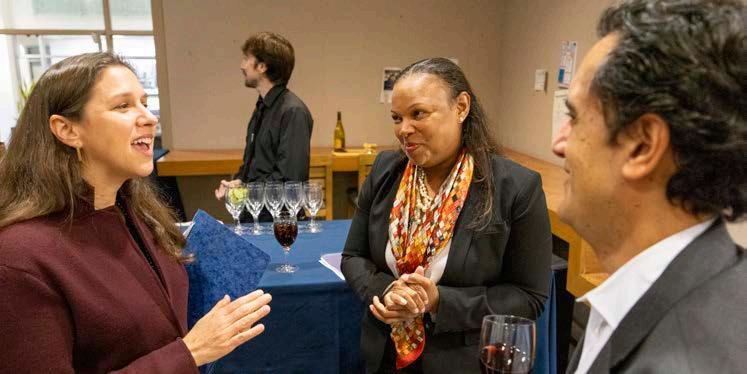
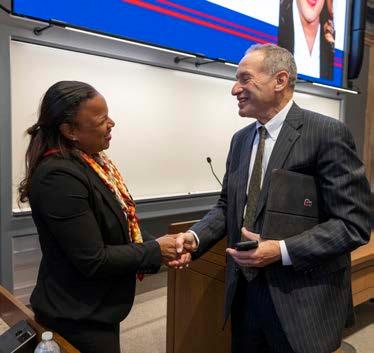
4 Elizabeth Pollman, University of Pennsylvania Carey Law School; Kristen Johnson, Commodity Futures Trading Commission; Eduardo Gallardo, Paul Hastings LLP

1 2 3 4 LECTURES 31
Past Distinguished Jurist Lectures
7 April 2022
Creating Common Law in the Corporate Context – Delaware Style
Hon. Karen Valihura L’88, Justice, Delaware Supreme Court
24 February 2021

Corporate Governance Post-Pandemic and Post-President Trump
Fireside Chat with Hon. Leo E. Strine, Jr. Counsel, Watchell, Lipton, & Katz
11 November 2019
Modernizing Our Regulatory Framework: Focus on Authority, Expertise & Long-Term Investor Interests
Jay Clayton L’93, Chairman, U.S. Securities and Exchange Commission
16 October 2018
How Some Appellate Judges Think
Hon. Thomas L. Ambro, Judge, U.S. Court of Appeals for the Third Circuit
15 November 2017
The Procedural Implementation of Enhanced Scrutiny
Hon. J. Travis Laster, Vice Chancellor, Delaware Court of Chancery
PAST LECTURES
29 November 2016
Current Policy Priorities
Antonio Weiss, Counselor to the Secretary of the U.S. Treasury, Department of the Treasury
14 October 2015
Science, Technology, and Immigration in the 21st Century
Hon. Barrington D. Parker, Jr., U.S. Court of Appeals for the Second Circuit
19 March 2015
Fixing Lawyers’ Mistakes: The Court’s Role in Administering Delaware’s Corporate Statute
Hon. John W. Noble, Vice Chancellor, Delaware Court of Chancery
19 November 2013
The Paucity of Criminal Prosecutions Arising from the Financial Crisis: Unaccountable?
Hon. Jed S. Rakoff, U.S. District Judge, Southern District of New York
10 October 2012
Financial Stability Regulation
Daniel K. Tarullo, Governor, Board of Governors of the Federal Reserve System
15 February 2012
Regular Order as Equity
Hon. Leo E. Strine, Jr., Chancellor, Delaware Court of Chancery
Past Law and Entrepreneurship Lectures
12 May 2021
A Moderated Conversation Martin Lipton, Founding Partner, Wachtell, Lipton, Rosen & Katz
With Theodore Mirvis, Wachtell, Lipton, Rosen & Katz
17 November 2020
A Moderated Conversation: Entrepreneurship and Venture Capital in 2020 & Ahead
Scott Kupor, Managing Director, Andreesen Horowitz
With Elizabeth Pollman, University of Pennsylvania Carey Law School
10 April 2019
China, Inc. – What It Means for American Innovation and Entrepreneurship
John Schultz L’89, Executive Vice President, Chief Legal & Administrative Officer, Hewlett Packard Enterprise; Chair of the Board, H3C Technologies Company, Ltd.
13 November 2018
Intellectual Property – the New Global Currency
Osagie Imasogie LLM’85, Senior Managing Partner, Phoenix IP Ventures
17 January 2018
Immersive Computing @ Google
Matthew Apfel, Director, VR Video, Google, Inc.
25 October 2017
Game Changers: Transformation of Sports Media (and a Career)
Bill Koenig, President of Global Content and Media Distribution, National Basketball Association
12 April 2017
A Banker’s Perspective on M&A
Greg Weinberger, Co-Head of Global M&A, Credit Suisse Securities (USA) LLC
26 October 2016
The Immediate Challenges for the Next President of the United States
David M. Rubenstein, Co-Founder and Co-CEO, The Carlyle Group
16 March 2016
Off the Field and Off the Record: The Future
Through the Prism of Sports
Philip de Picciotto, Founder and President, Octagon
11 November 2015
Counselor as Entrepreneur or Law as a Dynamic Venture
Steven M. Cohen, Executive Vice President, Chief Administrative Office and General Counsel, MacAndrews & Forbes Incorporated
17 February 2015
Doing Well and Doing Good: The Story of Plum Organics and the New Benefit Corporation Movement
Frederick Alexander, Counsel, Morris, Nichols, Arsht & Tunnell LLP and Advisor for Legal Policy, B Lab
Neil Grimmer, CEO and Co-Founder, Plum Organics
Bart Houlahan, Co-Founder, B Lab
Ray Liguori, Vice President of Corporate Development, Campbell Soup Company
Keely Stewart, Associate Corporate Counsel, Campbell Soup Company
18 November 2014
Happy Guy in Distressed… From Pre-Med to JD to Distressed Investing
Steven T. Shapiro, Founding Partner and Senior Portfolio Manager, GoldenTree Asset Management
23 April 2014
Blackstone Navigating a Sea of Regulatory Change
John G. Finley, Senior Managing Director and Chief Legal Officer, The Blackstone Group
25 October 2011
The Delaware Court of Chancery from 1989 –2011: An Insider’s View
Hon. William B. Chandler III, Chancellor, Delaware Court of Chancery
23 March 2011
Treasury’s Performance as Pay Tsar: Precedent or Aberration?
Kenneth R. Feinberg, Feinberg Rozen, LLP
29 October 2009
Private Securities Litigation — Time for a Fresh Start?
Hon. Lewis A. Kaplan, U.S. District Judge, Southern District of New York
11 November 2008
Delaware Directors’ Fiduciary Duties:
The Focus on Loyalty
Hon. Randy Holland, Justice, Supreme Court of Delaware
24 October 2007
The Future of Securities Regulation
Brian G. Cartwright, General Counsel, Securities and Exchange Commission
11 October 2006
The Embattled Corporation
Hon. Richard A. Posner, U.S. Seventh Circuit Court of Appeals and University of Chicago Law School
12 November 2013
Shazam! – A ’63 Law Grad is Transformed into a High Tech Entrepreneur
J. Haig Farris, President, Fractal Capital Corporation
25 February 2013
From Corporate Management to Sports Management: Turning Around the 76ers
Adam Aron, CEO and Co-Owner, Philadelphia 76ers
18 October 2012
The Cross-Cultural CEO: Growing a Business in a World Without Borders
David Perla L’94, Co-Chief Executive Officer, Pangea3 LLC
15 November 2011
Too Dull for Davos: My Life in Long-Only, Objective-Based, Active Money Management and Why I Think It Still Makes Sense
Paul G. Haaga, Jr., Chairman of the Board, Capital Research and Management Company
2 March 2011
Competitive Places and Inner City Opportunities: Reflections on 25 Years of Community Investment
Jeremy Nowak, President and Chief Executive Officer, The Reinvestment Fund
2 November 2010
The Financial Crisis: Aftermath and Implications
H. Rodgin Cohen, Sullivan & Cromwell LLP
3 March 2010
Managing Through Change, Managing Through Crisis in Financial Services
Joseph D. Gatto, Chairman of Investment Banking, Barclays Capital Americas
30 September 2009
The ‘Ten Points’ for Maintaining a Risk-Taking Entrepreneurial Spirit in a Large Corporation
J.P. Suarez, Senior Vice President and General Counsel, Wal-Mart Stores International Division
16 March 2006
Technology Mergers in a Shrinking World
Hon. Vaughn R. Walker, Chief Judge, U.S. District Court for the Northern District of California
3 March 2005
Corporate Federalism: Event Horizons in Corporate Governance
Hon. Myron T. Steele, Chief Justice, Delaware Supreme Court
28 October 2004
A Twelve-Year Retrospective on Delaware Corporate Jurisprudence and Governance Issues
Hon. E. Norman Veasey, Chief Justice, Delaware Supreme Court
4 March 2004
Corporate Decision-Making in Delaware
Courts
Hon. Carolyn Berger, Justice, Deleware Supreme Court
31 March 2009
The PeopleSoft Deal
Safra Catz, President, Oracle Corporation
3 March 2009
Defining the 21st Century Campus: The Intersection of Education and Community
Hon. Michael Nutter, Mayor, City of Philadelphia
17 September 2008
Retailers in a Recession: A Fireside Chat on Investing with Bill Ackman
William A. Ackman, Managing Member, Pershing Square Capital Management, L.P.
31 March 2008
Making Every Mistake Once Safra Catz, President, Oracle Corporation
19 September 2007
Tales from Blackstone’s IPO
Robert L. Friedman, Senior Managing Director and Chief Legal Officer, The Blackstone Group L.P.
28 February 2007
Law, Legal Risks, and the Financial Markets
Isaac D. Corré, Senior Managing Director, Eton Park Capital Management
29 November 2006
Large-Scale Entrepreneurship: Business Development at GE
Pamela Daley, Senior Vice President for Corporate Business Development, General Electric Company
26 October 2006
Managing in the 21st Century
Henry R. Silverman, Chairman & CEO, Realogy Corporation
16 February 2006
The Banker as Entrepreneur
Michael J. Biondi, Co-Chairman, Investment Banking, Lazard Frères & Co. LLC
32 INSTITUTE FOR LAW & ECONOMICS
Past Distinguished Jurist Lectures
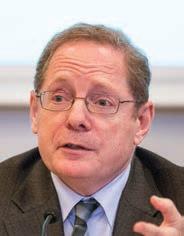

1 Jay Clayton
2 Hon. Thomas L. Ambro
3 Hon. J. Travis Laster


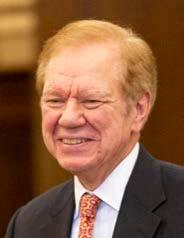


4 Antonio Weiss
5 Hon. Barrington D. Parker, Jr.
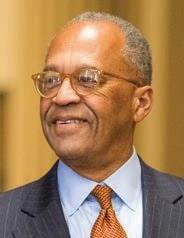
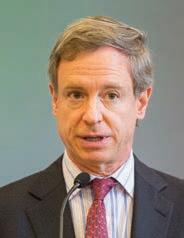
6 Hon. John W. Noble
7 Hon. Jed S. Rakoff
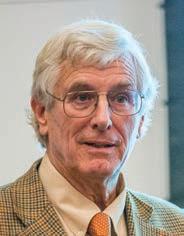
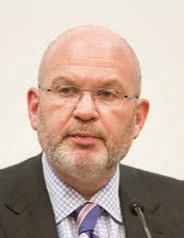

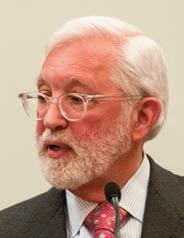
8 Daniel K. Tarullo

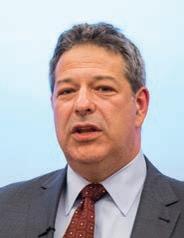


9 Hon. Leo E. Strine, Jr.
Past Law and Entrepreneurship Lectures
10 Martin Lipton
11 Scott Kupor
12 John Schultz
13 Osagie Imasogie
14 Matthew Apfel
15 Bill Koenig
16 Greg Weinberger
17 David Rubenstein

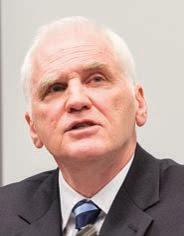
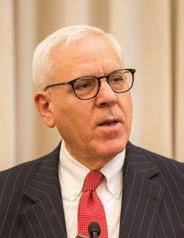
18 Philip de Picciotto
19 Steven M. Cohen


20 Steven T. Shapiro
21 Neil Grimmer, Roy Liguori, Keely Stewart, Frederick Alexander, Bart Houlahan
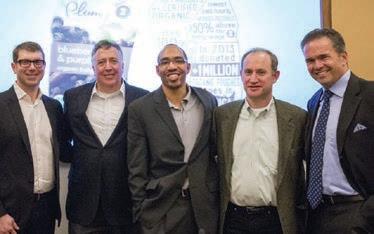
22 John Finley
23 J. Haig Farris
16 19 23 1 2 5 7 18 17 21 10 12 8 20 11 13 9 22 3 6 4 14 15 LECTURES 33
INSIGHTS FROM PRACTICE LECTURE
APRIL 11, 2023

The Law Firm Of The Future: The Business Of Law v. The Substance Of Law
Sherrese M. Smith, Managing Partner, Paul Hastings LLP
Before joining Paul Hastings, Sherrese Smith served as Chief Counsel to Chairman Julius Genachowski at the Federal Communications Commission. In her lecture she described her journey to being appointed as the rst Black woman, and Black person, to be a world-wide managing partner of a global law rm. She explained the importance of understanding the “business” of law and how embracing that concept leads to success for lawyers and law rms. A er exploring recent changes in the legal workforce, Smith spoke about how law rm hiring, promotion, and retention strategies have evolved in light of those changes. She also examined challenges confronting global law rms, including the manner in which economic, social, and political issues are a ecting the legal industry and how best to navigate those issues, changes to the law rm landscape and the evolving expectations for both associates and partners resulting from those changes, and the importance to law rm success of fully incorporating diversity and inclusion initiatives into the law rm culture, including the importance of holding partners accountable for providing meaningful feedback to all associates. Smith also o ered advice on navigating work/life balance, how law students should di erentiate among law rms, and how to make the most of the law rm experience.
34 INSTITUTE FOR LAW & ECONOMICS
1 Sherrese Smith, Paul Hastings LLP
2 Jill E. Fisch, University of Pennsylvania Carey Law School; Lisa Fairfax, University of Pennsylvania Carey Law School; Sherrese Smith, Paul Hastings LLP; Norman M. Powell, Young Conaway Stargatt & Taylor, LLP

3 Lisa Fairfax, University of Pennsylvania Carey Law School; Sherrese Smith, Paul Hastings LLP
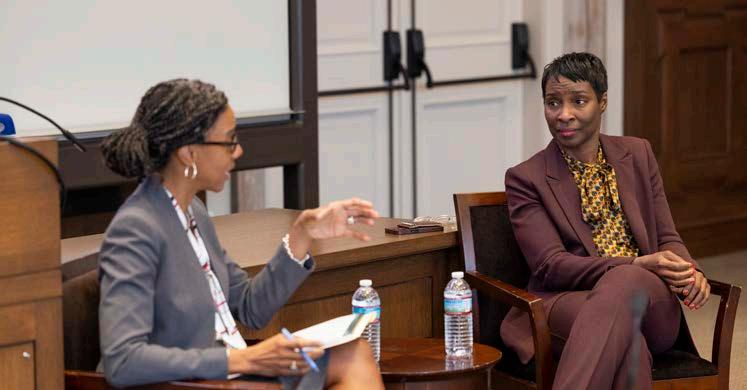

4 Sherrese Smith, Paul Hastings LLP; Jill E. Fisch, University of Pennsylvania Carey Law School
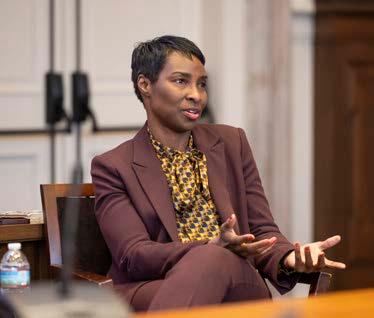
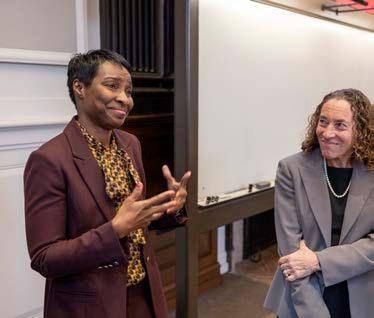
5 John DiTomo, Morris, Nichols, Arsht & Tunnell LLP; Mark Lebovitch, Bernstein Litowitz Berger & Grossman LLP
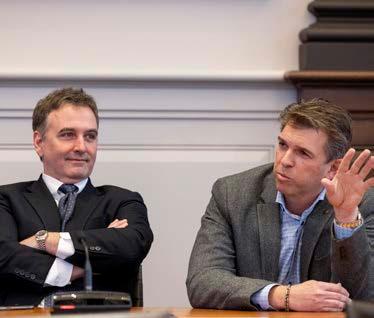
1 3
2
LECTURES 35
4
5

ACADEMIC EVENTS

The Institute for Law & Economics organizes a variety of symposia focused primarily on the academic community. A distinctive feature of these programs is the involvement of judges and practitioners, who bring their practical insights to bear on the implications of academic research.
For over 15 years, ILE has sponsored an annual conference on Law and Finance jointly with The Wharton School’s Financial Institutions Center and NYU’s Pollack Center for Law and Business. Although the conference had been suspended for several years due to the pandemic, we were delighted to see it resume in the 2022-2023 academic year.
ILE also sponsors the ILE/Wharton Finance Seminar series, providing an opportunity for faculty and advanced students from the Law School, The Wharton School, and the Department of Economics to engage in areas of common interest and strengthen ILE’s core academic relationships. During the 2022-2023 academic year, ILE hosted two workshops as part of this series.
Finally, building on the success of the Fall 2021 academic workshop featuring work by early and midcareer scholars, ILE expanded the program to a full day junior faculty workshop the day before the Fall Corporate Roundtable.
ACADEMIC EVENTS 37
PENN / NYU CONFERENCE ON LAW AND FINANCE
FEBRUARY 24-25, 2023
University Of Pennsylvania Carey Law School
jointly sponsored by Institute for Law & Economics, University of Pennsylvania Pollack Center for Law & Business, New York University
organized by
Yakov Amihud, Stern School of Business, New York University
Stephen Choi, New York University School of Law
Lisa Fairfax, University of Pennsylvania Carey Law School
Jill E. Fisch, University of Pennsylvania Carey Law School
Itay Goldstein, The Wharton School, University of Pennsylvania
Elizabeth Pollman, University of Pennsylvania Carey Law School
David Yermack, Stern School of Business, New York University
Session I
Individual Investor Ideology
Robert J. Jackson, Jr., New York University School of Law
Jonathon Zytnick, Georgetown University Law Center
commentator
Enrichetta Ravina, Federal Reserve Bank of Chicago
moderator
David Zaring, The Wharton School, University of Pennsylvania
Session II
Mutual Fund Flows and Capital Supply in Municipal Financing
Manuel Adelino, Duke University
Chiyoung Cheong, City University of Hong Kong
Jaewon Choi, University of Illinois at Urbana-Champaign – Department of Finance
Ji Yeol Jimmy Oh, Hanyang University
commentator
Emiliano Catan, New York University School of Law
Session III
Socially Responsible Divestment
Alex Edmans, London Business School – Institute of Finance and Accounting
Doron Levit, University of Washington Foster School of Business
Jan Schneemeier, Indiana University – Kelley School of Business
commentator
Ryan Bubb, New York University School of Law
moderator
Stephen Choi, New York University School of Law
Session IV
What’s in a Name? ESG Mutual Funds and the SEC Names Rule
Jill E. Fisch, University of Pennsylvania Carey Law School
Adriana Z. Robertson, University of Chicago Law School
commentators
Stuart Gillan, University of North Texas Ryan College of Business
moderator
Lisa Fairfax, University of Pennsylvania Carey Law School
Session V
Shareholder Litigation and Corporate Culture
Cheng Jiang, Temple University Fox School of Business
Kose John, New York University – Finance Department, Stern School of Business
Ming Ju, Louisiana Tech University – College of Business
commentator
Adam Badawi, Berkeley Law School
moderator
Itay Goldstein, The Wharton School, University of Pennsylvania
Session VI
How Deals Die
Da Lin, Richmond Law School
Morgan Ricks, Vanderbilt University Law School
commentator
Michael Weisbach, Ohio State University Fisher College of Business
moderator
Lawrence Hamermesh, University of Pennsylvania Institute for Law & Economics
Session VII
Gas, Guns, and Governments: Financial Costs of Anti-ESG Policies
Daniel Garrett, University of Pennsylvania – Finance Department, The Wharton School
Ivan Ivanov, Federal Reserve Bank of Chicago
commentator
Paul Mahoney, University of Virginia Law School
moderator
Elizabeth Pollman, University of Pennsylvania Carey Law School
Session VIII
Do Mutual Funds Represent Individual Investors?
Jonathon Zytnick, Georgetown University Law Center
commentator
Vyacheslav Fos, Boston College Carroll School of Management
moderator
Jill Fisch, University of Pennsylvania Carey Law School

38 INSTITUTE FOR LAW & ECONOMICS
1 Jaewon Choi, Gies College of Business, University of Illinois Urbana-Champaign
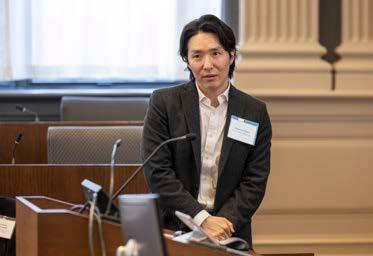
2 Jan Schneemeier, Indiana University Kelley School of Business

3 Enrichetta Ravina, Federal Reserve Bank of ChicagoExchange Commission

4 Emiliano Catan, New York University School of Law
5 Dan Garrett, The Wharton School
6 Manuel Adelino, Duke University Fuqua School of Business
7 Morgan Ricks, Vanderbilt University Law School
8 Adriana Robertson, University of Chicago Law School; Jill E. Fisch, University of Pennsylvania Carey Law School

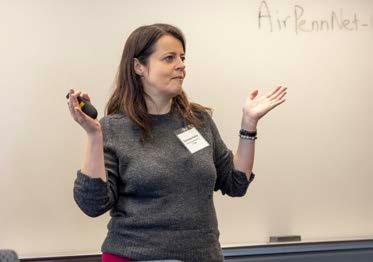

9 Front row: Paul Mahoney, University of Virginia School of Law; Marcel Kahan, New York University School of Law; Second row: Edward Rock, New York University School of Law; Cindy Alexander, Securities & Exchange Commission


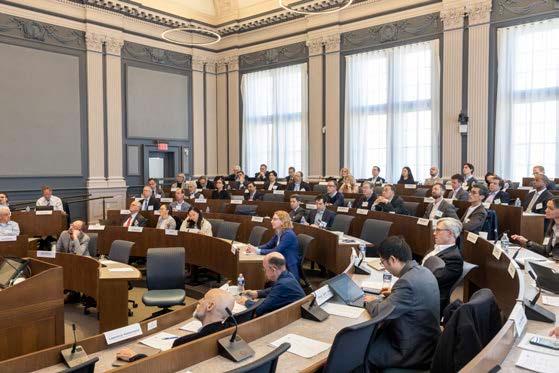
10 Robert Jackson, New York University School of Law; Jonathon Zytnick, Georgetown University Law Center
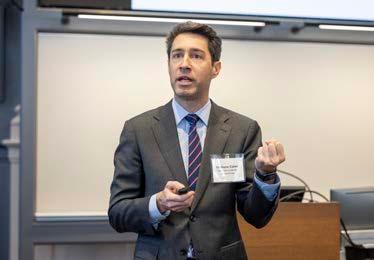

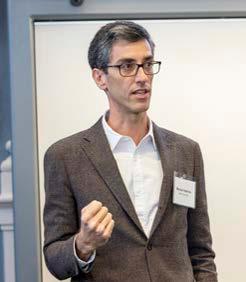
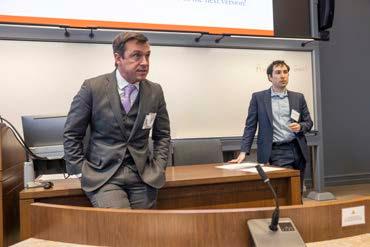
1 3 8 5 6 7 2 4 9 10 ACADEMIC EVENTS 39
FINANCE SEMINAR
NOVEMBER 30, 2022
Tiny trades, big questions: fractional shares
Robert P. Bartlett, I. Michael Heyman Professor of Law at UC Berkeley School of Law (with Justin McCrary, Columbia University - Law School; National Bureau of Economic Research, and Maureen O'Hara, Cornell University - Samuel Curtis Johnson Graduate School of Management)
In their investigation of fractional share trading, the authors develop a methodology for identifying fractional share trades in the Consolidated Transaction Reporting System. eir approach uses a latency-based digital footprint to estimate fractional share trades executed by Robinhood and Drivewealth, the two largest fractional share broker dealers. ey nd a surprising breadth to fractional share trading: high-priced stocks, meme stocks, IPOs, SPACs, and other popular retail stocks now exhibit considerable numbers of these tiny trades. ey show that these tiny trades matter: fractional share trades are predictive of future liquidity and volatility, suggesting an information content to fractional share trades. eir results indicate that their measure of fractional share trading better captures this market information than do standard measures of retail trading. ey also discuss how current data and reporting protocols preclude knowing the full extent of fractional share trading, in ate trading volume data, and provide at best censored samples of these o -exchange trades.
commentators
Lisa Fairfax, Presidential Professor, University of Pennsylvania Carey Law School
Jill Fisch, Saul A. Fox Distinguished Professor of Business Law, University of Pennsylvania Carey Law School
MARCH 30, 2022
Collateral Reallocation

Giorgia Piacentino, Associate Professor, Columbia Business School, Columbia University (with Jason Roderick Donaldson, Associate Professor of Finance, Olin Business School, Washington University, and Denis Gromb, Antin I.P. Chair Professor of Finance, HEC Paris)
Assets pledged as collateral for secured debt cannot be sold unless the debt is paid or otherwise renegotiated. e authors develop a model of this role of collateralization and nd that debt market frictions (alone) can cause the asset market to fail. Asymmetric information about debt values frustrates e cient asset sales despite perfect information about asset values and freedom to renegotiate. Still, borrowers issue secured debt in equilibrium, but only as a last resort, when net worth is low, as in recessions. e authors’ theory provides an explanation of why secured borrowing is countercyclical and asset reallocation procyclical.
commentators
Vincent Buccola, Associate Professor of Legal Studies & Business Ethics, Wharton Legal Studies, University of Pennsylvania
Jonathan Klick, Professor of Law, University of Pennsylvania Carey Law School
Winston (Wei) Dou, Assistant Professor of Finance, The Wharton School
Yao Zeng, Assistant Professor of Finance, The Wharton School
ILE/WHARTON
40 INSTITUTE FOR LAW & ECONOMICS
1 David Musto, The Wharton School


2 Robert P. Bartlett, UC Berkeley School of Law

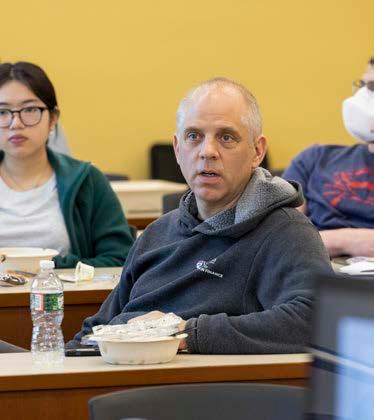

3 Giorgia Piacentino, Columbia Business School, Columbia University
4 Luke Taylor, The Wharton School

1 2 3 4 ACADEMIC EVENTS 41
JUNIOR FACULTY BUSINESS AND FINANCIAL LAW WORKSHOP
In December 2022, ILE hosted a full day workshop that o ered junior academics the opportunity to obtain feedback on work in progress from scholars and practitioners with relevant subject matter expertise. e eight papers presented were selected by ILE faculty co-directors following a call for papers that drew over 100 submissions. We acknowledge the senior academics and practitioners who took the time to provide thoughtful commentary.
THURSDAY, DECEMBER 8, 2022

Extraterritorial corporate governance
William J. Moon, University of Maryland Carey School of Law
commentators
Jill E. Fisch, Saul A. Fox Distinguished Professor of Business Law, University of Pennsylvania Carey Law School
Elizabeth Pollman, Professor of Law, University of Pennsylvania Carey Law School
The Essential Work Of Corporate America
Etienne C. Toussaint, University of South Carolina School of Law
commentators
Claudine Gartenberg, Assistant Professor of Management, The Wharton School, University of Pennsylvania
David Webber, Professor of Law, Boston University School of Law
The Rise of the Influencer
Lisa M. Fairfax, Presidential Professor of Law, University of Pennsylvania Carey Law School
Donald Langevoort, Thomas Aquinas Reynolds Professor of Law, Georgetown University Law Center
commentators
Lisa M. Fairfax, Presidential Professor of Law, University of Pennsylvania Carey Law School
Donald Langevoort, Thomas Aquinas Reynolds Professor of Law, Georgetown University Law Center
Strategic Compliance
Geeyoung Min, Michigan State University College of Law
commentators
Jason Halper, Co-Chair, Global Litigation Group, Cadwalader, Wickersham & Taft LLP
Veronica Root Martinez, Professor of Law, Duke University School of Law
Unequal Intermediation: Wealth Inequality And The Stratification Of The Capital Markets
Emily Winston, University of South Carolina School of Law
commentators
Laura N. Beny, Earl Warren DeLano Professor of Law, University of Michigan Law School
Leo E. Strine, Jr., Michael L. Wachter Distinguished Fellow in Law and Policy, University of Pennsylvania Carey Law School; Of Counsel, Wachtell, Lipton, Rosen & Katz; Former Chief Justice, Delaware Supreme Court
The Law Of Contingent Control In Venture Capital
Alvaro Pereira, University of Leeds School of Law
commentators
Robert Bartlett, I. Michael Heyman Professor of Law, UC Berkeley School of Law
Mark Gentile, Director, Richards, Layton & Finger , P.A.
Color Of The Fed
Nakita Cuttino, Georgetown University Law Center
commentators
Jeffrey N. Gordon, Richard Paul Richman Professor of Law, Columbia Law School
Richard K. Kim, Wachtell, Lipton, Rosen & Katz
High End Securities Regulation
William W. Clayton, Brigham Young University J. Reuben Clark Law School
commentators
Elisabeth de Fontenay, Professor of Law, Duke University School of Law
George Geis, William S. Potter Professor of Law, University of Virginia School of Law
42 INSTITUTE FOR LAW & ECONOMICS
1 Claudine Gartenberg, The Wharton School; Donald Langevoort, Georgetown University Law Center; George Geis, University of Virginia School of Law

2 David Webber, Boston University School of Law; Emily Winston, University of South Carolina School of Law; Geeyoung Min, Michigan State University College of Law; William Clayton, Brigham Young University J. Reuben Clark Law School
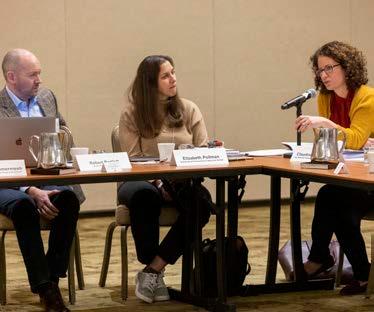

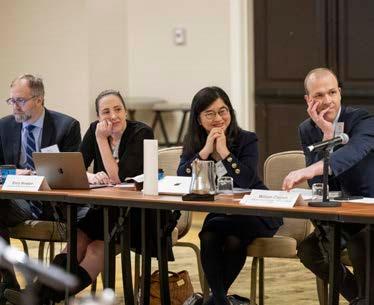

3 Sue Guan, Santa Clara University School of Law; William Moon, University of Maryland Frances King Carey School of Law; Jonathon Zytnick, Georgetown University Law Center
4 Atinuke Adediran, Fordham University School of Law; Jason Halper, Cadwalader Wickersham & Taft LLP; Thomas Williams, American University Washington College of Law

5 Thomas Williams, American University Washington College of Law; Nakita Cuttino, Georgetown University Law Center

6 Robert P. Bartlett, UC Berkeley School of Law; Elizabeth Pollman, University of Pennsylvania Carey Law School; Claudine Gartenberg, The Wharton School

7 David Webber, Boston University School of Law
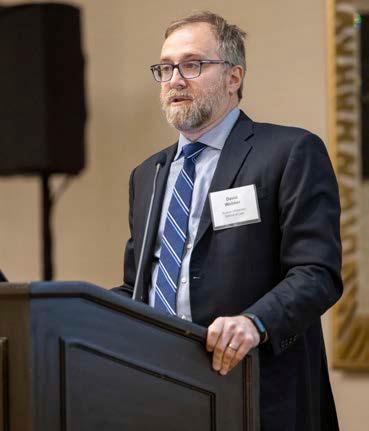
1 3 5 7 2
6 ACADEMIC EVENTS 43
4
CURRICULAR PARTNERSHIPS
FALL 2022 – SPRING 2023
e Institute for Law & Economics engages in curricular partnerships that serve the Law School’s educational mission. Members of our board of advisors make important contributions as members of our adjunct faculty. In addition, ILE invites members of our board and other distinguished professionals to the Law School for special classes and seminars and as luncheon speakers and program participants to share their professional expertise with Penn Carey Law students in an informal setting.
COURSES
Business Strategy, Private Equity and Corporate Law
Perry Golkin
Corporate Reorganization
Martin Bienenstock
Cross Border M&A
George Casey and Scott Petepiece
Economic and Regulatory Policy for Global Markets

Jay Clayton
M&A Through the Business Cycle
Joseph Frumkin, Joseph Gatto and Brian Hamilton
In addition, we extend our thanks to the many board members who generously contributed their time and expertise as guest speakers in business law courses across the curriculum.
44 INSTITUTE FOR LAW & ECONOMICS


ACADEMIC EVENTS 45
LUNCH AND LEARN PROGRAMS
is year ILE initiated a series of lunch and learn programs that highlighted prominent participants in the business eld, with a particular emphasis on exposing students and the Penn community to a diverse range of careers and cutting edge topics in business and business law.
FEBRUARY 15, 2023
Kyle Wagner Compton, Editor, The Chancery Daily
Kyle Wagner Compton, L’04, WG’11, served as a clerk to Hon. Leo E. Strine, Jr. on the Delaware Court of Chancery. He is the creator and editor of e Chancery Daily, a comprehensive, widely followed daily publication that describes, analyzes, and provides links to corporate and business law opinions of the Delaware Court of Chancery, the Delaware Supreme Court, and the Complex Commercial Division of the Delaware Superior Court.
FEBRUARY 28, 2023
Audrey Choi, Senior Advisor, Morgan Stanley
Audrey Choi formerly served as Morgan Stanley’s Chief Sustainability O cer (CSO)—the rst CSO on Wall Street, and has held senior policy positions in the White House, including Chief of Sta of the Council of Economic Advisors.
MARCH 21, 2023

Lissette Duran, Senior ESG Associate, Paul, Weiss, Rifkind, Wharton & Garrison LLP
Lissette Duran, named a “Top Lawyer Under 40” by the Hispanic National Bar Association, is a senior ESG associate at Paul, Weiss with extensive experience in internal employment investigations, advising corporate boards on the development of HR and DEI initiatives, and conducting racial equity audits related to some of the nation’s largest corporations.
APRIL 18, 2023
Hon. Sam Glasscock, III, Vice Chancellor, Delaware Court of Chancery
Hon. Bonnie W. David, Master, Delaware Court of Chancery
e Honorable Sam Glasscock III was appointed as Vice Chancellor in 2011 a er having served as Master in Chancery from 1999 to 2011. He received a BA in History from the University of Delaware in 1979, a JD from Duke University in 1983 and a Master's Degree in Marine Policy from the University of Delaware in 1989. Before coming to the Court of Chancery, he worked as a judicial clerk, as an associate at Prickett, Jones, Elliott, Kristol & Schnee in the litigation section, as a Superior Court special discovery master, and as a Deputy Attorney General in the Appeals Unit of the Department of Justice.
Bonnie W. David L’13, became a Master in Chancery in January 2023. Before joining the Court, Master David was a Counsel in the litigation department of Skadden, Arps, Slate, Meagher & Flom LLP, where she litigated before the Court of Chancery with a focus on deal litigation, corporate statutory proceedings, and contract disputes, and advised on corporate governance and transactions. Master David served as Senior Editor on the University of Pennsylvania Law Review. She received her BA from Boston University, graduating summa cum laude. Immediately a er law school, Master David clerked in the Court of Chancery for Vice Chancellor Sam Glasscock III.
46 INSTITUTE FOR LAW & ECONOMICS
1 Audrey Choi, Morgan Stanley; Lisa Fairfax, University of Pennsylvania Carey Law School; Lawrence Hamermesh, Institute for Law & Economics

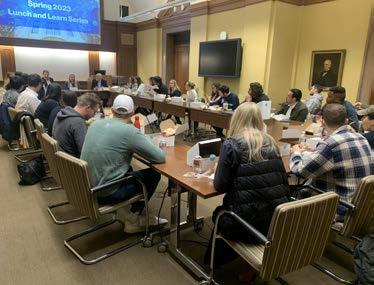

2 Hon. Sam Glasscock, III, Delaware Court of Chancery
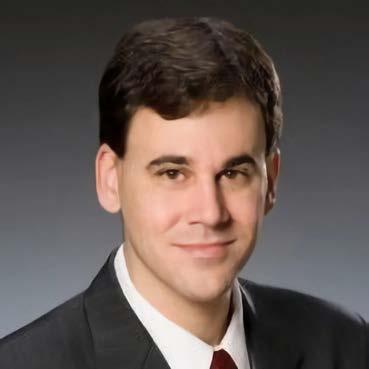
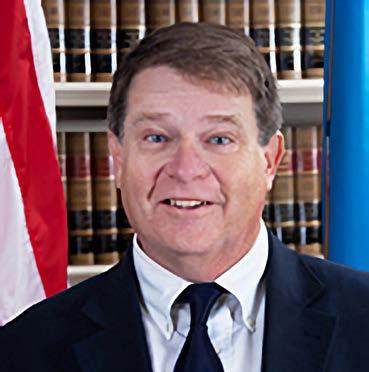
3 Lissette Duran, Paul, Weiss, Rifkind, Wharton & Garrison LLP


4 Kyle Wagner Compton, The Chancery Daily
5 Hon. Bonnie W. David, Delaware Court of Chancery
 1
2
4
3
1
2
4
3
ACADEMIC EVENTS 47
5

DELAWARE ORAL HISTORY PROJECT AND THE LIPTON ARCHIVE
Seven years ago, the Institute embarked upon an exciting long-term project involving the creation of oral histories of the seminal Delaware corporate cases and legislative developments since the general revision of the Delaware General Corporation Law (DGCL) in 1967. e project centers on recorded interviews to preserve the recollections of many of the lawyers and judges who participated in those cases and developments. Based on those interviews and on the opinions, briefs and other associated materials, the project has prepared a narrative video that presents the background stories of many of the cases. e Delaware Corporate Law Resource Center website, which the Institute created and maintains, makes all these materials publicly accessible at no charge.
The oral history project emerged out of a series of advanced seminars taught by Delaware’s Chief Justice Leo E. Strine, Jr. and Professor Michael Wachter. In previous years, the seminar featured participants in major Delaware corporate cases describing their experience and strategies in litigating the cases. That classroom experience highlighted the value of developing oral histories that gather and preserve similar recollections about Delaware’s landmark corporate cases. Given ILE’s close relationship with the Delaware courts over the years and the significance of this period in the development of modern Delaware corporate law, ILE expects this collection to be an invaluable resource for students and scholars. We celebrated the completion of the oral history project, although the collection of legislative developments will continue to be supplemented from year to year as the Delaware General Corporation Law is amended.
This resource was made possible by the generous support of key sponsors: Wachtell, Lipton, Rosen & Katz; Skadden, Arps, Slate, Meagher & Flom LLP; Sullivan & Cromwel LLP; CSC Global; Morris, Nichols, Arsht & Tunnell LLP; Potter Anderson & Corroon LLP; Richards, Layton & Finger, P.A., Young Conaway Stargatt & Taylor, LLP; and the Delaware State Bar Association.
In June 2021, building on the success of the Delaware Corporate Law Resource Center, and with substantial support from Wachtell, Lipton, Rosen & Katz, the Institute unveiled a new affiliated website, “The Lipton Archive.” The Lipton Archive is a living corporate law and governance history site focusing on the thought leadership of Martin Lipton of Wachtell, Lipton, Rosen & Katz. The website has a searchable index of Lipton’s iconic memos from their inception and continuing into the future, as Lipton continues to address the emerging issues of this century. In addition, all of Lipton’s scholarly articles, and several of his important yearly writings (e.g., his Spotlight on Boards series) are available in chronological order. The site also has a narrative of Lipton’s career and thought leadership, which contains citations not only to his own work, but also those of leading thinkers with whom he has engaged in constructive dialogue. The site links to the rich materials in the Delaware Corporate Law Resource Center so that scholars, teachers, students, and practitioners may use them to conduct research, design interesting classroom and executive and legal education sessions, and deepen their understanding of the history and traditions of corporate governance.
The website of the Delaware Corporate Law Resource Center can be found at www.law.upenn.edu/delawarecorporatehistory/.
The Lipton Archive is available at http://www.theliptonarchive.org/.



DELAWARE ORAL HISTORY PROJECT 49

ILE launched the Women in Business Law Initiative in September 2019. WIBLI aims to promote the development and advancement of women in business law. Its membership consists of a growing network including current University of Pennsylvania Carey Law School students, Law School alumni, members of the ILE Board of Advisors or of their rms, judges, and other female professionals.


WOMEN IN BUSINESS INITIATIVE 51
LAW INITIATIVE
SEPTEMBER 14 & 21, 2022
Lunch
And Conversation With The Plwa And Other Student Affinity Groups
e Co-Directors of the ILE, Professors Jill Fisch, Elizabeth Pollman, and Lisa Fairfax, invited the Penn Carey Law Women’s Association and other Law School a nity groups for a lunch to learn about ILE and its Women in Business Law Initiative, to meet the Co-Directors, and to talk about business law at Penn Carey Law and therea er. About 100 students attended.
SEPTEMBER 28, 2022
Insights On Career Achievement in Business and Law
is program featured three prominent organizational leaders addressing the post-pandemic challenges faced by their organizations: maintaining collaborative culture and promoting e ective interaction and building relationships in law rms, courts, negotiation, mediation, and other work environments. e panelists addressed new processes developed and used during the pandemic and whether and how those processes might continue. ey also examined the importance of how to identify and develop relationships with mentors and sponsors who can facilitate career growth.
MARCH 23-24, 2023 & APRIL 27-29, 2023
As part of WIBLI, the Institute again this year sponsored scholarships for selected students to attend two major business law-related events: the Tulane Corporate Law Institute and the ABA Business Law Section's spring meeting. Both of these events o ered top-notch learning and opportunities to network with lawyers a liated with ILE.
APRIL 3, 2023
(held at the offices of Young, Conaway, Stargatt & Taylor, LLP in Wilmington, Delaware)
Gender And The Social Structure Of Exclusion In U.S. Corporate Law

e authors presented this paper to a select group of law professors and members of the Delaware corporate bench and bar. e paper quantitatively analyzes gender representation within a comprehensive network of judges and litigators over a signi cant period of time. e network studied is derived from cases before the Delaware Court of Chancery. Analyzing this network produces a number of important ndings: a dramatic and persistent gender gap; an interaction between gender and law rm membership and geographical location (women’s positions within the network di ers by membership in certain rms or residence in particular geographies); and evidence of the social barriers female Chancery litigators regularly confront.
moderator
Jill E. Fisch, Saul A. Fox Distinguished Professor of Business Law, University of Pennsylvania Carey Law School
panelists
Martha Samuelson, CEO and Chairman, Analysis Group
Hon. Loretta Preska, Senior Judge, U.S. District Court for the Southern District of New York
Sharon Nelles, Sullivan & Cromwell LLP
Afra Afsharipour, Senior Associate Dean for Academic Affairs and Professor of Law, UC Davis School of Law
Matthew Jennejohn, Professor of Law, Brigham Young University Law School
moderator
Elizabeth Pollman, Professor of Law, University of Pennsylvania Carey Law School

WOMEN IN BUSINESS
52 INSTITUTE FOR LAW & ECONOMICS
1 Martha Samuelson, Analysis Group; Hon. Loretta Preska, U.S, District Court for the Southern District of New York; Sharon Nelles, Sullivan & Cromwell LLP; Jill E. Fisch, University of Pennsylvania Carey Law School

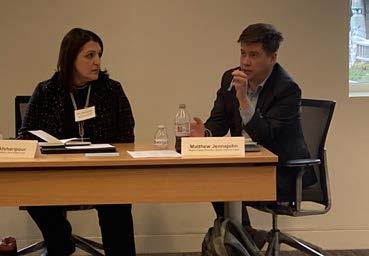
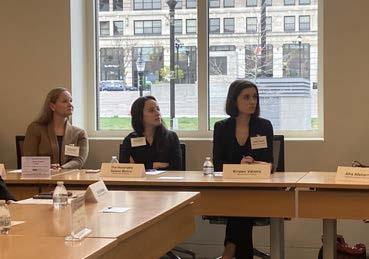
2 Hon. Loretta Preska, U.S, District Court for the Southern District of New York
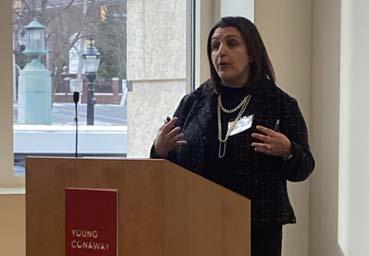


3 Sharon Nelles, Sullivan & Cromwell LLP
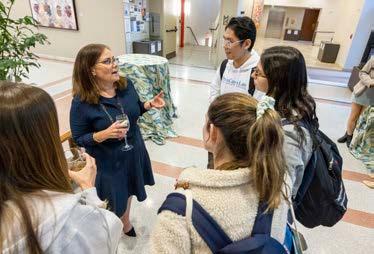
4 Hon. Bonnie W. David, Delaware Court of Chancery; Hon. Selena Molina, Delaware Court of Chancery; Kirsten Valania, Delaware Court of Chancery
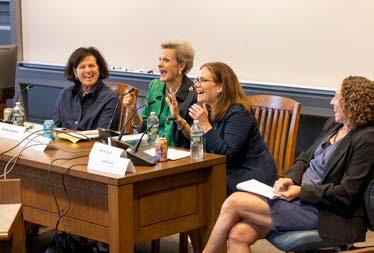
5 Lisa Fairfax, University of Pennsylvania Carey Law School; Jill E. Fisch, University of Pennsylvania Carey Law School; Atinuke Adediran, Fordham University School of Law
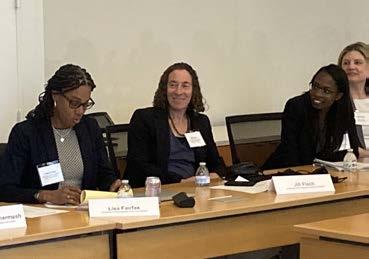
6 Afra Afsharipour, UC Davis School of Law; Matthew Jennejohn, Brigham Young University Law School

7 Afra Afsharipour, UC Davis School of Law
8 Christine Mackintosh, Grant & Eisenhofer
P.A.; Hon. Collins J. Seitz, Jr., Delaware Supreme Court
9 Matthew Jennejohn, Brigham Young University Law School

1 2 4 6 8 5 7 9 3 WOMEN IN BUSINESS INITIATIVE 53
ASSOCIATE FACULTY


1 David Abrams
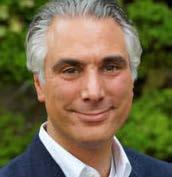
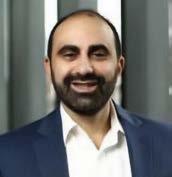

2 Tom Baker
3 William W. Bratton, Emeritus

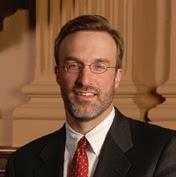
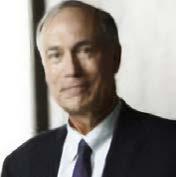

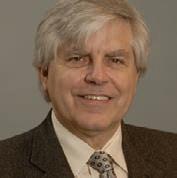
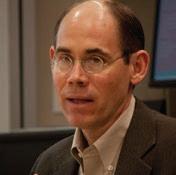
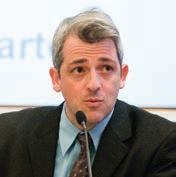
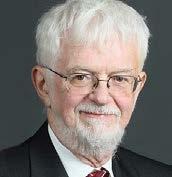

4 Vincent Buccola
5 Cary Coglianese
6 Brian D. Feinstein
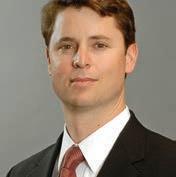
7 Vincent Glode
8 Itay Goldstein
9 Witold Henisz
10 Richard J. Herring

11 David Hoffman

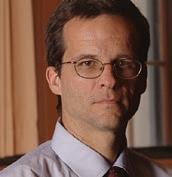
12 Robert W. Holthausen
13 Herbert Hovenkamp
14 Jonathan Klick
15 Michael S. Knoll
16 Sarah Light
17 Mary Hunter McDonnell
18 David K. Musto
19 Eric W. Orts
20 ShaunOseei-Owusu
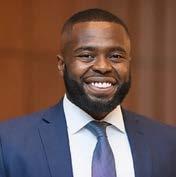

21 Gideon Parchomovsky
22 Andrew Postlewaite
23 Michael R. Roberts
24 Jennifer Rothman
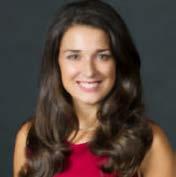
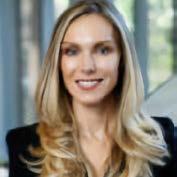


25 Amy Sepinwall
26 David A. Skeel, Jr.



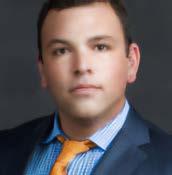
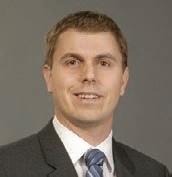




27 Christina Skinner
28 Lucian Taylor
29 Susan M. Wachter

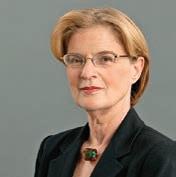
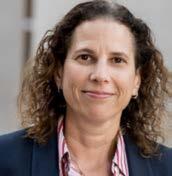

30 Polk Wagner
31 Shelley Welton
32 Kevin Werbach
33 Tess Wilkinson-Ryan
34 Bilge Yilmaz
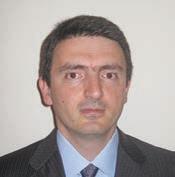
35 Christopher Yoo
36 David Zaring

1 6 11 16 21 26 31 36 2 7 12 17 22 27 32 3 8 13 18 23 28 33 4 9 14 19 24 29 34 5 10 15 20 25 30 35 ASSOCIATE FACULTY 55
ASSOCIATE FACULTY
ILE CO-DIRECTORS
Jill
Fisch
 Saul A. Fox Distinguished Professor of Business Law; Co-Director, Institute for Law & Economics
Saul A. Fox Distinguished Professor of Business Law; Co-Director, Institute for Law & Economics
Professor Fisch teaches and writes about corporate governance, business litigation, and securities regulation. Her recent work has focused on ESG, institutional investors and shareholder voting. Before joining the Penn faculty in 2008, she held the T.J. Maloney Chair in Business Law at Fordham Law School and served as founding director of the Fordham Corporate Law Center. She holds joint (courtesy) appointments with the Wharton Department of Finance and the Department of Legal Studies. She has also been a visiting professor at Harvard Law School, Columbia Law School, Georgetown University Law Center, and UC Berkeley Law School. In 2022 she won the University of Pennsylvania’s Lindback Award for Distinguished Teaching.
Prior to entering academia, Professor Fisch practiced law with the U.S. Department of Justice and the New York o ce of Cleary, Gottlieb, Steen & Hamilton LLP. Professor Fisch is an associate reporter for the American Law Institute’s Restatement of Corporate Governance. She received her BA in mathematics from Cornell University and her JD from Yale Law School.
Elizabeth Pollman
Professor of Law; Co-Director, Institute for Law & Economics
Professor Pollman is an expert on corporate law, governance, and rights. She teaches and writes on a wide variety of topics in business law, with a particular focus on corporate governance, purpose, and personhood, as well as startups, entrepreneurship, and law and technology. Her recent work has examined the system of U.S. public company governance, venture-backed startups, securities fraud, director oversight liability, corporate disobedience, companies that have business models aimed at changing the law, the trading of private company stock, corporate privacy, and the history of corporate constitutional rights. She is an active member of the Corporate Laws Committee of the American Bar Association and has served on the National Business Law Scholars Conference Board and the American Association of Law Schools Business Associations Executive Committee.
Before joining the Penn Carey Law faculty, Professor Pollman taught at Loyola Law School, Los Angeles, and was a visiting professor at the University of Sydney and UC Berkeley School of Law. She was previously a fellow at the Rock Center for Corporate Governance at Stanford Law School. She practiced law at Latham & Watkins LLP in Silicon Valley and Los Angeles and served as a clerk for the Honorable Raymond C. Fisher of the Ninth Circuit Court of Appeals. She earned both her BA and JD, with distinction, from Stanford University.
Lisa M. Fairfax
Presidential Professor of Law; Co-Director, Institute for Law & Economics
Professor Fairfax’s research and scholarly interests include matters related to corporate and board governance, board duciary duties, board-shareholder engagement, board composition and diversity, corporate focus on ESG, shareholder activism and engagement, a nity fraud, and securities fraud. Before joining the Penn Carey Law faculty, she was the Alexander Hamilton Professor of Business Law at the George Washington University Law School and served as the founding director of GW’s Corporate Law and Governance Initiative. Professor Fairfax is a member of the American Law Institute (ALI) and ALI’s Advisory Group for the Restatement of Law, Corporate Governance. She serves on the board of the Institute for Law and Economic Policy (ILEP), the Securities and Exchange Commission Historical Society, and DirectWomen, an organization aimed at increasing public company board diversity. She formerly served on the Investor Advisory Committee of the Securities and Exchange Commission, the National Adjudicatory Council of the Financial Industry Regulation Authority (FINRA), and FINRA’s NASDAQ Market Regulation Committee. Professor Fairfax is a former member of the Committee on Corporate Laws of the American Bar Association and a former chair of both the Securities Regulation Section and Business Associations Section of the American Association of Law Schools. Prior to GW, Professor Fairfax was a Professor of Law and Director of the Business Law Program at the University of Maryland School of Law. Before entering academia, Professor Fairfax practiced corporate and securities law at Ropes & Gray LLP. Professor Fairfax graduated from Harvard Law School and Harvard College with honors.
ASSOCIATE FACULTY
David Abrams
Professor of Law, Business Economics and Public Policy
David Abrams is Professor of Law, Business Economics and Public Policy at the University of Pennsylvania Carey Law School and e Wharton School. He joined the Penn faculty in 2008 a er serving as the Olin Fellow in Law and Economics at the University of Chicago. He earned his PhD in Economics from the Massachusetts Institute of Technology in 2006, his Master’s in Physics from Stanford in 2001, and his Bachelor’s in Physics from Harvard in 1998. He is a Board Member and past-President of the Society of Empirical Legal Studies, and former chair of the Law and Economics section of the American Association of Law Schools. His research interests include Intellectual Property, Corporate Finance, Health Economics, and the Law and Economics of Crime. Prior to his academic career, Professor Abrams worked as a trader and quantitative analyst at D. E. Shaw and Co.
56 INSTITUTE FOR LAW & ECONOMICS
Tom Baker

William Maul Measey Professor of Law and Health Sciences
Tom Baker’s work explores insurance, risk, and responsibility in a wide variety of settings, using methods and perspectives drawn from economics, sociology, psychology, and history. His current research examines legal and institutional issues related to secondary insurance markets, insurance for cyber-related risks, and digital nancial advice, as well as the empirical study of insurance litigation. His most recent article, A New Framework for the Relationship Between Government and Insurance, with Lessons for Ransomware Insurance, uses a case study method to demonstrate the pervasive involvement of government in private insurance markets that extends well beyond the activities traditionally understood as insurance regulation. He has secondary appointments in the Business Economics and Public Policy and Healthcare Management Departments at e Wharton School. He is the Reporter for the American Law Institute's Restatement of e Law School Liability Insurance and a co-founder of Picwell, a health data analytics company that predicts health expenses and helps match individuals to the best insurance plan. In August 2013, he received the Robert B. McKay award, a lifetime scholarly achievement award given by the Tort Trial and Insurance Practice Section of the American Bar Association. He was the Connecticut Mutual Professor and Director of the Insurance Law Center at the University of Connecticut before joining the Penn Carey Law faculty in 2008. He clerked for U.S. Court of Appeals Judge Juan Torruella and practiced with the rm of Covington & Burling LLP.
William W. Bratton
Nicholas F. Gallicchio Professor of Law, Emeritus
Professor Bratton served as Co-Director of ILE from 2010 to 2020, when he took emeritus status. He is presently the de la Cruz Chair in Law & Economics at the University of Miami School of Law. He graduated in 1976 from Columbia Law School where he was articles editor of the Law Review and a James Kent Scholar. He clerked for the Honorable William H. Timbers on the U.S. Court of Appeals for the Second Circuit and practiced for several years at Debevoise & Plimpton LLP in New York. He served on the Cardozo, Rutgers, and George Washington law faculties before joining the faculty of the Georgetown University Law Center, where he was the Peter P. Weidenbruch, Jr., Professor of Business Law. He also has been the Unilever Visiting Professor at the Faculty of Law of the University of Leiden, the Simizu Visiting Professor at the Faculty of Law of the London School of Economics, and a visiting professor at the Duke and Stanford law schools. He is a Research Associate of the European Corporate Governance Institute and in 2010 was the Anton Philips Professor at the faculty of law of the University of Tilburg. He has published many articles and book chapters on topics in corporate law, the theory of the rm, law and economics, and legal history, and is the editor of the leading law school casebook on corporate nance.
Vincent Buccola
Associate Professor of Legal Studies & Business Ethics
Vince Buccola is an associate professor at e Wharton School, where he studies corporate nancial law, especially as it pertains to distress, reorganization, and bankruptcy. Before joining the Wharton faculty, he was a Bigelow Fellow at the University of Chicago Law School. He clerked for e Honorable Frank H. Easterbrook, of the U.S. Court of Appeals for the Seventh Circuit, and was a trial lawyer at Bartlit Beck LLP. He is a graduate of the University of Chicago Law School (JD) and Wesleyan University (BA).
Cary Coglianese
Edward B. Shils Professor of Law and Professor of Political Science; Director, Penn Program on Regulation
Cary Coglianese specializes in the study of administrative law and regulatory processes, with an emphasis on the empirical assessment of alternative processes and strategies and the role of public participation, technology, and business-government relations in policy-making. He is the founder of the Law & Society Association’s international collaborative research network on regulatory governance, a fellow of the American Bar Foundation, chair of the rulemaking committee of the Administrative Conference of the United States, and chair of a National Academy of Sciences committee on statutory authority on maritime transportation. He is also a founder of the peer-reviewed journal Regulation & Governance, for which he now serves on the editorial board, as well as the founder and faculty advisor to e Regulatory Review, a daily publication of regulatory analysis and commentary. Coglianese received his JD, MPP, and PhD in political science from the University of Michigan, and for 12 years served on the faculty of the John F. Kennedy School of Government at Harvard University, where he founded and chaired the Regulatory Policy Program within the School’s Mossavar-Rahmani Center for Business and Government. He has also been a visiting professor of law at Stanford University and Vanderbilt University and an a liated scholar at the Harvard Law School. Previously he served as the Associate Dean and then Deputy Dean for Academic A airs at Penn Carey Law.
Brian D. Feinstein
Assistant Professor of Legal Studies & Business Ethics, The Wharton School
Brian D. Feinstein examines how the structure of nancial regulators and other government agencies that regulate business a ects outcomes. A political scientist and lawyer by training, Dr. Feinstein’s incorporates into his research insights from administrative law and the social sciences. His scholarship has been published in the Columbia Law Review, Journal of Empirical Legal Studies, Journal of Financial Regulation, and University of Pennsylvania Law Review, among other journals, and has been featured in e New York Times, e Wall Street Journal, and other national publications.
Claudine Gartenberg
Assistant Professor of Management, The Wharton School
Professor Claudine Gartenberg received a BA from Harvard College, and a DBA and MBA from Harvard Business School, where she graduated as a Baker Scholar. Her research focuses on corporate purpose, corporate ownership, and compensation, and the implications of each for rm strategy and competitiveness. Her work has been published in top academic journals, including Management Science, Organization Science, and Strategic Management Journal . She is an associate editor at Management Science and serves on the editorial boards of Strategic Management Journal and Strategy of Business Science. She joined Wharton in 2017 from the faculty of the NYU Stern School of Business. Prior to academia, Professor Gartenberg was an account manager at a business consulting rm, working with clients such as PG&E, Chevron, Hallmark Cards, Wells Fargo, and Bank of America.
ASSOCIATE FACULTY 57
ASSOCIATE FACULTY
Vincent Glode
Pasi

M. Hamalainen Associate Professor of Finance, The Wharton School
Vincent Glode is the Pasi H. Hamalainen Professor of Finance at the University of Pennsylvania. He joined e Wharton School in July 2009 a er earning his PhD in nance from Carnegie Mellon University. His research is mainly theoretical and studies how nancial intermediaries create and allocate surplus in the economy.His papers have been published in leading academic journals such as the American Economic Review, Journal of Economic eory, Journal of Finance, Journal of Financial Economics, and Review of Financial Studies and have received best paper awards at multiple conferences. He is an associate editor at the Journal of Finance and at Management Science, an elected board member of the Northern Finance Association, and a past elected board member of the Finance eory Group. At Wharton, Professor Glode teaches valuation courses at the undergraduate, MBA, and executive education programs and has won several teaching awards. He has served on Wharton’s Teaching Excellence Committee, the Dean’s Advisory Council, and the MBA program’s Executive Committee.He is a CFA charterholder.
Itay Goldstein
Joel S. Ehrenkranz Family Professor of Finance, The Wharton School
Itay Goldstein is the Joel S. Ehrenkranz Family Professor and a Professor of Finance at e Wharton School of the University of Pennsylvania. He has been on the faculty of the e Wharton School since 2004 and holds a secondary appointment as a Professor of Economics.
Professor Goldstein currently serves as the Chairperson of the Finance Department and is also the Co-Director of the Wharton Initiative on Financial Policy and Regulation. Prior to that, he was the coordinator of the PhD program in Finance and, in 2022, received the Provost’s Award for Distinguished PhD Teaching and Mentoring.
Professor Goldstein earned his PhD in Economics in 2001 from Tel Aviv University. He is an expert in the areas of corporate nance, nancial institutions, and nancial markets, focusing on nancial fragility and crises and on the feedback e ects between rms and nancial markets. His research has been published in top academic journals, including the American Economic Review, Journal of Finance,Journal of Financial Economics, Journal of Political Economy,Review of Economic Studies, and Review of Financial Studies. His research has also been featured in e Economist, e Wall Street Journal, Financial Times, Bloomberg, Forbes, National Public Radio, and other popular press.
Professor Goldstein is the Executive Editor of the Review of Financial Studies and is a Research Associate at the National Bureau of Economic Research. He has also been the editor of the Finance Department in Management Science and of the Journal of Financial Intermediation
Professor Goldstein has served as an academic advisor in various policy institutions, including the Federal Reserve Banks of New York, Philadelphia, and Richmond, the Bank of Canada, the Bank for International Settlements, the Committee for Capital Markets Regulation, and the International Monetary Fund. He was the co-founder and the rst
president of the Finance eory Group and served as a director of the American Finance Association, the Western Finance Association, and the Financial Intermediation Research Society. He is a frequent speaker in academic and policy forums around the world and has been a keynote speaker in leading academic conferences.
Prior to joining Wharton, Professor Goldstein served on the faculty of Duke University’s Fuqua School of Business. He also worked in the Research Department of the Bank of Israel.
Lawrence A. Hamermesh
Executive Director, Institute for Law & Economics; Professor Emeritus, Widener University Delaware Law School (Senior Special Counsel, Securities and Exchange Commission Division of Corporation Finance, 2010–2011)
Professor Hamermesh received a BA from Haverford College in 1973, and a JD from Yale Law School in 1976. Professor Hamermesh practiced law with Morris, Nichols, Arsht & Tunnell LLP, Wilmington, Delaware, as an associate from 1976–84, and as a partner from 1985–94. Professor Hamermesh joined the faculty at Delaware Law School in 1994, where he served as the Ruby R. Vale Professor of Corporate and Business Law from 2005-2017, teaching and writing in the areas of corporate nance, mergers and acquisitions, securities regulation, business organizations, and professional responsibility. From 1995 to 2022, Professor Hamermesh was a member of the Council of the Corporation Law Section of the Delaware State Bar Association, which is responsible for the annual review and modernization of the Delaware General Corporation Law, and served as Chair of the Council from 2002 to 2004. In 2002 and 2003, he also served as the Reporter for the American Bar Association’s Task Force on Corporate Responsibility. From 2013 through 2020, he was the Reporter for the American Bar Association Business Law Section’s Corporate Laws Committee, which supervises the dra ing of the Model Business Corporation Act. He is a member of the American Law Institute and has been appointed as an adviser to the project to prepare theRestatement of the Law, Corporate Governance. Professor Hamermesh also served as chair of the Board of Directors of the Music School of Delaware from 2018 to 2020.
Richard J. Herring
Jacob Safra Professor of International Banking, Professor of Finance
Richard J. Herring is the founding director of the Wharton Financial Institutions Center, of which he served as a director from 1994-2020. From 2000 to 2006, he served as the Director of the Lauder Institute of International Management Studies, and from 1995 to 2000 he served as Vice Dean and Director of Wharton’s Undergraduate Division. During 2006, he was a Professorial Fellow at the Reserve Bank of New Zealand and Victoria University.
He is the author of more than 150 articles, monographs and books on various topics in nancial regulation, international banking, and international nance. At various times his research has been funded by grants from the National Science Foundation, the Ford Foundation, the Brookings Institution, the Sloan Foundation, and the Council on
58 INSTITUTE FOR LAW & ECONOMICS
Foreign Relations.
Outside the university, he was co-chair of the US Shadow Financial Regulatory Committee and Executive Director of the Financial Economist’s Roundtable, a member of the Advisory Board of the European Banking Report in Rome, the Institute for Financial Studies in Frankfurt, and the International Centre for Financial Regulation in London. In addition, he is a member of the FDIC Systemic Risk Advisory Committee and the Systemic Risk Council. He served as co-chair of the Multinational Banking seminar from 1992–2004 and was a Fellow of the World Economic Forum in Davos from 1992–95. He was a member of the Group of 30 task force on the reinsurance industry, as well as an earlier study group on international supervision and regulation. Currently, he is an independent director of the DWS mutual fund complex and has served on the predecessor Deutsche Asset Management and Bankers Trust boards since 1990. He was also an independent director of the Aberdeen Japan and Singapore Funds. Until November 2018, he was a director of Barclays Bank, Delaware.
Herring received his undergraduate degree from Oberlin College in 1968 and his PhD from Princeton University in 1973. He has been a member of the Finance Department since 1972. He is married, with two children, and lives in Bryn Mawr, Pennsylvania.
David Hoffman
Deputy Dean and William A. Schnader Professor of Law
Professor Dave Ho man is a widely-cited scholar who focuses his research and teaching on contract law. His work is typically interdisciplinary, built through collaboration with co-authors from a variety of elds. Current projects include the building and analysis of a dataset consisting of hundreds of thousands of Philadelphia residential leases, and associated evictions, as well as work developing a theory of externalities in contract doctrine. Other recent scholarship examined the technical and legal aspects of transactions occurring on and through blockchains.In the past, using qualitative and experimental methods, Ho man has focused on how individuals experience contracting online, and what extra-legal goals rms might seek to accomplish using the “terms and conditions.” He has also engaged in the national conversation sparked by the #metoo movement, publishing a paper with a Penn Carey Law student that argues that nondisclosure clauses in employment contracts violate public policy.
Robert W. Holthausen
The Nomura Company Professor, Professor of Accounting and Finance, The Wharton School
Professor Holthausen earned his PhD and his MBA at the University of Rochester. He joined e Wharton School in 1989. Prior to joining the Penn faculty, he was a member of the accounting and nance faculty at the Graduate School of Business of the University of Chicago. Professor Holthausen’s main teaching has focused on Corporate Valuation, a course he created for Wharton when he arrived and has been teaching ever since. Since 1998, he has served as the academic director of Wharton’s Mergers and Acquisitions program. Professor Holthausen’s research interests include the e ects of management compensation and governance structures on rm performance, the e ects of information on volume and prices, corporate restructuring and valuation, the e ects of large block sales on common stock prices, and numerous other topics. He is widely published in both nance and accounting journals. He is also the author of a detailed book on valuation entitled Corporate Valuation: eory, Evidence and Practice (2nd edition).
Herbert
 Hovenkamp
James G. Dinan University Professor
Hovenkamp
James G. Dinan University Professor
Herbert Hovenkamp is a Fellow of the American Academy of Arts and Sciences, and in 2008 won the Justice Department’s John Sherman Award for his lifetime contributions to antitrust law. In 2012, he served on the ABA’s Committee to advise the President-elect on antitrust matters. His principal writing includes Tech Monopoly (MIT Press, 2024); e Opening of American Law: Neoclassical Legal ought, 1870-1970 (Oxford, 2015); Antitrust Law (formerly with Phillip E. Areeda and Donald F. Turner) (22 vols., Aspen 2008-18); Principles of Antitrust (West, 2017); Creation Without Restraint: Promoting Liberty and Rivalry in Innovation (Oxford, 2012, with Bohannan); e Making of Competition Policy (Oxford, 2012, with Crane); e Antitrust Enterprise: Principle and Execution (Harvard, 2006); Federal Antitrust Policy: e Law of Competition and Its Practice (West, 5th ed. 2015); IP and Antitrust (2 vols., Aspen, 2017, with Janis, Lemley, Leslie, and Carrier); and Enterprise and American Law, 1836-1937 (Harvard, 1991). He has also co-authored casebooks in antitrust, property law, and a free open source casebook on innovation and competition policy. He has consulted on numerous antitrust cases for various government entities and private plainti s.
Jonathan Klick Professor of Law
Professor Klick earned his PhD in economics in 2002 and his JD in 2003 from George Mason University. He was the Je rey A. Stoops Professor of Law and Economics at Florida State University from 2005-2008. He has been a visiting professor at Columbia University, Northwestern University, the University of Southern California, and the University of Hamburg, and he was an Erskine Fellow in the Department of Finance and Economics at the University of Canterbury in Christchurch, New Zealand. Klick’s work lies in the area of empirical law and economics, and every year he thinks the Flyers will win the Stanley Cup.
Michael S. Knoll
Theodore K. Warner Professor of Law; Professor of Real Estate, The Wharton School; Co-Director, Center for Tax Law & Policy
Professor Knoll joined the Penn Carey Law and Wharton faculties from the University of Southern California Law School in 2000. He teaches courses in corporate nance and taxation in the Law School, e Wharton School, and the Wharton Executive Program. He is also an A liate of the Zell/ Lurie Real Estate Center at e Wharton School, and the editor of Forensic Economic Abstracts, an electronic journal published by the Social Science Research Network. Professor Knoll’s undergraduate and JD degrees are from the University of Chicago. He also earned a PhD in Economics at the University of Chicago. In 1990, he joined the USC Law faculty as an Assistant Professor and, in 1995, he was promoted to full Professor. He has been a Visiting Professor of Law at Georgetown (1999), Penn (1998–99), Virginia (2000), and Columbia (2009). Professor Knoll was also a John M. Olin Senior Research Scholar at Columbia University School of Law (1996–97), a Visiting Scholar at New York University Law School (1996–97), a John M. Olin Distinguished Visiting Professor of Law at Toronto University (1998), and a John Raneri Atax Fellow at the University of New South Wales (2011). Prior to entering teaching, he clerked for the Honorable Alex Kozinski on the U.S. Court of Appeals, Ninth Circuit, and served as legal advisor to the Vice Chairman of the U.S. International Trade Commission. He has published extensively in the elds of corporate nance, taxation, economics, and real estate nance.
ASSOCIATE FACULTY 59
ASSOCIATE FACULTY
Gideon
Parchomovsky
 Sarah E. Light
Associate Professor of Legal Studies & Business Ethics, The Wharton School
Sarah E. Light
Associate Professor of Legal Studies & Business Ethics, The Wharton School
Professor Light’s research examines issues at the intersection of environmental law, corporate sustainability, and business innovation. Her articles have addressed the regulatory implications of the rise of transportation platforms like Uber and Ly ; how business innovation, such as Microso ’s adoption of a private carbon fee, can be a form of private environmental governance; and the U.S. military’s role in stimulating private technological innovation to reduce fossil fuel use. Her articles have appeared in the Stanford Law Review, Columbia Law Review, Duke Law Journal, UCLA Law Review, and Vanderbilt Law Review, among others.
In 2019 and 2018, Professor Light was awarded Wharton Teaching Excellence Awards. In 2017, Professor Light was awarded an Excellence in Teaching Award in the MBA Program. In 2016, Professor Light was one of ten faculty nominated by the MBA student body for the Helen Kardon Moss Anvil Award for Outstanding MBA Teaching.
David K. Musto
Ronald O. Perelman Professor in Finance, The Wharton School
David K. Musto is the Ronald O. Perelman Professor in Finance at e Wharton School, where he has been on the faculty since 1995. He has a BA from Yale University and a PhD from the University of Chicago, and between college and graduate school he worked for Roll and Ross Asset Management in Los Angeles. He is an Associate Editor of the Journal of Finance. Most of his work, both theoretical and empirical, is in the area of consumer nancial services, mutual funds and consumer credit in particular. He has also published work on corporate and political voting, option pricing, short selling, and cross-border taxation.
Eric W. Orts
Guardsmark Professor, Professor of Legal Studies & Business Ethics and Professor of Management
Appointed to the Wharton faculty in 1991, Orts was named Guardsmark Professor in 2001, and was faculty director of the Initiative for Global Environmental Leadership from 2007 to 2020. Professor Orts has held visiting appointments at Harvard University (Eugene P. Beard Faculty Fellow, Center for Ethics and the Professions); INSEAD European campus (Economics and Political Science area); NYU School of Law; University of Leuven (Fulbright Visiting Professor, law faculty); University of Michigan Law School; UCLA School of Law; University of California Santa Barbara, Bren School of Environmental Science and Management; University of Sydney Law School; and Tsinghua University (School of Economics and Management, Freeman Foundation Visiting Professor). He was an associate attorney at Paul, Weiss, Ri ind, Wharton & Garrison LLP from 1988 to 1990, and Chemical Bank Fellow in Corporate Social Responsibility at Columbia University School of Law in 1990-91.
Robert G. Fuller, Jr. Professor of Law
Professor Parchomovsky received his LLB from the Hebrew University of Jerusalem in 1993, his LLM from the University of California at Berkeley in 1995, and his SJD from Yale Law School in 1998. Prior to joining the Penn Carey Law faculty in fall 2002, Professor Parchomovsky served as an Associate Professor at Fordham Law School and a Visiting Lecturer at Yale Law School. His research interests include intellectual property law and property theory. His recent work focuses on unlocking synergies among sub- elds of intellectual property and devising innovative mechanisms for protecting property entitlements.
Andrew W. Postlewaite
Harry P. Kamen Professor of Economics, School of Arts and Sciences; Professor of Finance, The Wharton School
Professor Postlewaite received his PhD from Northwestern University in 1974 and joined the Penn faculty from the University of Illinois in 1980. He is past editor of American Economic Journal: Microeconomics, past editor of the International Economic Review and past co-editor of Econometrica . He is emeritus director of the National Bureau of Economic Research and has served on the Executive Committee of the American Economic Association. He has published widely in the areas of strategic behavior and industrial organization.
Michael R. Roberts
William H. Lawrence Professor of Finance, The Wharton School
Michael R. Roberts is the William H. Lawrence Professor and Professor of Finance at e Wharton School of the University of Pennsylvania, a Research Associate of the National Bureau of Economic Research, and an a liate of the Institute for Law & Economics and the Wharton Financial Institutions Center at the University of Pennsylvania. He also founded and heads the Wharton Financial Analytics initiative.
Professor Roberts’ research spans corporate nance, banking, and investments. Recent work has examined equity pricing anomalies, collateralized loan obligation (CLO) performance, and machine learning in investment banking. His research has received several awards including two Brattle Prizes for Distinguished Paper published in the Journal of Finance, a Jensen Prize for best paper on Corporate Finance and Organizations published in the Journal of Financial Economics, and Best Paper awards from the Financial Management Association, Southwestern Finance Association, Rodney L. White Center for Financial Research, and Jacobs-Levy Equity Management Center for Quantitative Financial Research. Professor Roberts has served on numerous journal editorial boards, including the Journal of Finance of which he was a co-editor.
In addition to his research, Professor Roberts is an acclaimed teacher. At e Wharton School, his accolades include the David W. Hauk Award, ve Excellence in Teaching awards, and multiple nominations for the Helen Kardon Moss Anvil Teaching Award. While at Duke University, he won the Daimler-Chrysler Core Teaching Award at the Fuqua School of Business.
60 INSTITUTE FOR LAW & ECONOMICS
He has taught undergraduate, MBA, PhD, and executive education courses in Finance, Economics, Statistics, and Data Analytics. Outside of academia, Professor Roberts has worked as a nancial engineer and consultant, providing service to many nancial and non nancial corporations as well as expert testimony in corporate legal matters.
Professor Roberts earned his BA in Economics from the University of California at San Diego, and his MA in Statistics and PhD in Economics from the University of California at Berkeley.
Jennifer Rothman
Nicholas F. Gallicchio Professor of Law
Jennifer E. Rothman is nationally recognized for her scholarship in the eld of intellectual property law. She is the leading expert on the right of publicity, and is frequently sought a er to consult on legislation, highpro le litigation, and the development of creative projects. Rothman holds a secondary appointment at the Annenberg School for Communication. In addition to focusing on con icts between intellectual property rights and other constitutionally protected rights, such as the freedom of speech, her scholarship also explores the intersections of tort and property law, particularly in the context of the right of publicity, copyright, and trademark and unfair competition law. Her current research focuses on the ways intellectual property law is employed to turn people into a form of property, as well as how it regulates the production and content of expression.
She created Rothman’s Roadmap to the Right of Publicity, an online resource, located at www.rightofpublicityroadmap.com, which provides a comprehensive analysis of state right of publicity laws and commentary on recent cases and legislation. Rothman is an elected member of the American Law Institute and an adviser on the Restatement of the Law ( ird) of Torts: Defamation and Privacy.
Rothman joined the Penn faculty a er serving as the William G. Coskran Chair at LMU Loyola Law School in Los Angeles, where she received the 2019-2020 David P. Leonard Faculty Service Award for outstanding teaching and service. Rothman was previously a member of the faculty at Washington University in St. Louis. She is also an a liated fellow at the Yale Information Society Project at Yale Law School.
Rothman received her AB from Princeton University where she received the Asher Hinds Book Prize and the Grace May Tilton Prize. Rothman received an MFA in lm production from the University of Southern California’s School of Cinematic Arts, where she directed an awardwinning documentary. Rothman received her JD from UCLA, where she graduated rst in her class and won the Jerry Pacht Memorial Constitutional Law Award for her scholarship in that eld. Rothman served as law clerk to the Honorable Marsha S. Berzon of the U.S. Court of Appeals for the Ninth Circuit in San Francisco.
Rothman has also worked in the lm industry, including a position in feature production at Paramount Pictures, and as an entertainment and intellectual property litigator in Los Angeles.
Amy Sepinwall
Associate Professor of Legal Studies and Business Ethics, The Wharton School

Professor Sepinwall has two research streams. e rst interrogates notions of complicity within institutions and in the commercial sphere. She is especially interested in cases where exercises of conscience threaten civic equality, as where businesses seek to refuse service to LGBTQ individuals. e second addresses the moral and legal status of inanimate entities, like the corporation or AI. Within that stream, she focuses in particular on
corporate constitutional rights and corporate criminal liability. Professor Sepinwall’s works have been published in venues such as the University of Chicago Law Review, Washington University Law Review, Minnesota Law Review, Hastings Law Journal, Journal of Corporation Law, Business Ethics Quarterly, and Philosophy Compass.
David A. Skeel, Jr.
S. Samuel Arsht Professor of Corporate Law
Professor Skeel joined the Penn faculty in 1999. He graduated in 1987 from the University of Virginia School of Law, where he was editor of the Virginia Law Review and a member of the Order of the Coif. He clerked for the Honorable Walter K. Stapleton on the U.S. Court of Appeals for the ird Circuit, and practiced for several years at Duane, Morris & Heckscher in Philadelphia, before joining the Temple University School of Law in 1990. Professor Skeel has also held visiting appointments at the law schools of the University of Wisconsin (1993-94), University of Virginia (spring 1994), University of Pennsylvania (fall 1997), Georgetown (fall 2004), NYU (fall 2013), and Harvard (spring 2015). Professor Skeel specializes in corporate and commercial law and has written widely on corporate law, bankruptcy, and sovereign debt. He has also written on law and religion, and poetry and law. He has served on the oversight board for Puerto Rico since 2016.
Christina Parajon Skinner Assistant Professor of Legal Studies & Business Ethics
Christina Parajon Skinner is an expert on nancial policy and regulation, with a focus on central banks and scal authorities. Her research pursues questions surrounding central bank mandates, monetary and scal policy, capitalism and nancial markets, and the constitutional separation-ofpowers. Professor Skinner’s work is international and comparative in scope, drawing on her experience as an academic and central bank lawyer in the United Kingdom. Her research has been published in the Columbia Law Review, Duke Law Journal,Vanderbilt Law Review, Harvard Business Law Review, and Georgetown Law Journal, among other leading academic journals. Professor Skinner has also contributed to nancial regulatory policy working groups, including those convened by the Federal Reserve Bank of New York, the Financial Stability Board, and the UK Banking Standards Board. She is presently an A liate Fellow at the Stigler Center, at the University of Chicago’s Booth School of Business and a research member of the European Corporate Governance Institute (ECGI).
Prior to joining the faculty at Wharton, Professor Skinner served as legal counsel at the Bank of England, in the Financial Stability Division of the Bank’s Legal Directorate. Previously, Professor Skinner was an Academic Visitor at the University of Oxford, Faculty of Law and a Visiting Fellow at the London School of Economics, Law Department. From 2014-2016, she was a post-doctoral fellow and lecturer in Law at Columbia Law School.
Professor Skinner received her JD from Yale Law School, and an AB from the School of Public and International A airs at Princeton University, with a concentration in international economics. She received certi cates of pro ciency in European Politics and Society and Spanish Language and Culture.
ASSOCIATE FACULTY 61
ASSOCIATE FACULTY
Lucian (Luke) Taylor
Associate Professor of Finance, The Wharton School

Luke Taylor earned his AB from Princeton University and MBA and PhD in Finance from the University of Chicago Booth School of Business.
Professor Taylor’s primary areas of research are empirical corporate nance and asset management. His research focuses on three main themes: sustainable investing, skill in fund management, and structural estimation in corporate nance. His articles have appeared in the Journal of Finance, Journal of Financial Economics, Review of Financial Studies, as well as nonacademic outlets such as e Wall Street Journal, CNN Money, and Forbes. His research has received the Fama/DFA Prize for best paper in the Journal of Financial Economics, the AQR Insight Award for Distinguished Paper, and others. Professor Taylor is an associate editor at the Journal of Financial Economics and Review of Finance
Since joining Wharton, Professor Taylor has taught “Venture Capital and the Finance of Innovation” (FNCE 250/750) to undergraduate, MBA, and executive MBA students.
Susan M. Wachter
Albert E. Sussman Professor of Real Estate, Professor of Finance, The Wharton School; Professor of City and Regional Planning, Penn Design; Co-Director, Penn Institute for Urban Research
From 1998 to 2001, as Assistant Secretary for Policy Development and Research, U.S. Department of Housing and Urban Development, Dr. Wachter served as the senior urban policy o cial and principal advisor to the Secretary on overall HUD policies and programs. At Wharton, Dr. Wachter was Chairperson of the Real Estate Department and Professor of Real Estate and Finance from July 1997 until her 1998 appointment to HUD. She founded and currently serves as Director of Wharton’s Geographical Information Systems Lab. Dr. Wachter served as a member of the Board of Directors of the Bene cial Corporation from 1985 to 1998 and of the MIG Residential REIT from 1994 to 1998 and of Momentum Realty from 2013 to 2017. She was the editor of Real Estate Economics from 1997 to 1999 and serves on the editorial boards for several real estate journals. Dr. Wachter has been a member of the Advanced Studies Institute of the Homer Hoyt Institute since 1989. Wachter co-founded and is co-director of the Institute for Urban Research at Penn. She is author of more than 150 scholarly publications and is the 2022 recipient of the Quigley Medal for Advancing Real Estate and Urban Economics as well as several awards for teaching excellence at e Wharton School. Dr. Wachter has been a member of the Financial Research Advisory Committee of the O ce of Financial Research of the U.S. Department of Treasury and currently serves on the Bureau of Economic Analysis, Department of Commerce, Advisory Committee.
Polk Wagner
Michael A. Fitts Professor of Law
Polk Wagner focuses his research and teaching in intellectual property law and policy, with a special interest in patent law.
He has written over 20 articles on topics ranging from an empirical analysis of judicial decision-making in the patent law to the First Amendment status of so ware programs. His work has appeared in the Stanford Law Review, Columbia Law Review, and University of Pennsylvania Law Review, among several others. He is the author (with Professor Craig Nard) of Patent Law: Concepts and Insights (Foundation Press 2008). He is a frequent lecturer on intellectual property topics worldwide.
Prior to joining the Penn Carey Law faculty in 2000, Wagner served as a clerk to the Honorable Raymond C. Clevenger III of the U.S. Court of Appeals for the Federal Circuit. He holds degrees from Stanford Law School, the University of Michigan, and the College of Charleston, and was the 1994-95 Roger M. Jones Fellow and the London School of Economics.
Shelley Welton
Presidential Distinguished Professor of Law and Energy Policy at Penn Carey Law and Kleinman Center for Energy Policy
Shelley Welton is the Presidential Distinguished Professor of Law and Energy Policy at the University of Pennsylvania Carey Law School where she holds an a liation with the Kleinman Center for Energy Policy in the Weitzman School as part of President Amy Gutmann’s 2019 commitment to build a multidisciplinary energy policy faculty a liated with the Kleinman Center.
At the Law School, Welton teaches environmental law and a climate change law seminar. She also teaches “Introduction to Energy Policy,” a university-wide graduate course, for the Kleinman Center on Energy Policy. Welton comes to Penn from the University of South Carolina School of Law, where she taught administrative law, energy law, environmental law and policy, environmental justice, and climate change law. Her scholarship has appeared in publications including the Yale Law Journal, Stanford Law Review, California Law Review, Columbia Law Review,Michigan Law Review, and Harvard Environmental Law Review.
Prior to academia, Welton worked as the deputy director of Columbia Law School’s Sabin Center for Climate Change Law. She also clerked for the Honorable David Trager of the Eastern District of New York and the Honorable Allyson Duncan of the Fourth Circuit. She received her PhD in law from Yale Law, her JD from NYU School of Law, a Master of Public Administration in environmental science and policy from Columbia University’s School of International and Public A airs, and her BA from the University of North Carolina at Chapel Hill.
62 INSTITUTE FOR LAW & ECONOMICS
Kevin Werbach
Liem Sioe Liong/First Pacific Company Professor, Professor of Legal Studies & Business Ethics
Werbach is Professor of Legal Studies and Business Ethics at e Wharton School, University of Pennsylvania, and founder of Supernova Group, a technology consulting and events rm. A longtime thought leader in communications and internet policy, he served on the Obama Administration’s Presidential Transition Team, and later was an expert advisor on broadband issues at both the Federal Communications Commission and the U.S. Department of Commerce. He is a pioneer in emerging elds such as gami cation (applying digital game design principles to business), algorithmic accountability, and blockchain. With his current focus on the business and legal implications of distributed ledger technology, he heads the Cryptoregulation initiative of the Zicklin Center for Business Ethics Research, bringing together regulators, experts, and business leaders from around the world.
Tess Wilkinson-Ryan Professor of Law and Psychology
Tess Wilkinson-Ryan L’05, G’06, PhD’08 studies the psychology of legal decision-making. Her research addresses the role of moral judgment in legal decision-making, with a particular focus on private contracts and negotiations.
She uses experimental methods from psychology and behavioral economics to ask how people draw on their moral intuitions to motivate or inform legal choices. Recent research topics include mortgage borrowing and default, retirement planning, contract precautions, and the cognitive and emotional response to breach of contract.
In 2012, Wilkinson-Ryan was awarded the A. Leo Levin Award for Excellence in Teaching an Introductory Course.
Christopher Yoo
John H. Chestnut Professor of Law, Communication, and Computer & Information Science; Founding Director, Center for Technology, Innovation & Competition
Christopher Yoo has emerged as one of the world’s leading authorities on law and technology. One of the most cited scholars in administrative and regulatory law as well as intellectual property, he has authored ve books and over 100 scholarly works.
His major research projects include investigating innovative ways to connect more people to the Internet; comparing antitrust law in China, Europe, and the U.S.; analyzing the technical determinants of optimal interoperability; promoting privacy and security for autonomous vehicles, medical devices, and the Internet’s routing architecture; and studying the regulation of Internet platforms. He has also created innovative joint degree programs designed to produce a new generation of professionals with advanced training in both law and engineering.
He is frequently called to testify before the U.S. Congress, Federal Communications Commission, Federal Trade Commission, Antitrust Division of the U.S. Department of Justice, foreign governments, and international organizations. He recently served as a member of the Federal Communication Commission’s Broadband Deployment Advisory Committee, the Board of Advisors for the American Law Institute’s Project on Principles of Law for Data Privacy and the Restatement of Principles for a Data Economy, and as co-convener of the United Nations Internet Governance Forum’s Initiative on Connecting and Enabling the Next Billions.
Before entering academia, he served as a law clerk to Justice Anthony M. Kennedy of the Supreme Court of the United States and the Honorable A. Raymond Randolph L’69 of the U.S. Court of Appeals for the D.C. Circuit.
Bilge Yilmaz
Wharton Private Equity Professor, Professor of Finance, The Wharton School
Prior to his current appointment, Bilge Yılmaz taught at the Graduate School of Business, Stanford University, and held visiting positions at the University of Chicago and INSEAD. He received his BS degrees in Electrical Engineering and Physics from Bo˘gaziçi University, and his PhD in Economics from Princeton University. His research focuses on corporate nance, political economy and game theory. Recently, he has written articles on corporate governance, credit rating agencies, hedge funds, private equity, security design, short-selling constraints, corporate bankruptcy, predatory lending, and strategic voting.
David Zaring
Elizabeth F. Putzel Professor of Legal Studies & Business Ethics, The Wharton School
David Zaring writes at the intersection of nancial regulation, international law, and administrative law. He has written over 50 articles on those subjects, along with a monograph on e Globalized Governance of Finance. In addition to teaching at Wharton, he has taught at the Bucerius, Cambridge, Penn, Vanderbilt, and Washington & Lee law schools.

ASSOCIATE FACULTY 63
PUBLICATIONS AND PAPERS
Listed below is a sampling of recently published papers and work in progress by members of the Associate Faculty of the Institute for Law & Economics. ILE maintains a series of research papers and provides copies—electronic or paper—to interested parties upon request to ile@law.upenn.edu.
e Institute is a member of the Legal Scholarship Network (LSN), a subset of the Social Science Research Network. Current ILE research papers are posted in the University of Pennsylvania Law & Economics Research Paper Series on the LSN Web site. Abstracts as well as complete papers can be downloaded (www.ssrn.com/link/pennlawecon. html).
Faculty appointments are in the University of Pennsylvania Carey Law School unless otherwise noted.
Co-Directors
Jill E. Fisch, Saul A. Fox Distinguished Professor of Business Law; Co-Director, Institute for Law & Economics
What’s in a Name? ESG Mutual Funds and the SEC’s Names Rule (with Adriana Robertson), __ S. Cal. L. Rev. __ (forthcoming 2023)
Corporate Democracy and the Intermediary Voting Dilemma (with Jeff Schwartz, 102 Tex. L. Rev. (forthcoming 2023).
Extending Dual Class Stock: A Proposal, (with David Berger and Steven Davidoff Solomon), __ Theoretical Inquiries In Law __ (forthcoming 2023).
Promoting Corporate Diversity: The Uncertain Role of Institutional Investors, Seattle L. Rev. (forthcoming 2023).
Managers’ Private Communications with Analysts: The Effect of SEC v. Siebel Systems Inc. (with Ashiq Ali, Michael Durney & Hoyoun Kyung), __ Contemp. Acct. Res. __ (forthcoming 2023).
The Uncertain Stewardship Potential of Index Funds, in Global Shareholder Stewardship Complexities, Challenges And Possibilities (Dionysia Katelouzou & Dan W. Puchniak eds., Cambridge University Press 2022).
Do ESG Mutual Funds Deliver on Their Promises? (with Q. Curtis & A. Robertson), 120 Mich. L. Rev 393 (2021) (selected by the Corporate Practice Commentator as one of the Top Ten Corporate and Securities Articles of 2021).
Stealth Governance: Shareholder Agreements and Private Ordering, 99 Wash. U. L. Rev. 913 (2021)
Mutual Fund Stewardship and the Empty Voting Problem, 16 Brook. J. Corp., Fin. & Com. L. 71 (2021).
Should Corporations Have a Purpose? (with S. Davidoff Solomon), 99 Tex. L. Rev. 1309 (2021).
Power and Statistical Significance in Securities Fraud Litigation (with J. Gelbach), 11 Harv. Bus. L. Rev. 55 (2021).
Synthetic Governance (with B. Hyun Ahn, P. Patatoukas & S. Davidoff Solomon), 2 Colum. Bus. L. Rev. 476 (2021).
Trust, Financial Literacy and Financial Market Participation (with J. Seligman), J. Pens. Econ. & Fin. 1-31 (2021).
The “Value of a Public Benefit Corporation (with S. Davidoff Solomon), in Research Handbook on Corporate Purpose and Personhood (Elizabeth Pollman & Robert Thompson eds., Edward Elgar Publishing 2021).
Can and Should Corporations Commit to a Voluntary Carbon Tax? in Business Law and the Transition To a Net Zero Economy (Andreas Engert, Luca Enriques, Georg Ringe, Umakanth Varottil & Thom Wetzer, eds., Bloomsberry Publishing 2021).
Shareholder Collaboration (with S. Sepe), 98 Tex. L. Rev. 863 (2020).
Defined Contribution Plans and the Challenge of Financial Illiteracy (with A. Lusardi & A. Hasler), 105 Cornell L. Rev. 741 (2020).
Elizabeth Pollman, Professor of Law; Co-Director, Institute for Law & Economics
The Rise of Regulatory Affairs in Innovative Startups, in The Cambridge Handbook on Law and Entrepreneurship in the United States (D. Gordon Smith, Brian Broughman & Christine Hurt eds., Cambridge University Press 2022).
The Supreme Court and the Pro-Business Paradox, 135 Harv. L. Rev. 220 (2021).
The Corporate Governance Machine (with D. Lund), 121 Colum. L. Rev 2563 (2021) (selected by the Corporate Practice Commentator as one of the Top Ten Corporate and Securities Articles of 2021).
Research Handbook on Corporate Purpose and Personhood (Elizabeth Pollman & Robert B. Thompson eds., Edward Elgar Publishing 2021).
Corporate Personhood and Limited Sovereignty, 74 Vand. L. Rev. 1727 (2021) (Symposium: “Professor Margaret Blair’s Contributions to Understanding the Role of Corporations in the Economy”).
The History and Revival of the Corporate Purpose Clause, 99 Tex. L. Rev. 1423 (2021) (Symposium: “Governance Wars: Contesting Power and Purpose in the 21st Century Corporation”).
Private Company Lies, 109 Geo. L. J. 353 (2020)
(selected by the Corporate Practice Commentator as one of the Top Ten Corporate and Securities Articles of 2020).
Fiduciary Law and the Preservation of Trust in Business Relationships (with B. Broughman & D. G. Smith), in Fiduciaries And Trust: Ethics, Politics, Economics And Law (P. B. Miller & M. Harding eds., Cambridge University Press 2020).
Business organizations: A Contemporary Approach (with A. Palmiter & F. Partnoy) (3d ed., West 2019).
Corporate Oversight and Disobedience, 72 Vand. L. Rev. 2013 (2019) (Symposium: "Corporate Accountability").
Corporate Disobedience, 68 Duke L.J. 709 (2019)
(selected by the Corporate Practice Commentator as one of the Top Ten Corporate and Securities Articles of 2019).
Startup Governance, 168 U. Pa. L. Rev. 155 (2019)

(selected by the Corporate Practice Commentator as one of the Top Ten Corporate and Securities Articles of 2019).
Tech, Regulatory Arbitrage, and Limits, 20 Eur. Bus. Org. L. Rev. 567 (2019) (Oxford Business Law
Symposium: “Centros and European Corporate Law: Twenty Years of Living Dangerously”).
Corporate Governance Beyond Economics, in Corporate Contract In Changing Times: Is The Law Keeping Up?
(S. Davidoff Solomon & R. Stuart Thomas eds., University of Chicago Press 2019).
Quasi Governments and Inchoate Law: Berle’s Vision of Limits on Corporate Power, 42 Seattle U. L. Rev. 617 (2019) (Berle X Symposium: “Berle and His World”).
Lisa M. Fairfax, Presidential Professor of Law; Co-Director, Institute for Law & Economics
Director and Officer Liability Under the Securities Law, in Research Handbook On Corporate Liability (Edward Elgar Publishing 2023).
Board Committee Charters and ESG Accountability, 12 Harv. Bus. L. Rev. (2022) .
Empowering Diversity Ambition, 75 Vand. L. Rev. En Banc 131 (2022).
Stakeholderism, Corporate Purpose and Credible Commitment, 108 Va. L. Rev. __ (2022).
Racial Reckoning with Economic Inequities, 106 Cornell L. Rev. online 68 (2021).
The Shareholder-Stakeholder Alliance: Exposing the Link between Shareholder Power and the Rise of a Corporate Social Purpose, in Research Handbook On Corporate Purpose And Personhood (Elizabeth Pollman & Robert Thompson, eds., Edward Elgar Publishing 2021).
Just Say Yes? The Fiduciary Duty Implications of Directorial Acquiescence, 106 Iowa L. Rev. 102 (2021).
Whitman and the Fiduciary Relationship Conundrum, 89 Fordham L. Rev. 409 (2020).
Associate Faculty
David Abrams, Professor of Law, Business Economics, and Public Policy
The Law and Economics of Stop-and-Frisk, 46 Loy. L. Rev. 369 (2014).
Tom Baker, William Maul Measey Professor of Law and Health Sciences
How Crime Shapes Insurance and Insurance Shapes Crime, (with Anja Shortland), J. Legal Analysis (forthcoming 2023).
Insurance and Enterprise: Cyber-Insurance for Ransomware (with Anja Shortland), Geneva Papers On Risk And Insurance (2022).
The Government Behind Insurance as Governance: Lessons for Ransomware Insurance (with Anja Shortland), __ Reg. & Governance __ (2022).
The Pandemic and the Past & Future of Insurance Law & Practice (with K. Abraham), 71 Depaul L. Rev. 1001 (Clifford Symposium)(2021).
Uncertainty > Risk: Lessons for Legal Thought from the Insurance Runoff Market, 62 B.C. L. Rev. 59 (reviewed in Jotwell)(2020).
William W. Bratton, Nicholas F. Gallicchio Professor of Law, Emeritus
Special Interests at the Gate: The ALI Corporate Governance Project, 1978-1992, in ALI Centennial History, R. Gordon & A. Gold,eds.,(Oxford University Press 2023).
Team Production Revisited, 74 Vand. L. Rev. 1539 (2021).
Reconsidering the Evolutionary Erosion Account of Corporate Fiduciary Law, 76 Bus. Law. 1157 (2021).
Corporate Finance: Cases And Materials (Foundation Press, 9th ed., Foundation Press 2021).
Vincent Buccola, Associate Professor of Legal Studies & Business Ethics
Efficacious Answers to the Non-Pro Rata Workout, 171 U. Pa. L. Rev. 171 (forthcoming 2023).
Sponsor Control: A New Paradigm for Corporate Reorganization, 90 U. Chi. L. Rev. 1 (2023).
Unwritten Law and the Odd Ones Out. 131 Yale L. J. 1559 (2022).
Claim Durability and Bankruptcy’s Tort Problem, (with Joshua C. Macey), 38 Yale J. Reg. 766 (2021).
The Myth of Creditor Sabotage (with Jameson K. Mah & Tai Zhang), 87 U. Chi. L. Rev. 2029 (2020).
The Municipal Bond Cases Revisited (with Allison R. Buccola), Am. Bankr. L. J. 94: 591 (2020).
Cary Coglianese, Edward B. Shils Professor of Law and Professor of Political Science
Influence by Intimidation: Business Lobbying in the Regulatory Process (with A. Acs), __J. Of Law, Econ. And Organiz. __ (forthcoming).
Solving the Congressional Review Act’s Conundrum, Admin. L. Rev. __ (forthcoming)
Regulating Machine Learning: The Challenge of Heterogeneity, Tech. Reg. Chron. 17 (February 2023)
Building Better Compliance, 100 Tex. L. Rev. Online 192 (2022)
Algorithm vs. Algorithm (with A. Lai), 72 Duke L. J. 1281 (2022).
Antitrust by Algorithm (with A. Lai), 2 Stan. J. Of Computational Antitrust 1 (2022).
Algorithmic Administrative Justice (with S. Appel), in The Oxford Handbook Of Administrative Justice (Marc Hertogh, Richard Kirkham, Robert Thomas and Joe Tomlinson, eds., Oxford University Press 2022).
Compliance Management Systems: Do They Make a Difference? (with J. Nash), in Cambridge Handbook Of Compliance 571 (D. Sokol & B. van Rooij eds., Cambridge University Press 2021).
Unrules (with Gabriel Scheffler and Daniel E. Walters), 73 Stan. L. Rev. 885 (2021).
Brian D. Feinstein, Assistant Professor of Legal Studies & Business Ethics
Legitimizing Agencies __ U. Chi. L. Rev. (forthcoming).
Congress Is An It: A New View of Legislative History, Emory L. J. __ (forthcoming).
Disappearing Commissioners (with David Zaring), __ Iowa L. Rev. __ (forthcoming).
Submerged Independent Agencies (with Jennifer Nou), U. Pa. L. Rev. __ (forthcoming)
Divided Agencies (with Abby K. Wood), 95 S. Cal. L. Rev. 101 (2022).
Identity-Conscious Administrative Law: Lessons from Financial Regulators, 90 Geo. Wash. L. Rev. 1 (2022).
The Impact of Cryptocurrency Regulation on Trading Markets (with Kevin Werbach), 7 J. Fin. Reg. 48 (2021).
The Contingent Origins of Financial Legislation (with Peter Conti-Brown), 99 Wash. U. L. Rev. 145 (2021).
Outside Advisers Inside Agencies, (with Daniel J. Hemel), 108 Georgetown L. J. 1139 (2020).
Claudine Gartenberg, Assistant Professor of Management, The Wharton School
Corporate Purpose in Public and Private Firms (with George Serafeim), Mgmt. Sci. (2023).
The Firm as a Subsociety: Purpose, Justice, and the Theory of the Firm (with Todd Zenger), Org. Sci. (2023).
Corporate Purpose and Acquisitions (with Shun Yiu), Strat. Sci. (2023).
The Contingent Relationship between Purpose and Profits, Strat. Sci. (2023).
Organizations, Authority, and the Humanities (with Anita McGahan), J. Mgmt. Inquiry (2023).
Purpose-Driven Companies and Sustainability, Handbook on the Business of Sustainability (Edward Elgar Publishing 2022).
64 INSTITUTE FOR LAW & ECONOMICS
Can Purpose Deliver Better Corporate Governance? (with Mayer, C., Zingales, L., Bolton, P., L'Helias, S., Holmström, B., Polman, P., Flammer, C., Henderson, R., Gual, J. & Kingsmill, B.D.), 33(2) J. Appl. Corp. Fin. 41 (2021).
Competition and Pay Inequality Within and Between Firms (with Julie Wulf), 66(12) Mgmt. Sci. 66(12) 5925 (2020).
The Contingent Effect of Management Practices (with Steve Blader & Andrea Prat), 87(2) Rev. Econ. Stud. 721 (2020).
Vincent Glode, Associate Professor of Finance, The Wharton School
Private Renegotiations and Government Interventions in Credit Chains (with Christian Opp), __ Rev. Of Fin. Stud. __ (forthcoming).
To Pool or Not to Pool? Security Design in OTC Markets (with C. Opp and R. Sverchkov), __ J. Of Fin. Econ. (forthcoming).
Over-the-Counter vs. Limit-Order Markets: The Role of Traders' Expertise (with C. Opp), 33 Rev. Fin. Stud. 866 (Feb. 2020).
Itay Goldstein, Joel S. Ehrenkranz Family Professor of Finance, The Wharton School
Optimal Deposit Insurance (with Eduardo Davila), J. Polit. Econ. (forthcoming).
Bank Transparency and Deposit Flows (with Qi Chen, Zeqiong Huang, and Rahul Vashishtha), 146(2) J. Fin. Econ. 475 (2022).
Commodity Financialization and Information Transmission (with L. Yang), 77(5) J. Fin. 2613 (2022).
Financial Fragility in the COVID-19 Crisis: The Case of Investment Funds in Corporate Bond Markets (with A. Falato and A. Hortascu), 123 J. Mon. Econ. 35 (October 2021)
Mutual Fund Flows and Fluctuations in Credit and Business Cycles (with A. Ben-Rephael and J. Choi), 139:1 J. Fin. Econ. 84 (January 2021).
Credit Rating Inflation and Firms’ Investments (with C. Huang), 75:6 J. Fin. 2929 (December 2020).
Monetary Stimulus and Bank Lending, (with I. Chakraborty & A. MacKinlay), 136:1 J. Fin. Econ. 189 (April 2020).
Good Disclosure, Bad Disclosure (with L. Yang), 131:1 J. Fin. Econ. 118 (January 2019).
Lawrence A. Hamermesh, Professor Emeritus, Widener University Delaware Law School (Senior Special Counsel, Securities and Exchange Commission Division of Corporation Finance, 2010–2011)
Decoupling and Motivation: Re-Calibrating Standards of Fiduciary Review, Rethinking “Disinterested” Shareholder Decisions, and Deconstructing “De-SPACs” (with Henry T.C. Hu), 79 Bus. Law. __ (forthcoming)
Optimizing the World’s Leading Corporate Law: A Twenty-Year Retrospective and Look Ahead (with J. Jacobs & L. Strine, Jr.), 77 Bus. Law 321 (2022).
A Babe in the Woods: An Essay on Kirby Lumber and the Evolution of Corporate Law, 45 Del. J. Corp. L. 125 (2020).
Witold Henisz, Deloitte & Touche Professor of Management in Honor of Russell E. Palmer, former Managing Partner
Greenwash or Green: Does Bluffing or Impact Attract Inflows into ESG Equity Funds? (with Kevin Chuah and James McGlinch) (under review).
Reexamining the Win-Win: Relational Capital, Stakeholder Issue Salience, and the Contingent Benefits of Value Based Environmental, Social and Governance (ESG)
Strategies (with James McGlinch) (under review).
Webs of Influence: National Stakeholder Fields and Corporate Social Performance (with Katarzyna (Kate) Odziemkowska), 32 Org. Sci. 1 (2020)
The Political Economy of Financial Reform: De Jure Liberalization vs. De Facto Implementation (with Edward Mansfield), 63 Int’l. Stud. Qtly. 589 (2019).
Richard Herring, Jacob Safra Professor of International Banking, Professor of Finance, The Wharton School
Objectives and Challenges of Stress Testing (with T. Schuermann), in Handbook Of Financial Stress Testing, edited by J. Farmer, A. Kleinnijenhuis, T. Schuermann, and T. Wetzer, (Cambridge University Press 2022).
Corporate Complexity and Systemic Risk: A Progress Report, pp. 2-66 (with J. Carmassi), in The Oxford Handbook Of Banking (3rd ed.), edited by A. Berger, P. Molyneux, and J. Wilson, (Oxford University Press 2019).
David Hoffman, Deputy Dean and William A. Schnader Professor of Law, University of Pennsylvania Law School
Expecting Specific Performance (with Tess Wilkinson-Ryan and Emily Campbell), 98 N.Y.U. L. Rev. ___ (forthcoming).
Defeating the Empire of Forms, Va. L. Rev. (forthcoming).
Nonparty Interests In Contract Law (with C. Hwang and O. Ben-Shahar), 171 U. PENN. L. Rev. (forthcoming).
Leases as Forms (with A. Strezhnev), 19 J. Emp. Leg. Stud. 90 (2022).

The Social Cost of Contract (with C. Hwang),121 Colum. L. Rev. 979 (2021).
Transactional Scripts in Contract Stacks (with S. Cohney), 105 Minn. L. Rev. 319 (2020).
Robert W. Holthausen, The Nomura Securities Company Professor, Professor of Accounting and Finance, The Wharton School
Corporate Valuation: Theory, Evidence And Practice (with M. Zmijewski)(2nd ed., Cambridge Business Publishers 2020).
Herbert Hovenkamp, James G. Dinan University Professor
Monopolizing Digital Commerce, 64 William And Mary L. Rev. 1677 (2023).
The Antitrust Text, Ind. L.j. __ (2023) (forthcoming)
Antitrust Law (with the late P. Areeda & the late D. Turner) (New York: Kluwer/Aspen, 21 volumes, 4th & 5th eds., 2023).
The Power of Antitrust Personhood, U. Pa. J. Bus. L. (2023) (forthcoming).
Antitrust Interoperability Remedies, 123 Colum. L. Rev. Forum 1 (2023).
Worker Welfare and Antitrust, 90 U. Chi. L. Rev. 511 (2022).
The Invention of Antitrust, 96 S. Cal. L. Rev. 131. (2022).
Digital Cluster Markets, 2022 Colum. Bus. L. Rev. 246 (2022).
Competitive Harm from Vertical Mergers, 39 Rev. Indus. Org. ___ (forthcoming 2021).
Antitrust and Platform Monopoly, 130 Yale L.J. 1952 (2021).
Antitrust Harm and Causation, 99 Wash. Univ. L. Rev. 787 (2021).
The Looming Crisis in Antitrust Economics, 101 B.U. L. Rev. 489 (2021).
Framing the Chicago School of Antitrust Analysis (with F. Scott Morton), 168 U. Pa. L. Rev. 1843 (2020).
FRAND and Antitrust, 105 Cornell L. Rev. 1683 (2020).
Federal Antitrust Policy: The Law Of Competition And Its Practice (6th ed., West Academic Hornbook Series 2020).
Jonathan Klick, Professor of Law
When Should Governments Invest More in Nudging? Revisiting Benartzi et al. (2017) (with Avishalom Tor), 18 Rev. L. And Econ. 347(2022).
Sobering Up After the Seventh Inning: Alcohol and Crime Around the Ballpark (with John MacDonald), 37 J. Quant. Criminology 813 (2021).
The Ineffectiveness of ‘Observe and Report’ Patrols on Crime (with Marco Fabbri), 65 Int’l. Rev. Of L. And Econ. 105972 (2021).
Review of the Literature on Diversity on Corporate Boards, Amer. Enterprise Inst. Monograph (2021).
Deterrence and Liability for Intentional Torts (with John MacDonald), 63 Int’l Rev. L. And Econ. 105926 (2020).
Is the Digital Economy Too Concentrated?, Global Antitrust Institute, Report on the Digital Economy (2020).
Surveying the Not Yet Dead, 53 U.C. Davis L. Rev. 2647 (2020).
Michael S. Knoll, Theodore K. Warner Professor of Law, Professor of Real Estate, The Wharton School; Co-Director, Center for Tax Law & Policy
Bibb Balancing: Regulatory Mismatches under the Dormant Commerce Clause (with Ruth Mason), 91 Geo. Wash. L. Rev. 1 (2023).
National Pork is a Bibb Case, Not a Pike Case (with Ruth Mason), Geo. Wash. L. Rev. Arguendo 91 (2022).
Is it Kosher for California to Ban Out-of-State Pork?, The Regulatory Review (Dec. 5, 2022).
Is the Biggest Supreme Court Case This Term About Bacon? (with Ruth Mason), The Regulatory Review (November 14, 2022).
Tax Discrimination (with Elizabeth Adams and Ruth Mason), in Research Handbook On International Taxation (2021).
Steiner v. Utah: Designing a Constitutional Remedy (with R. Mason), 95 Tax Notes State 845 (2020).
Why the Supreme Court Should Grant Certiorari in Steiner v. Utah (with R. Mason), 95 Tax Notes State 377 (2020).
The Dormant Foreign Commerce Clause After Wynne (with R. Mason), 39 Va. Tax Rev. 357 (2020).
Sarah E. Light, Associate Professor of Legal Studies & Business Ethics, The Wharton School
Greenwashing and the First Amendment (with A. Shanor), 122 Colum. L. Rev. 2033 (2022).
Banks and Climate Governance (with C. Skinner), 121 Colum. L. Rev. 1895 (2021).
National Parks, Incorporated, 169 U. Pa. L. Rev. 33 (2020).
Insuring Nature (with C. Kousky), 69 Duke L. J. 323 (2019).
The Role of Universities in Private Environmental Governance Experimentalism, 34 Organiz. & Environ. 466 (2019).
The Law of the Corporation as Environmental Law, 71 Stan. L. Rev. 1 (2019).
Mary Hunter McDonnell, Associate Professor of Management, The Wharton School
When are organizations punished for organizational misconduct? A review and research agenda (with Samir Nurmohamed), 41 Research In Organizational Behavior 100150 (2022).
Bad Company: Shifts in Social Activists’ Tactics and Resources after Industry Crises (with Katarzyna (Kate) Odziemkowska and Elizabeth Pontikes), 32 Org. Sci. (2021).
Reexamining investor reaction to corporate political activity: A replication and extension of Werner (2017) (with Ishva Minefee and Timothy Werner), Strategic Management Journal (2020).
Take a Stand or Keep your Seat: Board Turnover after Social Movement Boycotts (with Adam Cobb), 63 Academy Of Management Journal 1028 (2020).
David K. Musto, Ronald O. Perelman Professor in Finance, The Wharton School
Contracts with (Social) Benefits: The Implementation of Impact Investing (with C. Geczy, J. Jeffers, and A. Tucker), 142 J. Fin Econ. 697 (forthcoming).
Commercial Paper, chapter in Handbook Of Fixed Income Securities, (9th Ed., Frank Fabozzi, ed., McGraw Hill 2021).
Robo-Advisors and the Growth of Index-Fund Investing, Fin Plan. Rev. ___ (forthcoming).
Eric W. Orts, Guardsmark Professor of Legal Studies and Business Ethics
Supreme Illegitimacy, 11 Reg. Rev.: In Depth 21 (2022).
The Climate Imperative for Business (with Brian Berkey), Cal. Mgmt. Rev. (Apr. 2021).
Collective Goods and the Court: A Theory of Constitutional Commodification (with Amy Sepinwall), 97 Wash. U. L. Rev. 637 (2020).
Shaun Ossei-Owusu, Presidential Professor of Law
New Penal Bureaucrats, 170 U. Pa. L. Rev. 1369 (2022).
Civil vs. Criminal Legal Aid, 94 S. Cal. L. Rev. 1561 (2021).
Kangaroo Courts, 134 Harv. L. Rev. Forum 200 (2021).
Racial Revisionism, 119 Mich. L. Rev. 1165 (2021).
The Racial Reckoning of Public Interest Law (with Atinuke (Tinu) Adediran), Cal. L. Rev.online (2021).
Velvet Rope Discrimination, 107 Va. L. Rev. 683 (2021). Police Quotas, 96 N.Y.U. L. Rev. 529 (2021).
Criminal Legal Education, 58 Am. Crim. L. Rev. 413 (2021)
Gideon Parchomovsky, Robert G. Fuller Jr. Professor of Law
Rationing Access (with Roy Baharad), 76 Vand. L. Rev. 215 (2023).
A Remedy for the Least Well Off (with A. Stein), 75 Vand. L. Rev. 239 (2022) .
Are All Risks Created Equal? Rethinking the Distinction Between Legal and Business Risk in Corporate Law (with A. Libson), 102 B.U. L. Rev. (forthcoming 2022).
Propertizing Fair Use (with A. Bell), 71 Va. L. Rev. 1255 (2021).
The Agent’s Problem (with A. Eckstein), 70 Duke L. J. 1509 (2021).
Corporate Law for Good People (with A. Libson), 115 Nw. U. L. Rev. 1125 (2021).
Reversing the Fortunes of Active Funds (with A. Libson), 99 Texas L. Rev. 581 (2021).
Andrew W. Postlewaite, Harry P. Kamen Professor of Economics, School of Arts and Sciences; Professor of Finance, The Wharton School
Using Monotonicity Restrictions to Identify Models with Partially Latent Covariates (with Minji Bang, Wayne Gao and Holger Sieg), J. Econometrics (forthcoming).
Economic Theory: Economics, Methods and Methodology (with Itzhak Gilboa, Larry Samuelson and David Schmeidler), Revue Économique (forthcoming).
Economic Theories and their Dueling Interpretations (with Itzhak Gilboa, Larry Samuelson and David Schmeidler), J. Econ. Methodology (forthcoming).
The Complexity of the Consumer Problem (with I. Gilboa and D. Schmeidler), 75(1) Res. In Econ. 96 (2021).
On the Welfare Cost of Consumption Fluctuations in the Presence of Memorable Goods (with R. Hai and D. Krueger), 11 Quantitative Econ. 1177 (2021).
Observational Implications of Non-Exponential Discounting (with S. Morris), 71(2) Revue Économique 313 (2020).
Michael R. Roberts, William H. Lawrence Professor of Finance, The Wharton School
This History of the Cross-Section of Stock Returns (with J. Linnainmaa),31:7 Rev. Fin. Stud. 2606 (2018).
Jennifer E. Rothman, Nicholas F. Gallicchio Professor of Law
Navigating the Identity Thicket: Trademark's Lost Theory of Personality, the Right of Publicity, and Preemption, 135 Harv. L. Rev. 1271 (2022).
The Right Of Publicity: Privacy Reimagined For A Public World (Harvard University. Press. 2018).
Amy Sepinwall, Associate Professor of Legal Studies and Business Ethics, The Wharton School
Shared Guilt Among Intimates, 30 Int. J. Phil. Stud. 202 (2022).
Taint and Tender: The Role of Money in Entanglement Jurisprudence, Notre Dame L. Rev. __ (forthcoming). Corporate Coverture, 47 J. Corp. L. 1071 (2022).
Breaking Down Bigotry,Book Review Essay of Linda McClain’s Who’s the Bigot? Constitutional Commentary (2022).
Artificial Moral Agents, Collective Responsibility: Perspectives From Political Philosophy And Social Ontology (Sade Hormio and Bill Wringe eds., Springer Publishing 2022).
PUBLICATIONS AND PAPERS 65
The Corporation in Our Polity, in Routledge Handbook Of Philosophy, Politics, And Economics (Ppe) (Christopher Melenovsky ed., forthcoming 2022). Feminist Rewrite of Citizens United: A Commentary, Feminist Judgments: Rewritten Corporate Law (Anne Choike, Usha Rodrigues, and Kelli Alces Williams eds., Cambridge University Press forthcoming 2022).
Conscience in Commerce, 53 Conn. L. Rev. 1 (2021). Collective Goods and the Court (with Eric Orts), 97 Wash. U. L. Rev. 637 (2020).
Amanda Shanor, Assistant Professor of Legal Studies & Business Ethics, The Wharton School Greenwashing and the First Amendment (with S. Light), 122 Colum. L. Rev. 2033 (2022).
David A. Skeel, Jr., S. Samuel Arsht Professor of Corporate Law
The Corporation as Trinity, 45 Seattle U. L. Rev. 155 (forthcoming 2022).
Pandemic Hope for Chapter 11 Financing, 131 Yale L.J. Forum 315 (2021).
Distorted Choice in Corporate Bankruptcy, 130 Yale L.J. 366 (2020).
Christine Parajon Skinner, Assistant Professor of Legal Studies & Business Ethics
Central Bank Digital Currency as New Public Money, 172 U. Pa. L. Rev. __ (forthcoming 2024).
Private Equity for the People, 171 U. Pa. L. Rev. (forthcoming 2023).
The Monetary Executive, 91 Geo. Wash. L. Rev. 164 (2023).
Coins and Cross-Border Payments, 60 Harv. J. Legis. (forthcoming 2023).
Sustainable Central Banking, (with Rosa Lastra) 63 Va. J. Int’l. L. __ (2023).
The Legitimacy of the Federal Reserve (with Carola Binder), 78 Stan. J. L., Bus. & Fin. (2023).
Laboratories of Central Banking (with Carola Binder), 41 Rev. Bkg. & Fin. L. (forthcoming 2023).
Banks and Climate Governance, (with Sarah Light), 122 Colum. L. Rev. 1895 (2021).
Central Bank Activism, 71 Duke L. J. 247 (2021).
Central Banks and Climate Change, 75 Vand. L. Rev 1301 (2021).
Cancelling Capitalism?, 97 Notre Dame L. Rev. 417 (2021).
Presidential Pendulums in Finance, 2020 Colum. Bus. L. Rev. 101 (2020).
Executive Override of Central Banks (with Michael Salib), 108 Geo. L. J. 905 (2020).
The Hardening of Corporate ESG (with Geneviève Helleringer), in Research Handbook On Eu Sustainable Finance (Kern Alexander, Matteo Gargantini & Michele Siri eds., forthcoming 2023).
Capture the Fed, in Populism And The Future Of The Fed (James A. Dorn ed.) (Cato Institute 2022).
Lucian (Luke) Taylor, Associate Professor of Finance, The Wharton School
Diseconomies of Scale in Active Management: Robust Evidence (with Lubos Pastor, Robert F. Stambaugh, & Min Zhu), __ Crit. Fin. Rev. __ (forthcoming).
Common Ownership and Innovation Efficiency (with Xuelin Li & Tong Liu), 147 J. Fin. Econ. 475 (2023).
Dissecting Green Returns (with Lubos Pastor & Robert
PUBLICATIONS AND PAPERS
F. Stambaugh), 146 J. Fin. Econ. 403 (2022).
Dissecting Bankruptcy Frictions (with W. Wei Dou, Wei Wang, and Wenyu Wang),142 J. Fin. Econ. 975 (2021).
Sustainable Investing in Equilibrium (with L. Pastor & R. Stambaugh), 142 J. Fin. Econ 550 (2021).
Fund Tradeoffs (with L. Pastor & R. Stambaugh), 138 J. Fin. Econ. 614 (2020).
Susan M. Wachter, Albert E. Sussman Professor of Real Estate, Professor of Finance, The Wharton School; Co-Director, Penn Institute for Urban Research
The Price Effects of Greening Vacant Lots: How Neighborhood Attributes Matter (with Desen Lin and Shane T. Jensen), Real Est. Econ. (2022).
Lending competition, regulation, and nontraditional mortgages (with A. Acolin and X. An), 50:2 Real Est. Econ. 340 (2022).
Government Sponsored Enterprises: Their Viability as Public Utilities (with R. Cooperstein and K. Fears), 31:1 Housing Pol’y Debate 33 (Feb. 2021).
The Mortgage Market as a Stimulus Channel in the Covid-19 Crisis (with E. Golding, L. Goodman, and R. Green), 31:1 Housing Pol’y Debate 66 (Feb. 2021).
Price Discovery Limits in the Credit Default Swap Market in the Financial Crisis (with A. Pavlov and E. Schwartz), 62:2 J. Real Est. Fin. & Econ. 165 (February 2021).
Flood Risk and the U.S. Housing Market (C. Kousky, H. Kunreuther, and M. LaCour-Little), 29:1 J. Housing Res. S23 (Nov. 2020).
Why the Ability-to-Repay Rule is Vital to Financial Security (with P. McCoy), 108:3 Geo. L. J. 649 (Mar. 2020).
Mortgage Risk Premiums during the Housing Bubble (with A. Levitin & D. Lin), 60 J. Real Est. Fin. & Econ. 421 (2020).
R. Polk Wagner, Michael A. Fitts Professor of Law Teva and the Process of Claim Construction (with L. Petherbridge), 67 Florida L. Rev. 379 (2018).
Poisoning the Next Apple? The America Invents Act and Individual Inventors (with David S. Abrams), 65 Stan. L. Rev. 517 (2013).
Unenforceeability (with Lee Petherbridge and James Rantanen), 71 Wash. & Lee L. Rev. 1751 (2013).
Shelley Welton, Presidential Distinguished Professor of Law and Energy Policy
‘Why change?’ Monopoly and competition in the southeastern U.S. electricity system (with Conor Harrison), Annals Of Amer. Assoc. Geog. (forthcoming 2023).
Neutralizing the Atmosphere, 132 Yale L. J. 171 (2022).
Grid Reliability through Clean Energy (with Josh Macey, Alex Klass, & Hannah Wiseman), 74 Stan. L. Rev. 969 (2022).
Rethinking Grid Governance for the Climate Change Era, 109 Calif. L. Rev. 209 (2021).
The Bounds of Energy Law, 62 B.C. L. Rev. 2239 (2021).
The States that Opted Out: Politics, Power, and Exceptionalism in the Quest for Electricity Deregulation in the United States South (with Conor Harrison), 79 Energy Research & Social Science 109247 (2021).
Making Federalism Work: Lessons from Health Care for the Green New Deal (with Jesse Cross), 55 U. Rich. L. Rev. 765 (2021).
Decarbonization in Democracy, 67 UCLA L. Rev. 56 (2020).
Kevin Werbach, Liem Sioe Liong/First Pacific Company Professor of Legal Studies & Business Ethics
Digital Asset Regulation: Peering into the Past, Peering into the Future, 64 Wm. & Mary L. Rev. 1251 (2023).
Systemically Important Technology (with David Zaring), 101 Tex. L. Rev. 811 (2023).
Orwell That Ends Well?: China’s Social Credit as Regulation for the Algorithmic Age, 2022 U. Ill. L. Rev. 1417 (2022).
The Impact of Regulatory Actions on Cryptocurrency Trading Activity (with Brian Feinstein), 7 J. Fin. Reg. 48 (2021).
The Global Challenge of Digital Asset Regulation (with Bianca Kremer), Techreg Chronicle (February 2022).
The Decentralized Autonomous Organization Toolkit (with David Gogel, Bianca Kremer, and Aiden Slavin), World Economic Forum (January 2023).

Decentralized Autonomous Organizations: Beyond the Hype (with David Gogel, Bianca Kremer, and Aiden Slavin), World Economic Forum (June 2022).
The Decentralized Finance (DEFI) Policy-Maker Toolkit (ed.), World Economic Forum (June 2021).
After The Digital Tornado: Networks, Architecture, Humanity (Cambridge University Press, 2020).
Tess Wilkinson-Ryan, Professor of Law and Psychology
Expecting Specific Performance (with David A. Hoffman and Emily Campbell), __ N.Y.U. L. Rev. (forthcoming).
Gender and Deception: Moral Perceptions and Legal Responses (with Gregory Klass), __ Nw. L. Rev. (forthcoming).
Justifying Bad Deals, 169 U. Pa. L. Rev. 193 (2020).
Bilge Yilmaz, Wharton Private Equity Professor, Professor of Finance, The Wharton School
Regulating a Model (with Y. Leitner), 131:2 J. Fin. Econ. 251 (2019).
Christopher Yoo, John H. Chestnut Professor of Law, Communication, and Computer & Information Science
The Political Dynamics of Legislative Reform: Potential Drivers of the Next Communications Statute (with Tiffany Keung), Berkeley Tech. L. J. (forthcoming).
Municipal fiber in the United States: A financial assessment (with Jesse Lambert and Timothy P. Pfenninger), 46:5 Telecomm. Policy (2022).
Due Process in Antitrust Enforcement: Normative and Comparative Perspectives (with Yong Huang, Thomas Fetzer, and Shan Jiang), 94 S. Cal. L. Rev. 843 (2021).
Self-Actualization and the Need to Create as a Limit on Copyright, in Cambridge Handbook Of Limitations And Exceptions In Copyright Law (Shyamkrishna Balganesh, Ng-Loy Wee Loon, & Haochen Sun eds., Cambridge University Press 2021).
Privacy vs. Transparency: Handling Protected Materials in Agency Rulemaking (with Kellen McCoy), 96 Ind. L. J. 1259 (2021).
The Post-Chicago Antitrust Revolution: A Retrospective, 168 U. Pa. L. Rev. 2145 (2020).
David Zaring, Elizabeth F. Putzel Professor of Legal Studies & Business Ethics, The Wharton School Banks, Corporatism, and Administrative Law, 108 Iowa L. Rev. 1303 (2023).
Systemically Important Technology (with K. Werbach), 102 Tex. L. Rev. 811 (2023).
Enforcement Against the Largest Banks, 7 J. Fin. Reg. 1 (2021).
The Government’s Economic Response to the COVID Crisis, 40 Rev. Banking & Fin. L. 315 (2020).
Towards Separation of Powers Realism, 37 Yale J. on Reg. 708 (2020).
Modernizing the Bank Charter, 61 Wm. & Mary L. Rev. 1397 (2020).
The Globalized Governance Of Finance (Cambridge University Press2020).
66 INSTITUTE FOR LAW & ECONOMICS
1 Lisa Fairfax, University of Pennsylvania Carey Law School; Kristen Johnson, Commodity Futures Trading Commission; Jill E. Fisch, University of Pennsylvania Carey Law School; Kevin Werbach, Professor of Legal Studies and Business Ethics at The Wharton School, University of Pennsylvania, and founder of Supernova Group
2 Jill E. Fisch, University of Pennsylvania Carey Law School; Lisa Fairfax, University of Pennsylvania Carey Law School; Lawrence Hamermesh, Institute for Law & Economics; Elizabeth Pollman, University of Pennsylvania Carey Law School

3 Elizabeth Pollman, University of Pennsylvania Carey Law School; Jill E. Fisch, University of Pennsylvania Carey Law School
4 Lisa Fairfax, University of Pennsylvania Carey Law School; David M. Silk, Wachtell Lipton Rosen & Katz

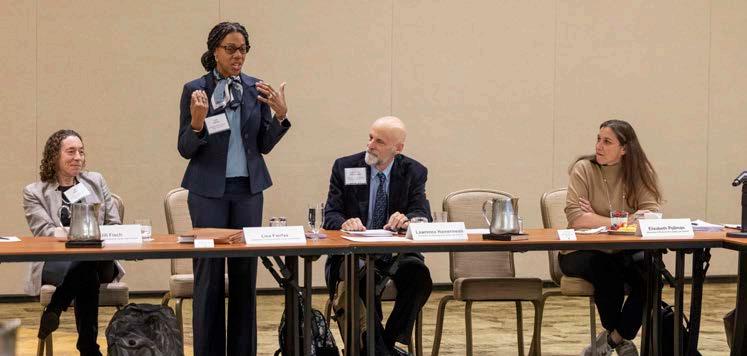

1 2 3 4 ASSOCIATE FACULTY 67


68 INSTITUTE FOR LAW & ECONOMICS
ILE CONTRIBUTORS 2022-2023
Funding for the Institute for Law & Economics comes from a diverse group of individuals, law rms, corporations, and foundations who endorse our work each year. We are pleased and privileged to recognize and thank the ILE contributors whose generous contributions underwrite the activities described in this report. We deeply appreciate their support and their active participation in institute programs.
Benefactors
$25,000 or above
Robert L. Friedman
Jay Clayton, Joseph Frumkin and Sullivan & Cromwell LLP
Wachtell, Lipton, Rosen & Katz
Sponsors
$15,000 to $24,999
Analysis Group
Apollo Management, L.P.
Bernstein Litowitz Berger & Grossmann LLP
Martin J. Bienenstock
Cadwalader, Wickersham & Taft LLP
Steven M. Cohen Cooley LLP
Cornerstone Research
Cravath, Swaine & Moore LLP

Debevoise & Plimpton LLP
Dechert LLP
Delaware Department of State
DuPont
Evercore
John G. Finley
FMC Corporation
Fried, Frank, Harris, Shriver + Jacobson LLP.
Joel E. Friedlander
Freshfields Bruckhaus Deringer
Eduardo Gallardo
Joseph D. Gatto
Goldman Sachs & Co.
Perry Golkin, Mrs. Donna O’Hara Golkin, and The Perry and Donna Golkin Family Foundation
Houlihan Lokey
Hughes Hubbard & Reed LLP
Innisfree M&A Incorporated
Sarkis Jebejian and Kirkland & Ellis LLP
Roy J. Katzovicz
Daniel Lee
Ted S. Lodge
MacKenzie Partners, Inc.
Merck & Co., Inc.
Morgan, Lewis & Bockius LLP
Morris, Nichols, Arsht & Tunnell LLP
Potter Anderson & Corroon, LLP
Richards, Layton & Finger, P.A.
Robinhood
Ropes & Gray LLP
Seyfarth Shaw LLP
Shearman & Sterling LLP
Sidley Austin LLP
Simpson Thacher & Bartlett LLP
Skadden, Arps, Slate, Meagher & Flom LLP
Vanguard
White & Case LLP
Wilson Sonsini Goodrich & Rosati
Young Conaway Stargatt & Taylor, LLP
Members
$5,000 to $14,999
Jeffrey M. Gorris
Myron J. Resnick
Kenneth W. Willman
Donors
$1,000 up to $4,999
Christopher Foulds
Mary J. Grendell
James A. Ounsworth
Helen P. Pudlin
Richard D. Smith
INSTITUTE INVESTORS 69
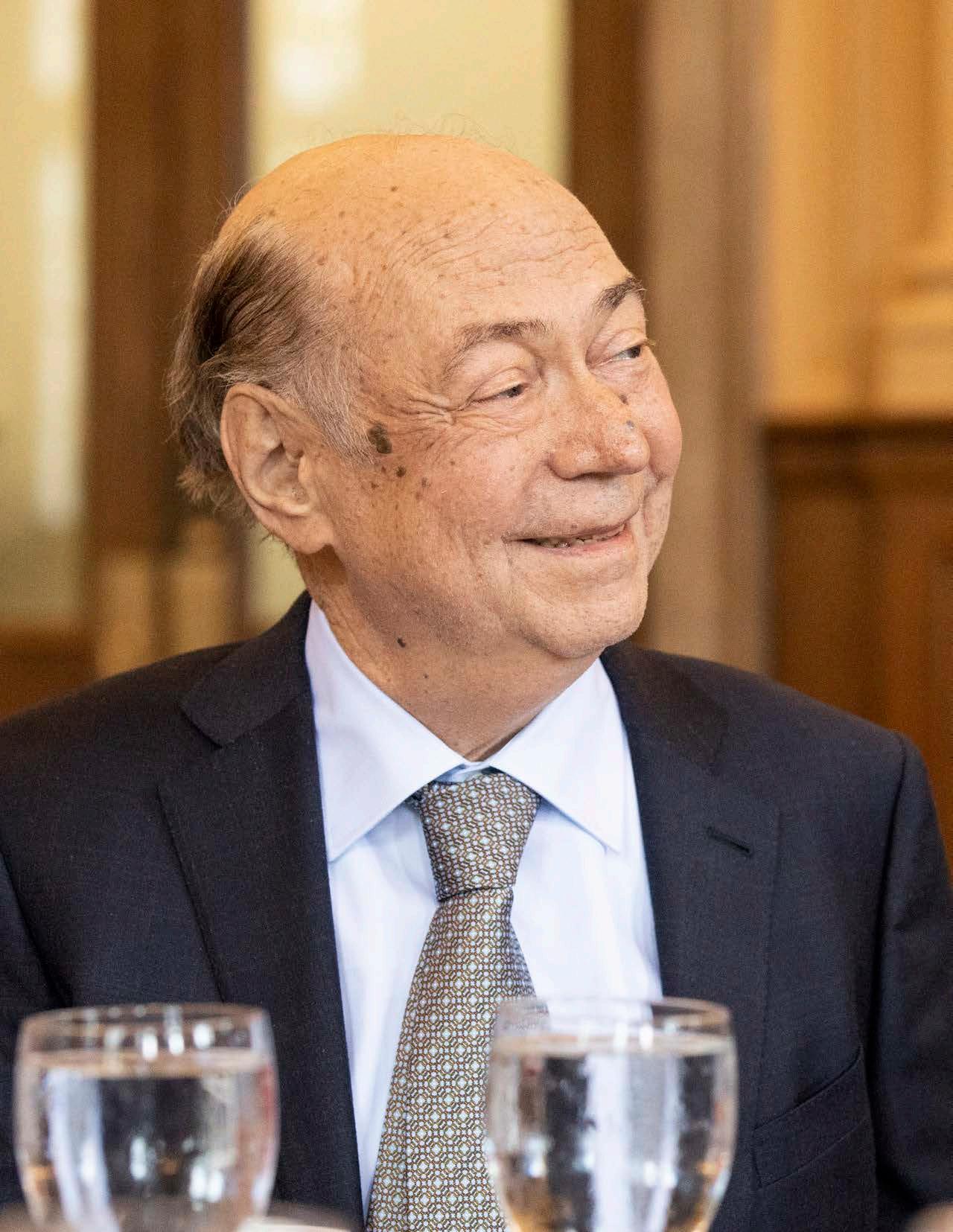
IN MEMORIAM


With profound sadness over his passing in September 2022, and with deep gratitude for his contributions to the creation and growth of ILE, we celebrated the memory of Professor Michael L. Wachter in a program at the Law School on March 24, 2023. e two-part program drew the attendance of numerous former and current faculty colleagues, practitioners, judges, and students. In the rst part of the program, a panel of Michael’s co-authors re ected on his scholarly contributions. In the second part, members of the ILE and Law School community and Michael’s family spoke a ectionately and admiringly of their experiences with Michael. We dedicate ourselves to continuing and building on the intellectual legacy he le to ILE.

IN MEMORIAM 71
MEMORIAL PANEL
The Scholarship Of Professor Michael Wachter: Co-Authors’ Perspectives
moderator
Lawrence A. Hamermesh, University of Pennsylvania Institute for Law & Economics
panelists
Cynthia Estlund, Catherine A. Rein Professor of Law New York University School of Law
Richard Kihlstrom, Ervin Miller-Arthur M. Freedman Professor Emeritus of Finance, Professor of Economics, The Wharton School
Edward Rock, Martin Lipton Professor of Law Co-Director, Institute for Corporate Governance & Finance, New York University School of Law
MEMORIAL
Welcome
Theodore Ruger, Dean and Bernard G. Segal Professor of Law
Remarks



Jessica Wachter, Dr. Bruce I. Jacobs Professor in Quantitative Finance, Professor of Finance
Jill E. Fisch, Saul A. Fox Distinguished Professor of Business Law; Co-Director, Institute for Law & Economics
Michael A. Fitts, President, Tulane University
Open Reflection
Closing
Susan M. Wachter, Albert Sussman Professor of Real Estate, Professor of Finance, Co-Director, Penn Institute for Urban Research
72 INSTITUTE FOR LAW & ECONOMICS



IN MEMORIAM 73
Institute for Law & Economics
University of Pennsylvania Carey Law School
3501 Sansom Street, Philadelphia, PA 19104–6204 215.898.7719, www.law.upenn.edu/ile/
September 2023
Presidential Professor of Law
215-746-2243
fairfaxl@law.upenn.edu

Jill E. Fisch, Co-Director Saul A. Fox Distinguished Professor of Business Law 215.746.3454
j sch@law.upenn.edu
Norman M. Powell, Executive Director 215.573.9659
nmpowell@law.upenn.edu
Elizabeth Pollman, Co-Director Professor of Law
215.898.4564

epollman@law.upenn.edu
ILE is a leading center for corporate law, governance, business, and nance. It is a joint initiative of the University of Pennsylvania Carey Law School, e Wharton School, and the Department of Economics.
Founded in 1980 by Professor Michael L. Wachter, the Institute was created to advance cross-disciplinary research and bring together academics, lawyers, business leaders, judges, policymakers, and regulators. Our innovative roundtables and conferences serve these goals by provoking in-depth discussions of timely issues. Public lectures and academic workshops further our mission to bridge the gap between academics and practitioners in our key areas of focus.
e Institute for Law & Economics has distinctive advantages. We draw on the research and teaching strengths of the Law School, e Wharton School, and the Department of Economics. Our geographic location is optimal, allowing us to bring together participants from Washington, Wilmington, and New York for full-day meetings and still get everyone home in time for bed. We have been able to call on the expertise of Law School alumni who occupy key positions in law, business, and government. And, critically, we have an extraordinarily distinguished cadre of board members and sponsors who are willing to give their time and expertise to make our programming a success.
In recent years, we have launched a variety of new projects and initiatives. e ILE/Wharton Finance Seminars promote scholarly engagement between law and nance scholars through a series of workshops and dinners. Each year, ILE collaborates with e Wharton School’s Financial Institutions Center and NYU’s Pollack Center for Law and Business to host the Penn/NYU Conference on Law and Finance, a agship for the promotion of interdisciplinary research. Our Junior Faculty Workshop, convened the day before our Fall Corporate Roundtable, o ers junior and mid-level academics the opportunity to obtain feedback on work in progress from scholars and practitioners with relevant subject matter expertise. e Women in Business Law Initiative aims to promote the advancement of women in the profession. e Delaware Corporate Law Resource Center provides unique resources about the development of corporate law, including oral histories of nearly a half century of iconic decisions of the Delaware courts. e Lipton Archive, collecting the memoranda and scholarship of Martin Lipton, provides another rich resource for research and teaching.
e Institute is led by outstanding Faculty and Directors with active participation and support from its Board of Advisors. Funding for ILE comes from a diverse group of corporations, law rms, foundations, and individuals who endorse our work each year.
Lisa M. Fairfax, Co-Director




















 Richard B. Aldridge Morgan, Lewis & Bockius LLP Philadelphia, PA
Marshall B. Babson Seyfarth Shaw LLP New York, NY
William D. Anderson, Jr. Senior Managing Director Evercore New York, NY
Martin J. Bienenstock Proskauer Rose LLP New York, NY
Daniel H. Burch Chairman & CEO MacKenzie Partners, Inc. New York, NY
Charles I. Cogut Co-Chair, 2008–2019 Former Partner Simpson Thacher & Bartlett LLP New York, NY
George A. Casey Shearman & Sterling LLP New York, NY
Steven M. Cohen Founding Member Blue Raven LLP New York, NY
Brian Fahrney Sidley Austin LLP Chicago, IL
John DiTomo Morris, Nichols, Arsht & Tunnell LLP Wilmington, DE
Raymond J. DiCamillo Richards, Layton & Finger, P.A. Wilmington, DE
John G. Finley Senior Managing Director and Chief Legal Officer The Blackstone Group L.P. New York, NY
Joel E. Friedlander Friedlander & Gorris, P.A. Wilmington, DE
Eric J. Friedman Executive Partner Skadden, Arps, Slate, Meagher & Flom LLP New York, NY
Robert L. Friedman Chair, 2001–2007 Senior Advisor The Blackstone Group L.P. New York, NY
Richard B. Aldridge Morgan, Lewis & Bockius LLP Philadelphia, PA
Marshall B. Babson Seyfarth Shaw LLP New York, NY
William D. Anderson, Jr. Senior Managing Director Evercore New York, NY
Martin J. Bienenstock Proskauer Rose LLP New York, NY
Daniel H. Burch Chairman & CEO MacKenzie Partners, Inc. New York, NY
Charles I. Cogut Co-Chair, 2008–2019 Former Partner Simpson Thacher & Bartlett LLP New York, NY
George A. Casey Shearman & Sterling LLP New York, NY
Steven M. Cohen Founding Member Blue Raven LLP New York, NY
Brian Fahrney Sidley Austin LLP Chicago, IL
John DiTomo Morris, Nichols, Arsht & Tunnell LLP Wilmington, DE
Raymond J. DiCamillo Richards, Layton & Finger, P.A. Wilmington, DE
John G. Finley Senior Managing Director and Chief Legal Officer The Blackstone Group L.P. New York, NY
Joel E. Friedlander Friedlander & Gorris, P.A. Wilmington, DE
Eric J. Friedman Executive Partner Skadden, Arps, Slate, Meagher & Flom LLP New York, NY
Robert L. Friedman Chair, 2001–2007 Senior Advisor The Blackstone Group L.P. New York, NY















 Daniel M. Gallagher Chief Legal Officer Robinhood Washington, D.C.
Eduardo Gallardo Paul Hastings LLP New York, NY
Joseph D. Gatto Founder and Managing Partner Orient Point Partners New York, NY
Perry Golkin Chief Executive Officer PPC Enterprises LLC New York, NY
Mark I. Greene Cravath, Swaine & Moore LLP New York, NY
Erik T. Hoover Senior Vice President and General Counsel DuPont de Nemours, Inc. Wilmington, DE
Sarkis Jebejian Kirkland & Ellis LLP New York, NY
Gaurav Jetley Managing Principal Analysis Group New York, NY
Roy J. Katzovicz Chairman Saddle Point Group, LLC New York, NY
Meredith Kotler Freshfields Bruckhaus Deringer US LLP New York, NY
Mark Lebovitch Bernstein Litowitz Berger & Grossmann LLP New York, NY
Daniel Lee Managing Director Moelis & Company Los Angeles, CA
Kenneth A. Lefkowitz Hughes Hubbard & Reed LLP New York, NY
Martin S. Lessner Young Conaway Stargatt & Taylor, LLP Wilmington, DE
Kristopher Knight Chief Deputy Secretary of State Delaware Department of State Wilmington, DE
Daniel M. Gallagher Chief Legal Officer Robinhood Washington, D.C.
Eduardo Gallardo Paul Hastings LLP New York, NY
Joseph D. Gatto Founder and Managing Partner Orient Point Partners New York, NY
Perry Golkin Chief Executive Officer PPC Enterprises LLC New York, NY
Mark I. Greene Cravath, Swaine & Moore LLP New York, NY
Erik T. Hoover Senior Vice President and General Counsel DuPont de Nemours, Inc. Wilmington, DE
Sarkis Jebejian Kirkland & Ellis LLP New York, NY
Gaurav Jetley Managing Principal Analysis Group New York, NY
Roy J. Katzovicz Chairman Saddle Point Group, LLC New York, NY
Meredith Kotler Freshfields Bruckhaus Deringer US LLP New York, NY
Mark Lebovitch Bernstein Litowitz Berger & Grossmann LLP New York, NY
Daniel Lee Managing Director Moelis & Company Los Angeles, CA
Kenneth A. Lefkowitz Hughes Hubbard & Reed LLP New York, NY
Martin S. Lessner Young Conaway Stargatt & Taylor, LLP Wilmington, DE
Kristopher Knight Chief Deputy Secretary of State Delaware Department of State Wilmington, DE















 Jeffrey J. Rosen Debevoise & Plimpton LLP New York, NY
Anne Robinson Managing Director, General Counsel and Corporate Secretary Vanguard Wayne, PA
Jean Park Cooley LLP New York, NY
Myron J. Resnick Retired Senior Vice President and Chief Investment Officer Allstate Insurance Company Northbrook, IL
Michael Reilly Executive Vice President, General Counsel and Secretary FMC Corporation Philadelphia, PA
Scott B. Luftglass Fried, Frank, Harris, Shriver + Jacobson LLP New York City, NY
Jennifer Marietta-Westberg Principal Cornerstone Research Washington, D.C.
William P. Mills Cadwalader, Wickersham & Taft LLP New York, NY
Mark A. Morton Potter Anderson & Corroon LLP Wilmington, DE
Jennifer Muller Managing Director Houlihan Lokey San Francisco, CA
Robert H. Mundheim Shearman & Sterling LLP New York, NY
Henry N. Nassau Dechert LLP Philadelphia, PA
Ian A. Nussbaum Latham & Watkins LLP New York, NY
James A. Ounsworth Managing Partner The S Consulting Group Philadelphia, PA
Morton A. Pierce White & Case LLP New York, NY
Jeffrey J. Rosen Debevoise & Plimpton LLP New York, NY
Anne Robinson Managing Director, General Counsel and Corporate Secretary Vanguard Wayne, PA
Jean Park Cooley LLP New York, NY
Myron J. Resnick Retired Senior Vice President and Chief Investment Officer Allstate Insurance Company Northbrook, IL
Michael Reilly Executive Vice President, General Counsel and Secretary FMC Corporation Philadelphia, PA
Scott B. Luftglass Fried, Frank, Harris, Shriver + Jacobson LLP New York City, NY
Jennifer Marietta-Westberg Principal Cornerstone Research Washington, D.C.
William P. Mills Cadwalader, Wickersham & Taft LLP New York, NY
Mark A. Morton Potter Anderson & Corroon LLP Wilmington, DE
Jennifer Muller Managing Director Houlihan Lokey San Francisco, CA
Robert H. Mundheim Shearman & Sterling LLP New York, NY
Henry N. Nassau Dechert LLP Philadelphia, PA
Ian A. Nussbaum Latham & Watkins LLP New York, NY
James A. Ounsworth Managing Partner The S Consulting Group Philadelphia, PA
Morton A. Pierce White & Case LLP New York, NY









 Jennifer Shotwell Founding Managing Director Innisfree M&A Incorporated New York, NY
Hon. Leo E. Strine, Jr. Chief Justice, Supreme Court of Delaware, 2014 -2019 Wachtell, Lipton, Rosen & Katz New York, NY
Peter L. Welsh Ropes & Gray LLP Boston, MA
Joseph A. Stern Managing Director; M&A Advisory General Counsel Goldman Sachs & Co. New York, NY
David M. Silk Co-Chair, 2019–2023 Wachtell, Lipton, Rosen & Katz New York, NY
John J. Suydam Chief Legal and Compliance Officer Apollo Global Management, LLC New York, NY
Jennifer Zachary Executive Vice President and General Counsel Merck & Co., Inc. Kenilworth, NJ
Amy L. Simmerman Wilson Sonsini Goodrich & Rosati Wilmington, DE
Hon. E. Norman Veasey Chief Justice, Supreme Court of Delaware, 1992-2004 Gordon, Fournaris & Mammarella, P.A. Wilmington, DE
Jennifer Shotwell Founding Managing Director Innisfree M&A Incorporated New York, NY
Hon. Leo E. Strine, Jr. Chief Justice, Supreme Court of Delaware, 2014 -2019 Wachtell, Lipton, Rosen & Katz New York, NY
Peter L. Welsh Ropes & Gray LLP Boston, MA
Joseph A. Stern Managing Director; M&A Advisory General Counsel Goldman Sachs & Co. New York, NY
David M. Silk Co-Chair, 2019–2023 Wachtell, Lipton, Rosen & Katz New York, NY
John J. Suydam Chief Legal and Compliance Officer Apollo Global Management, LLC New York, NY
Jennifer Zachary Executive Vice President and General Counsel Merck & Co., Inc. Kenilworth, NJ
Amy L. Simmerman Wilson Sonsini Goodrich & Rosati Wilmington, DE
Hon. E. Norman Veasey Chief Justice, Supreme Court of Delaware, 1992-2004 Gordon, Fournaris & Mammarella, P.A. Wilmington, DE



















































































































































 1
2
4
3
1
2
4
3























































 Saul A. Fox Distinguished Professor of Business Law; Co-Director, Institute for Law & Economics
Saul A. Fox Distinguished Professor of Business Law; Co-Director, Institute for Law & Economics

















